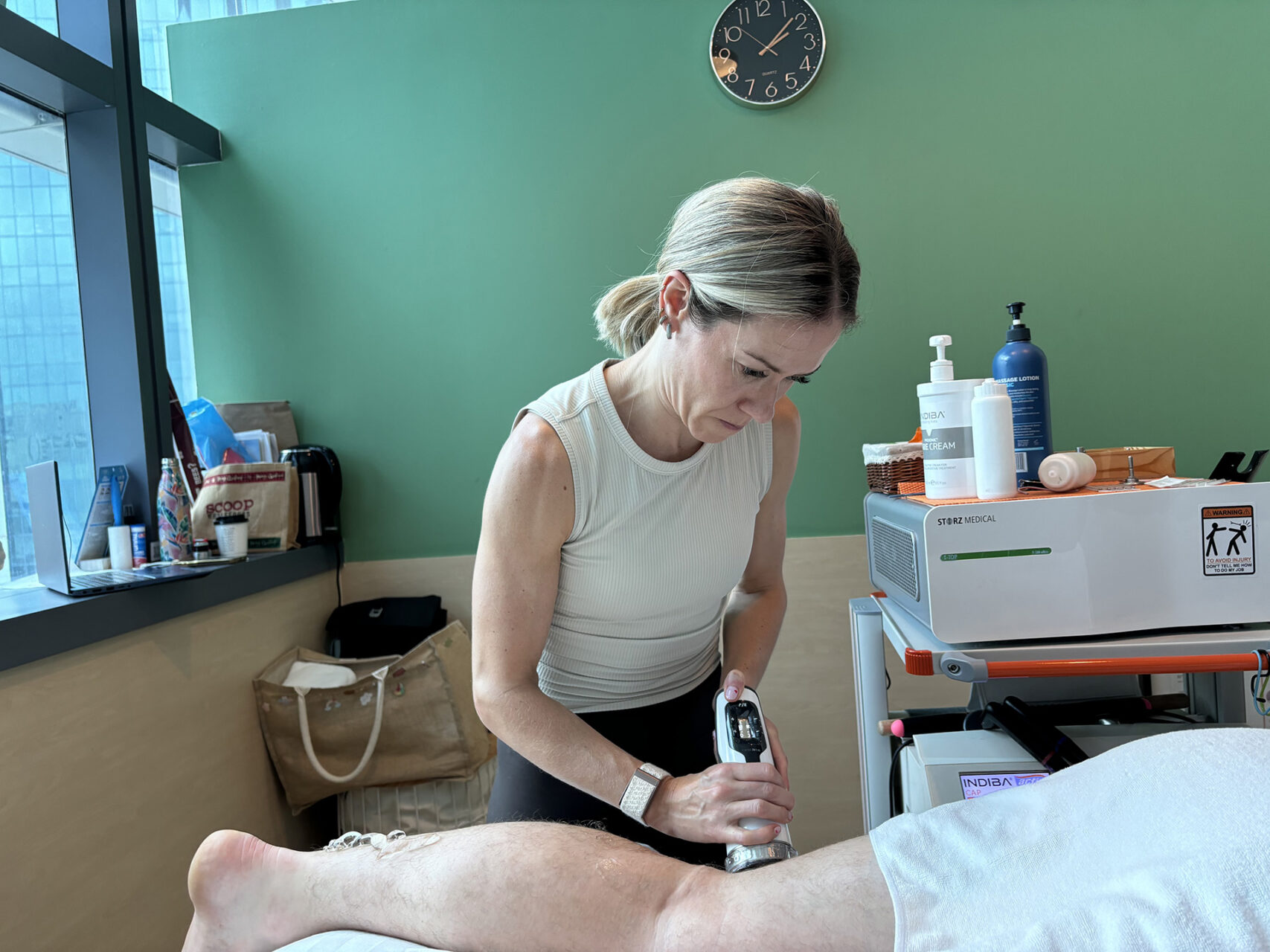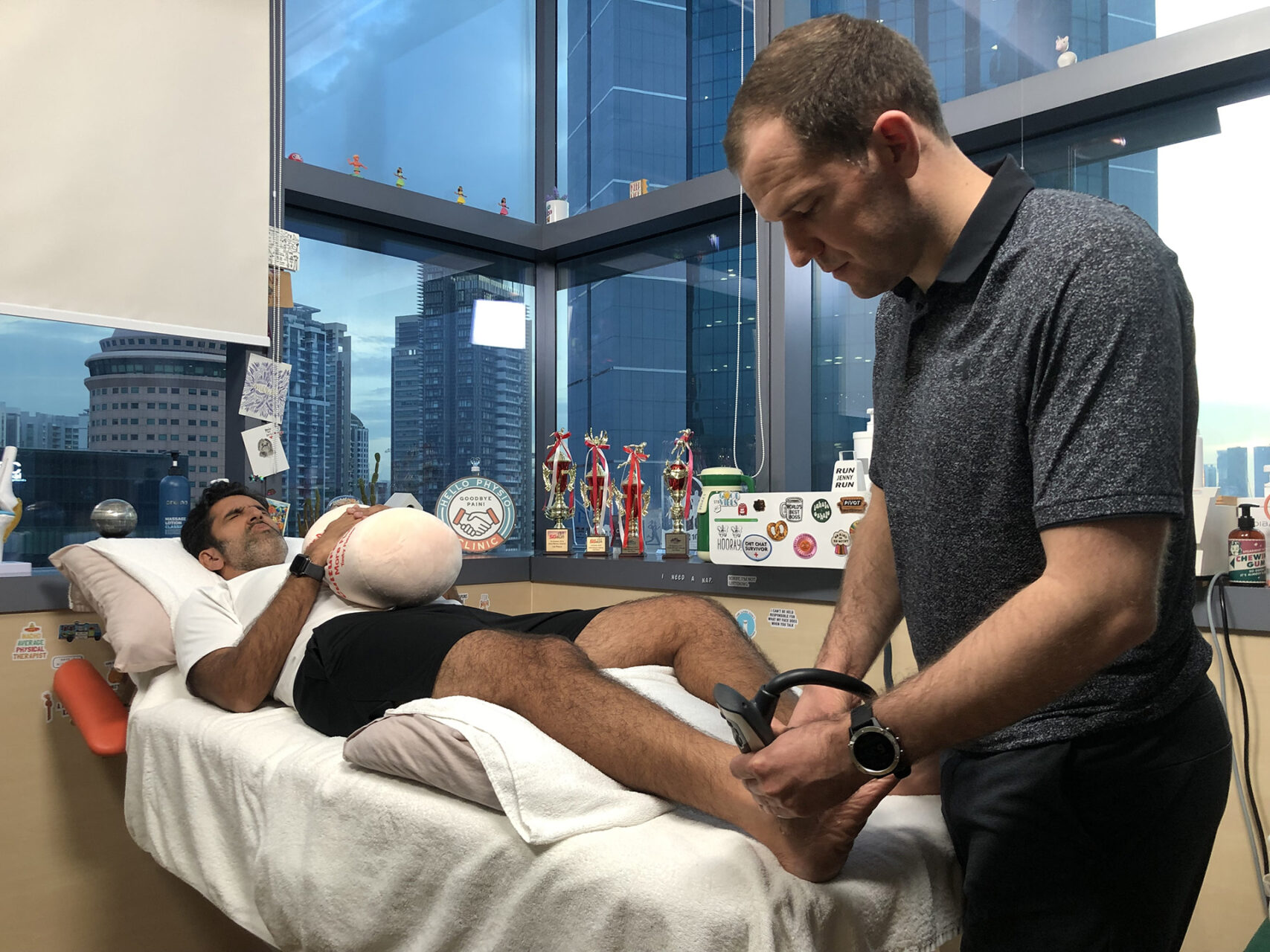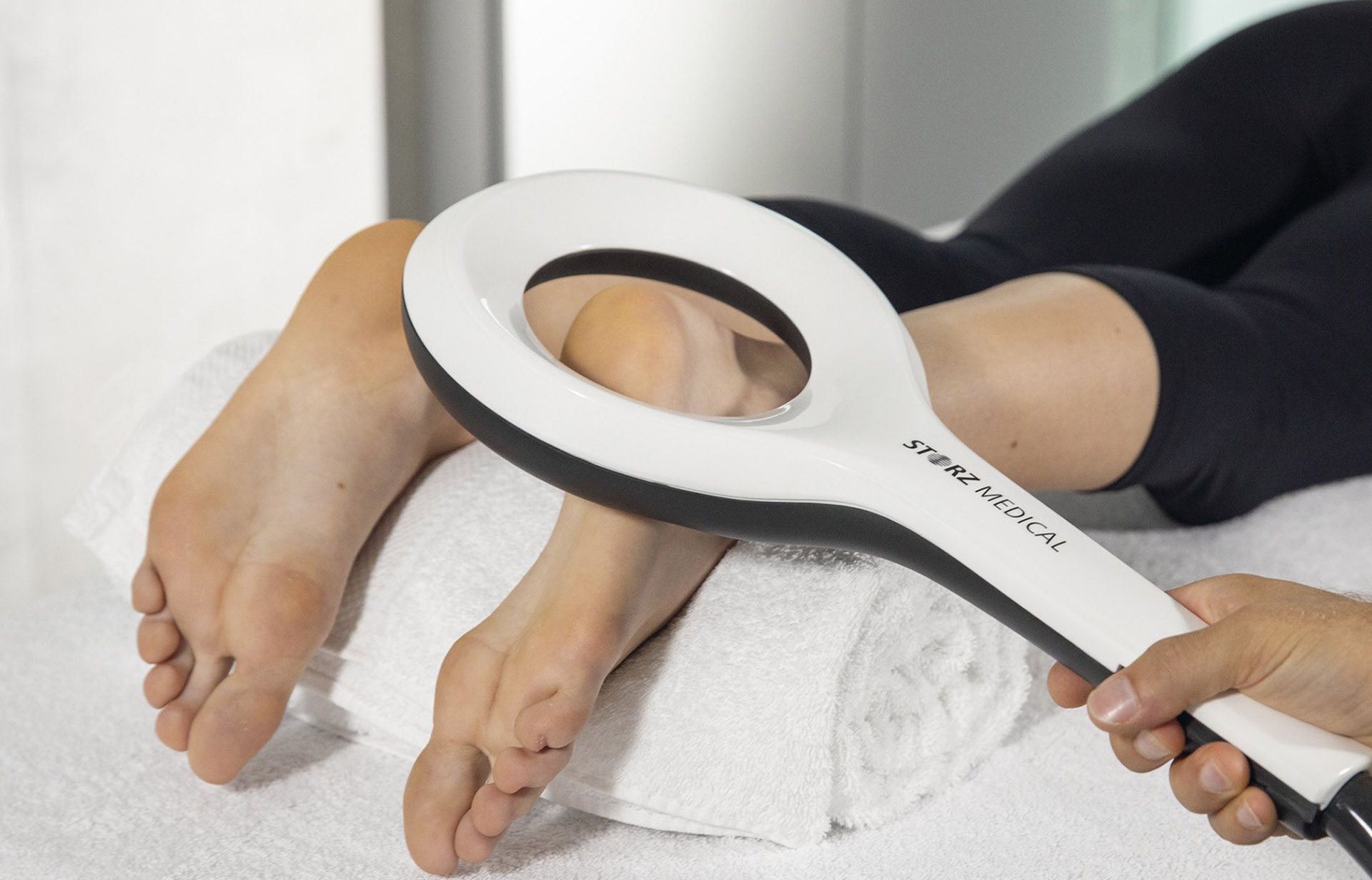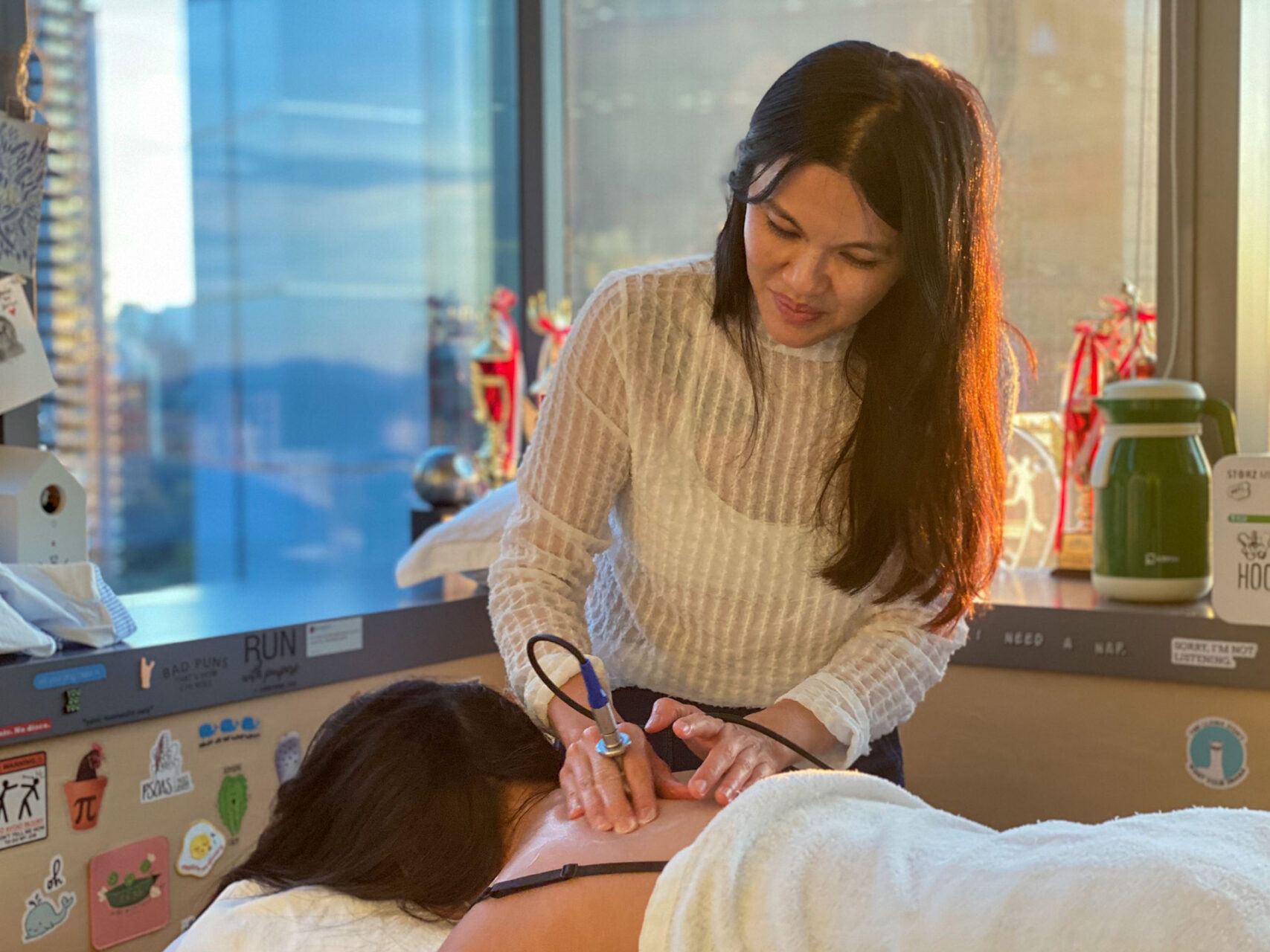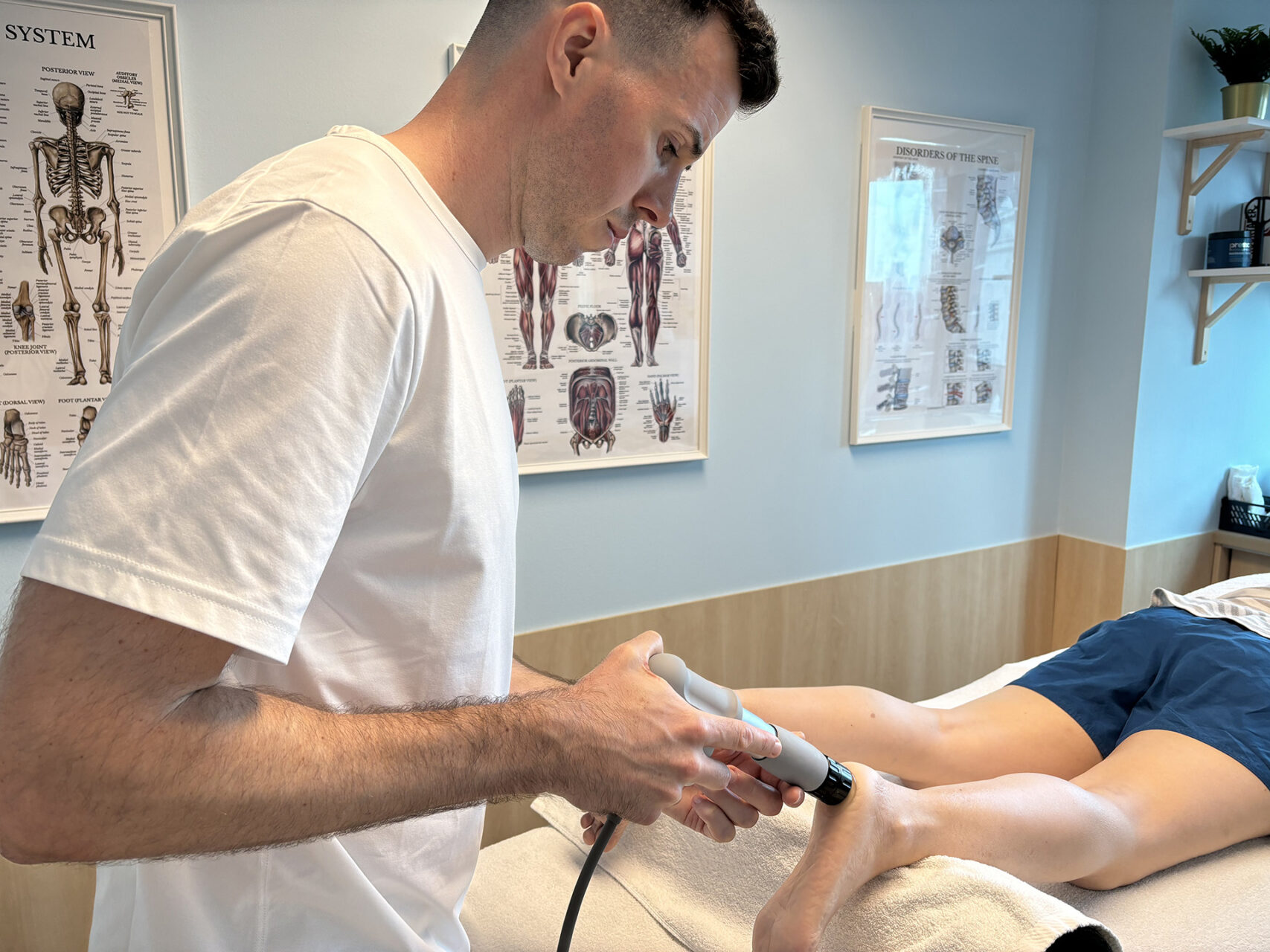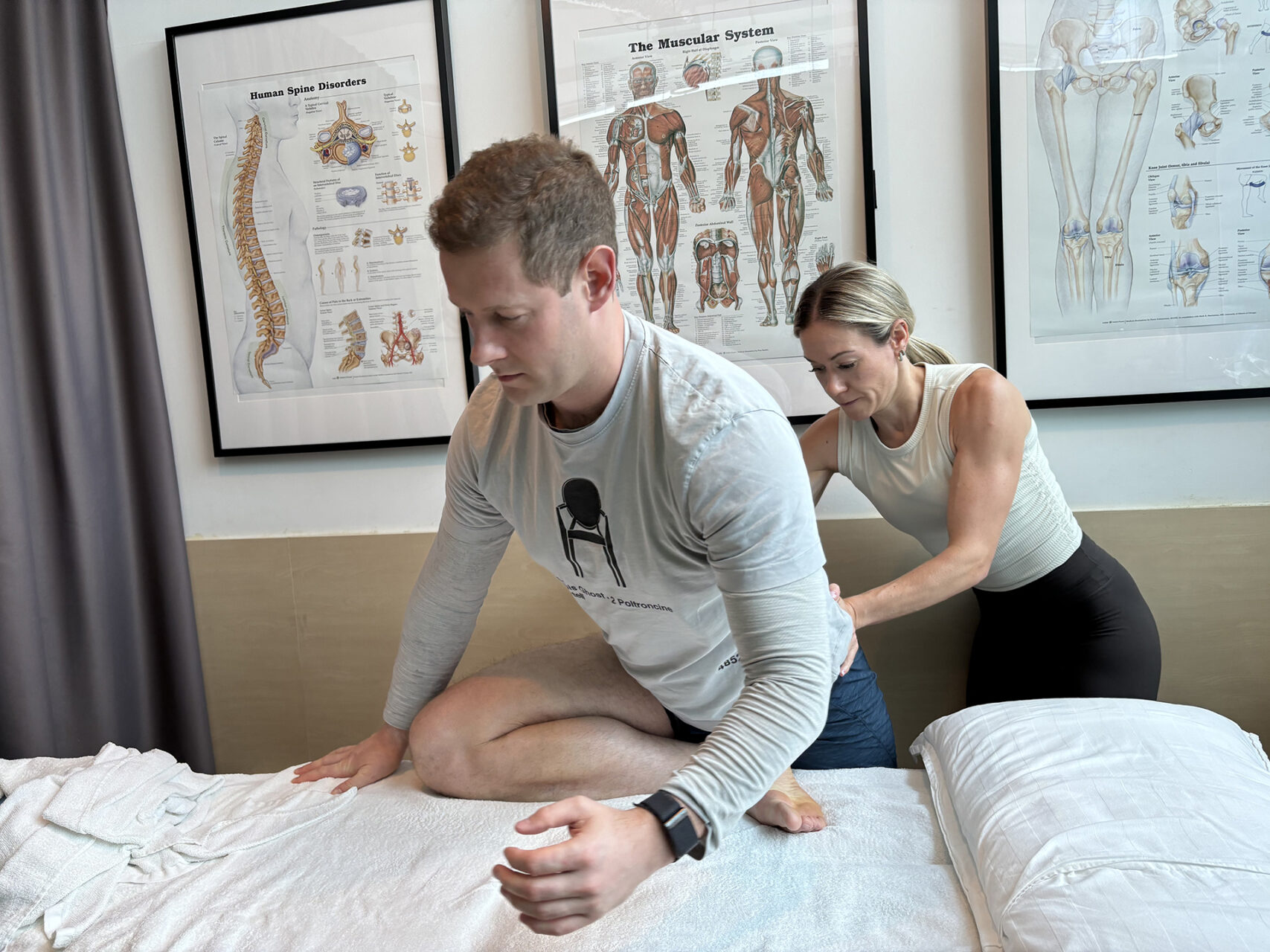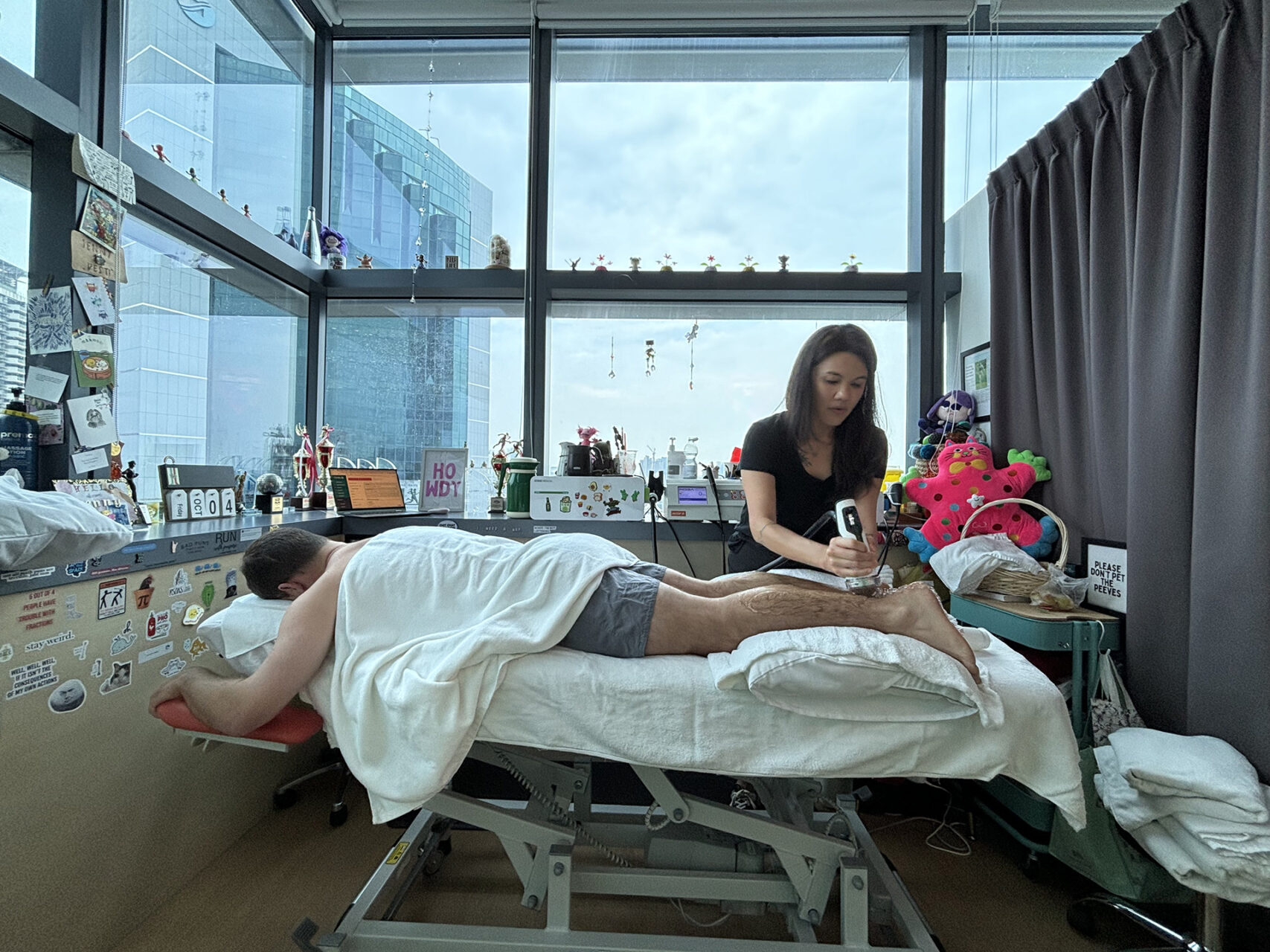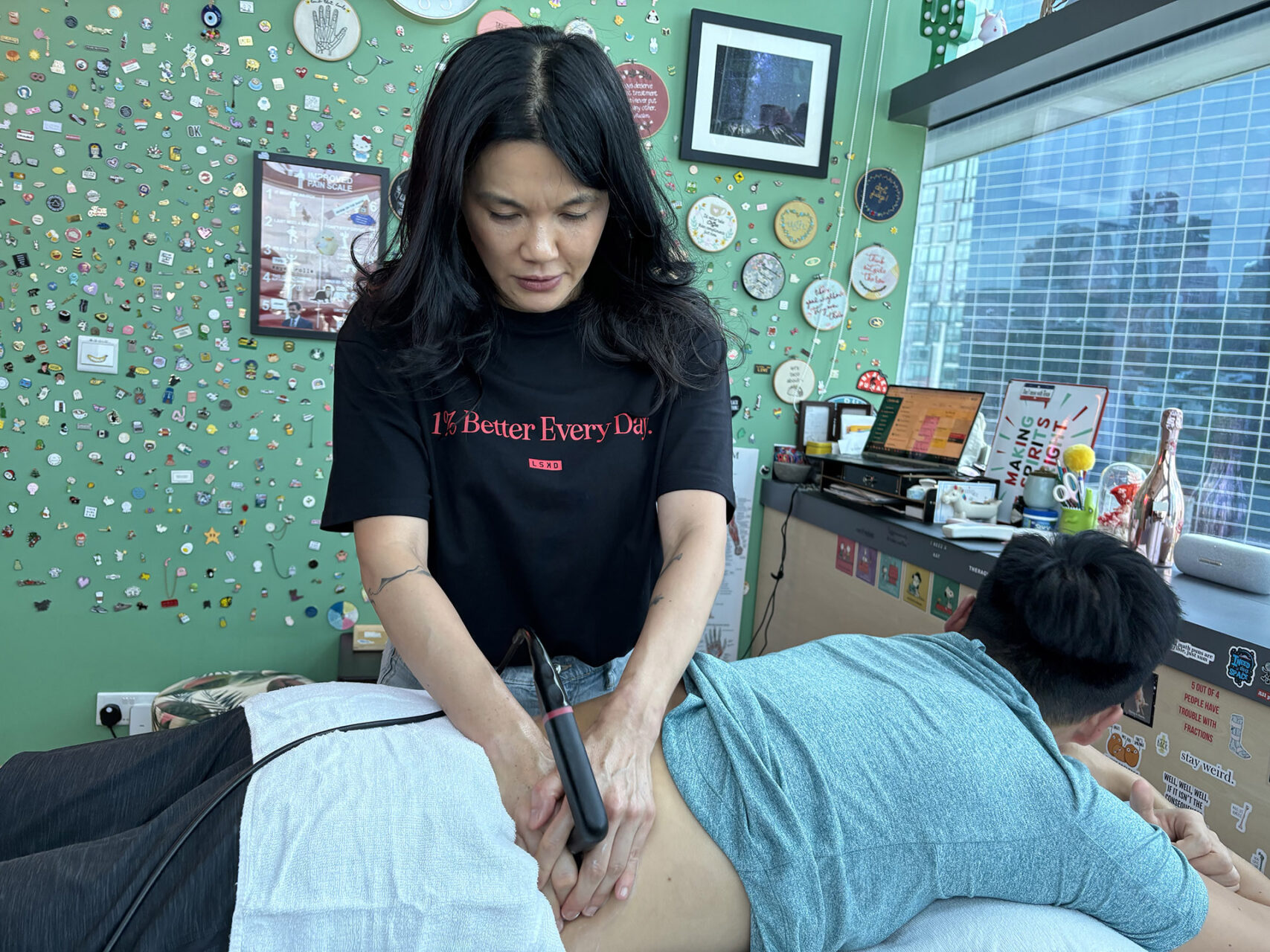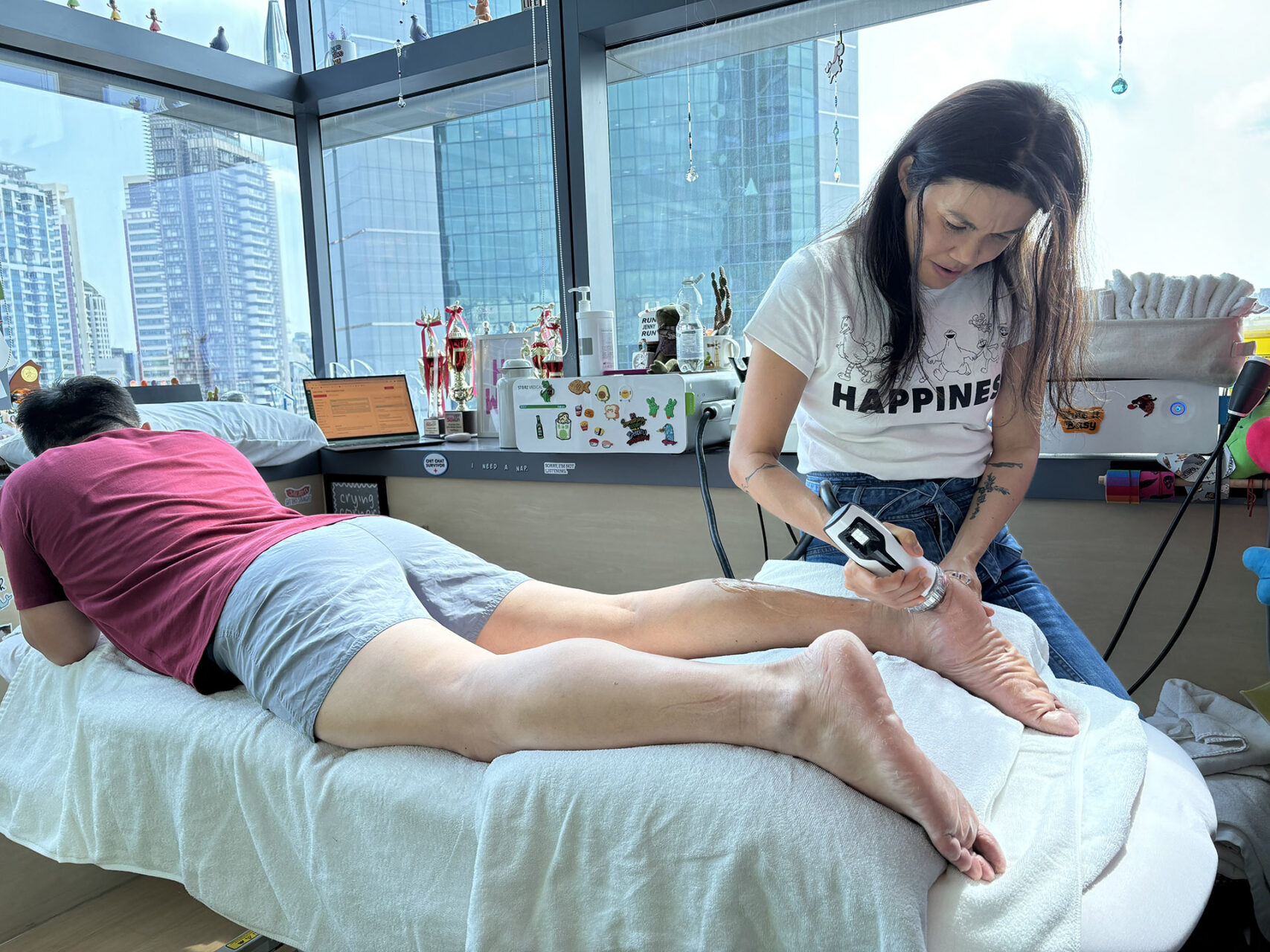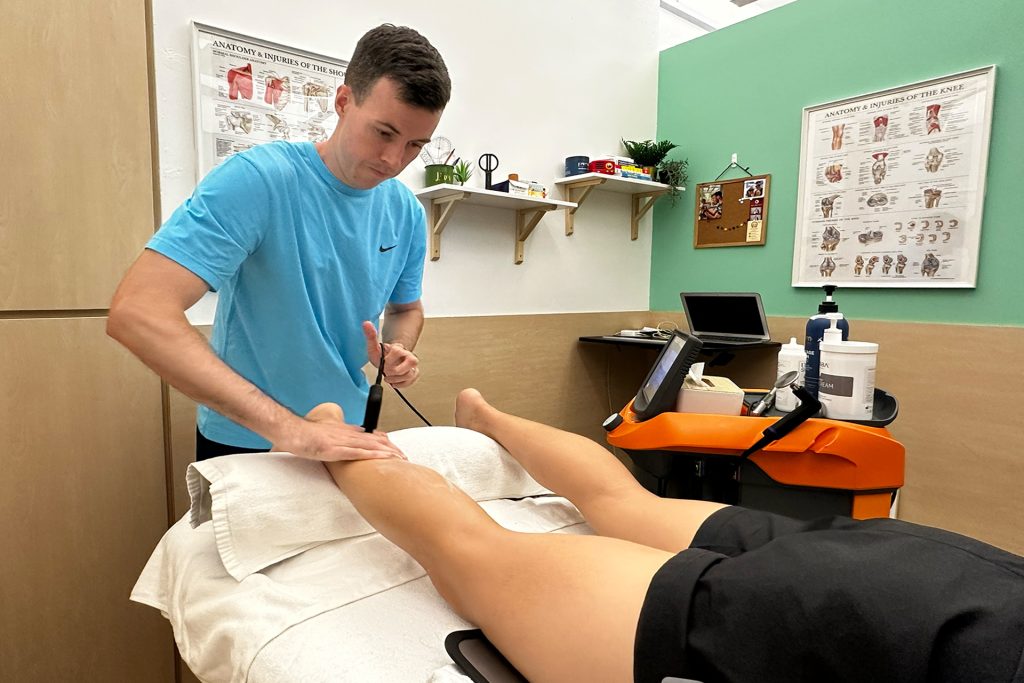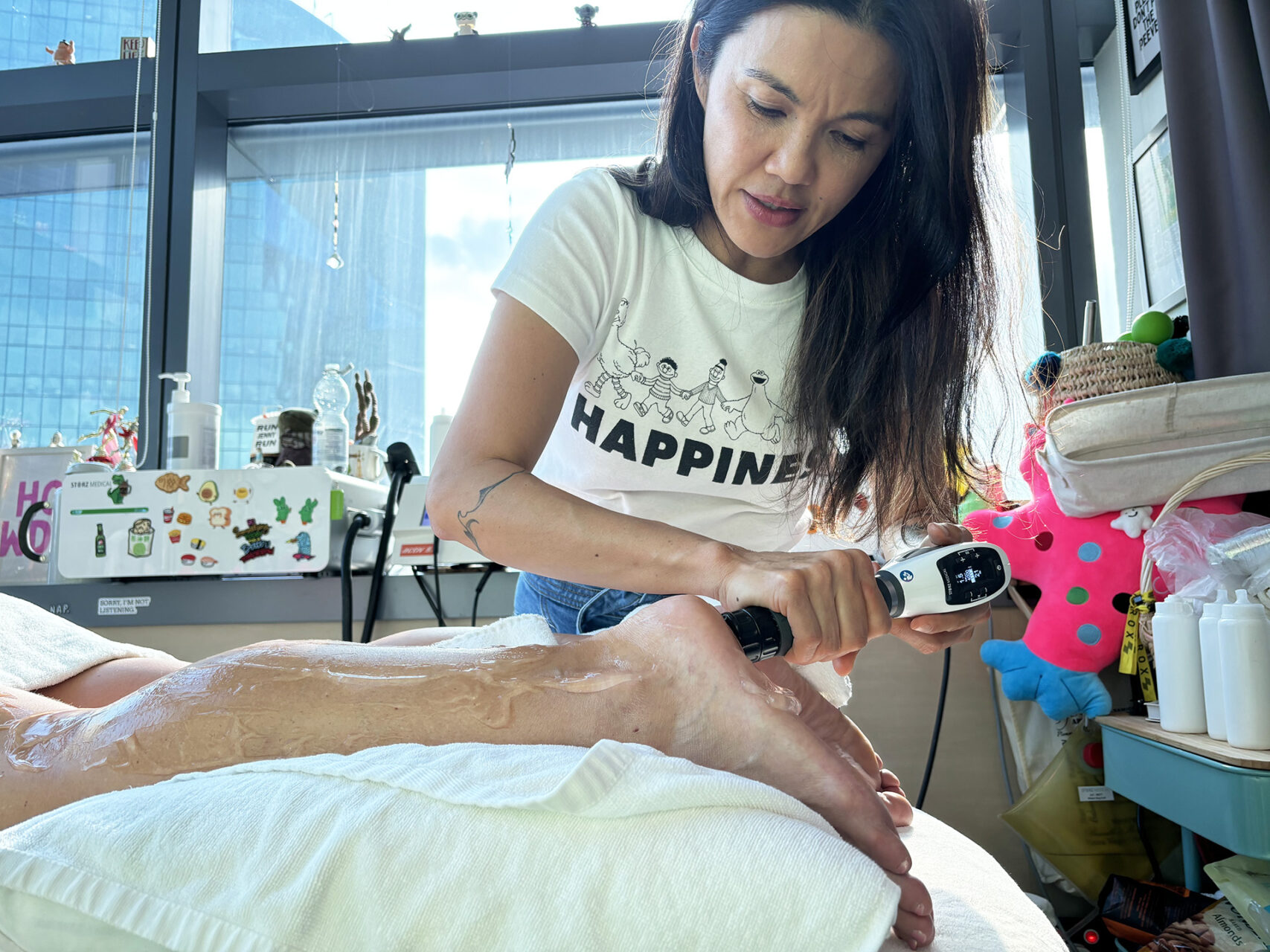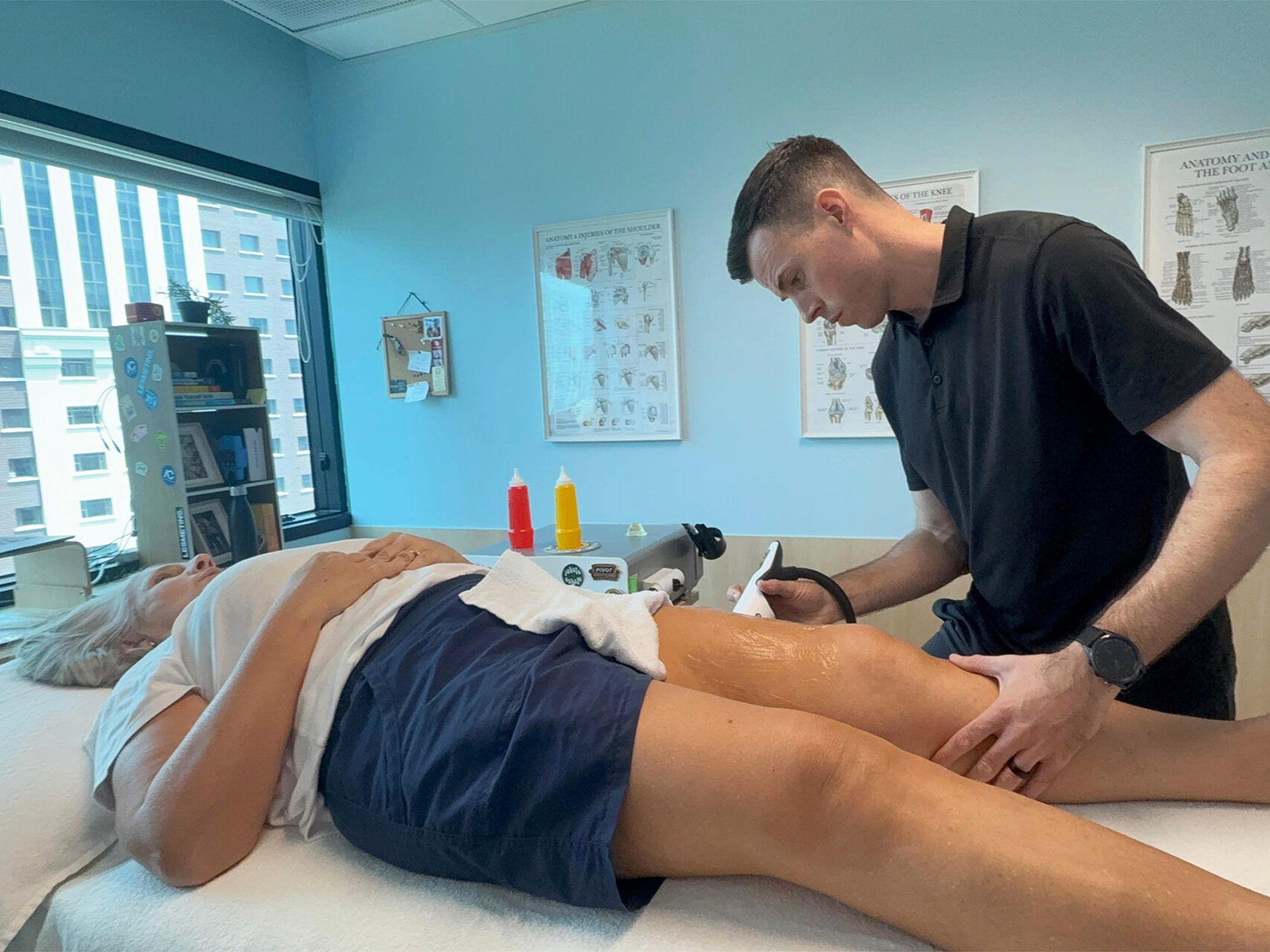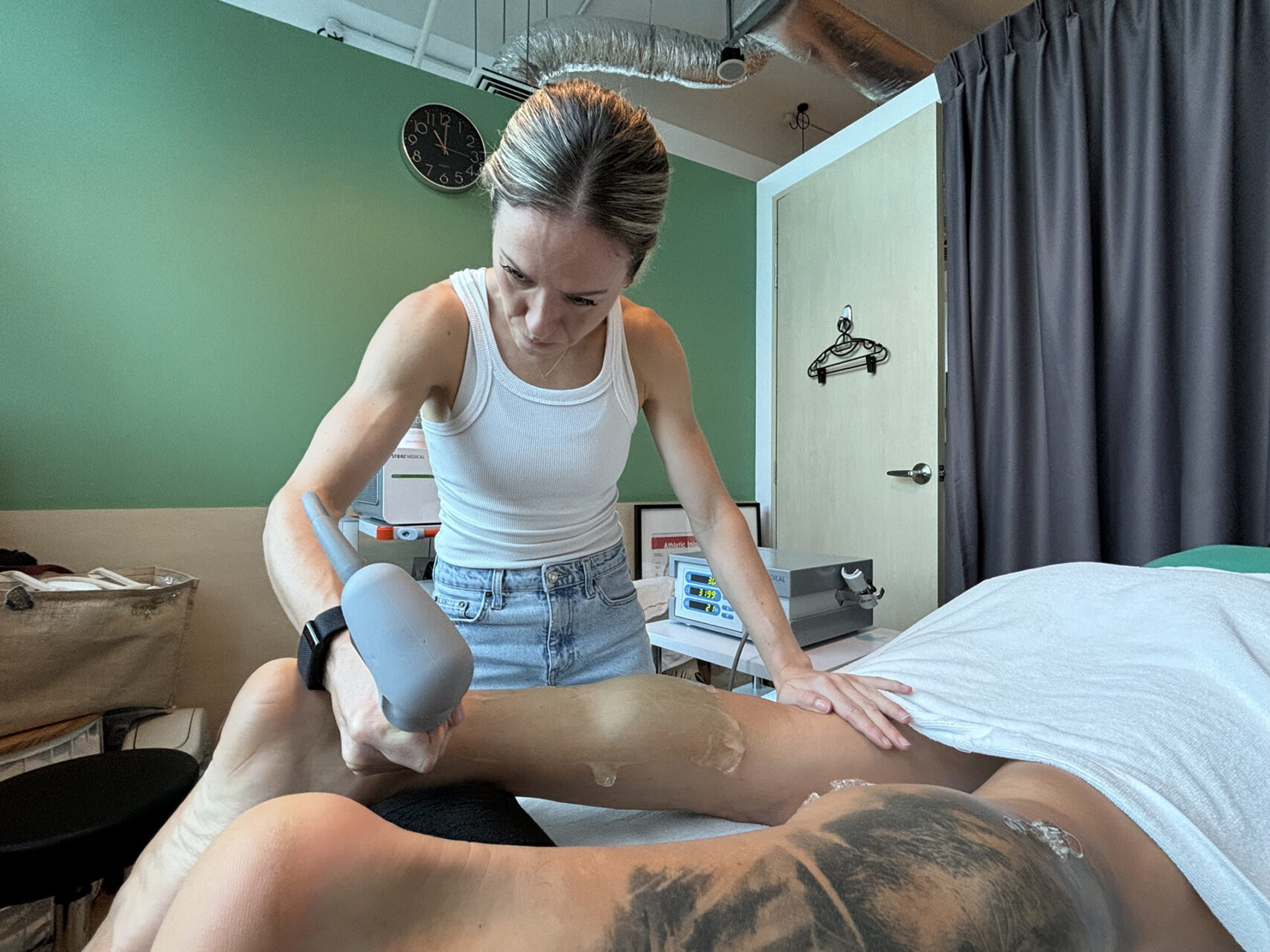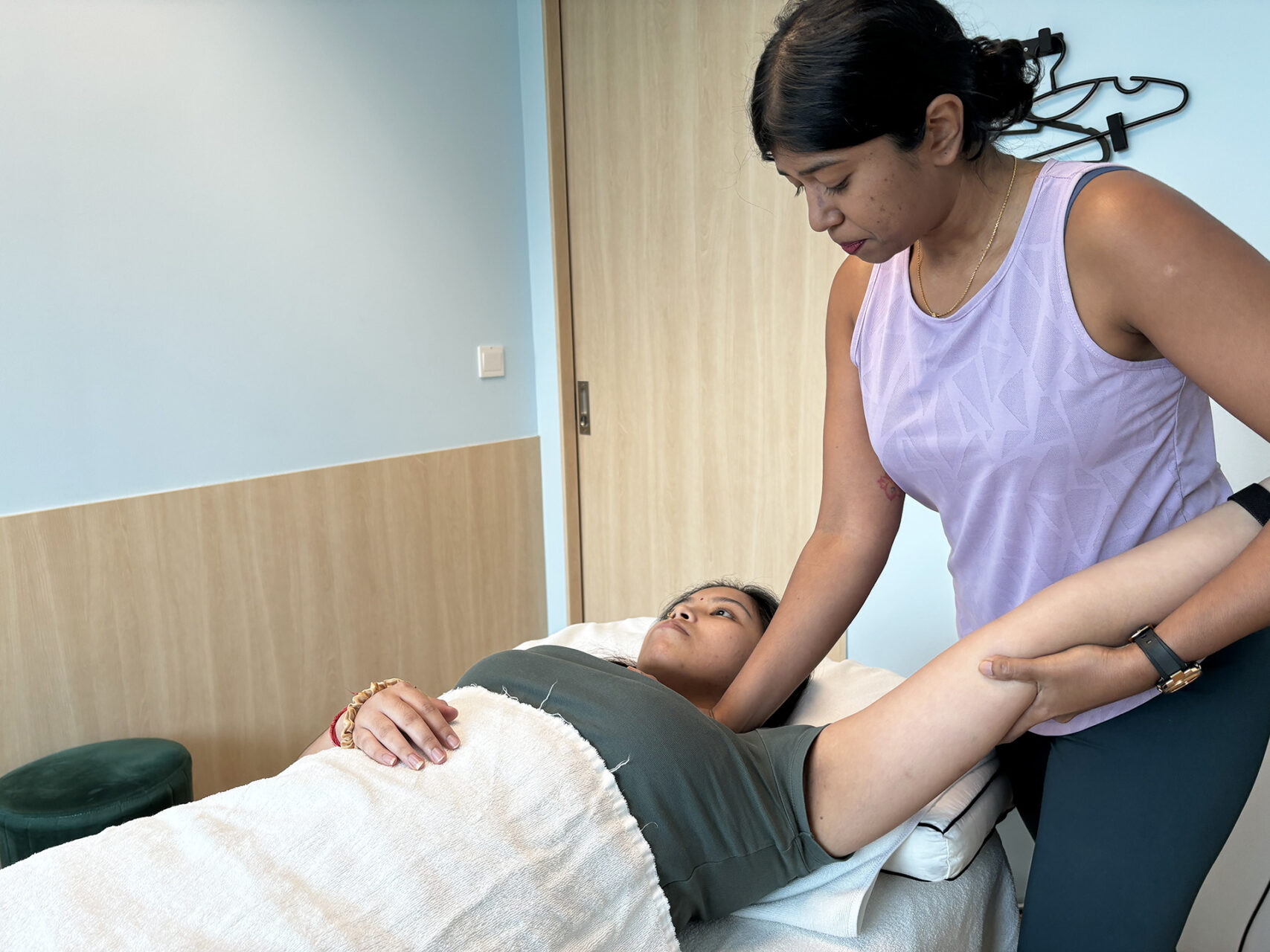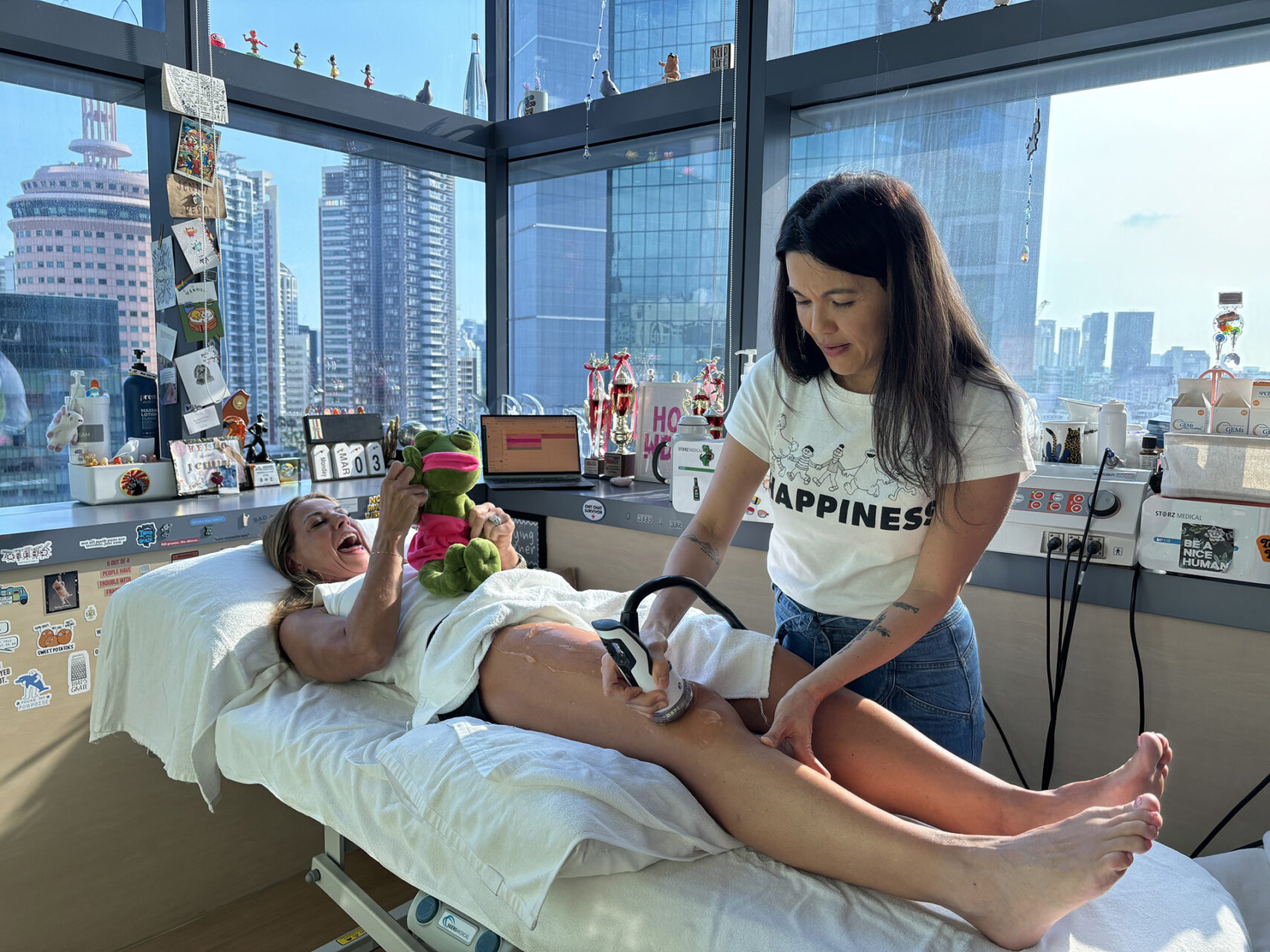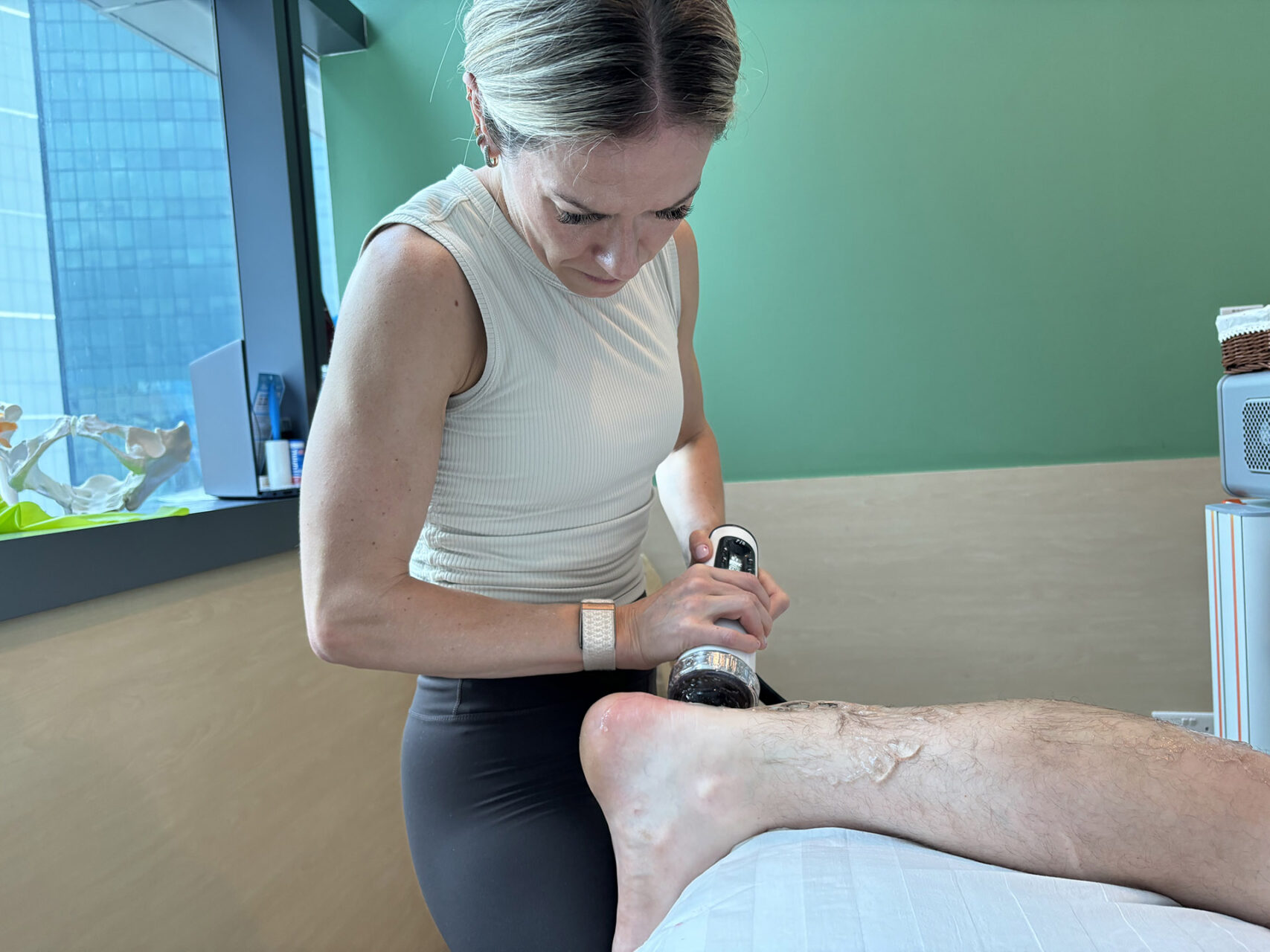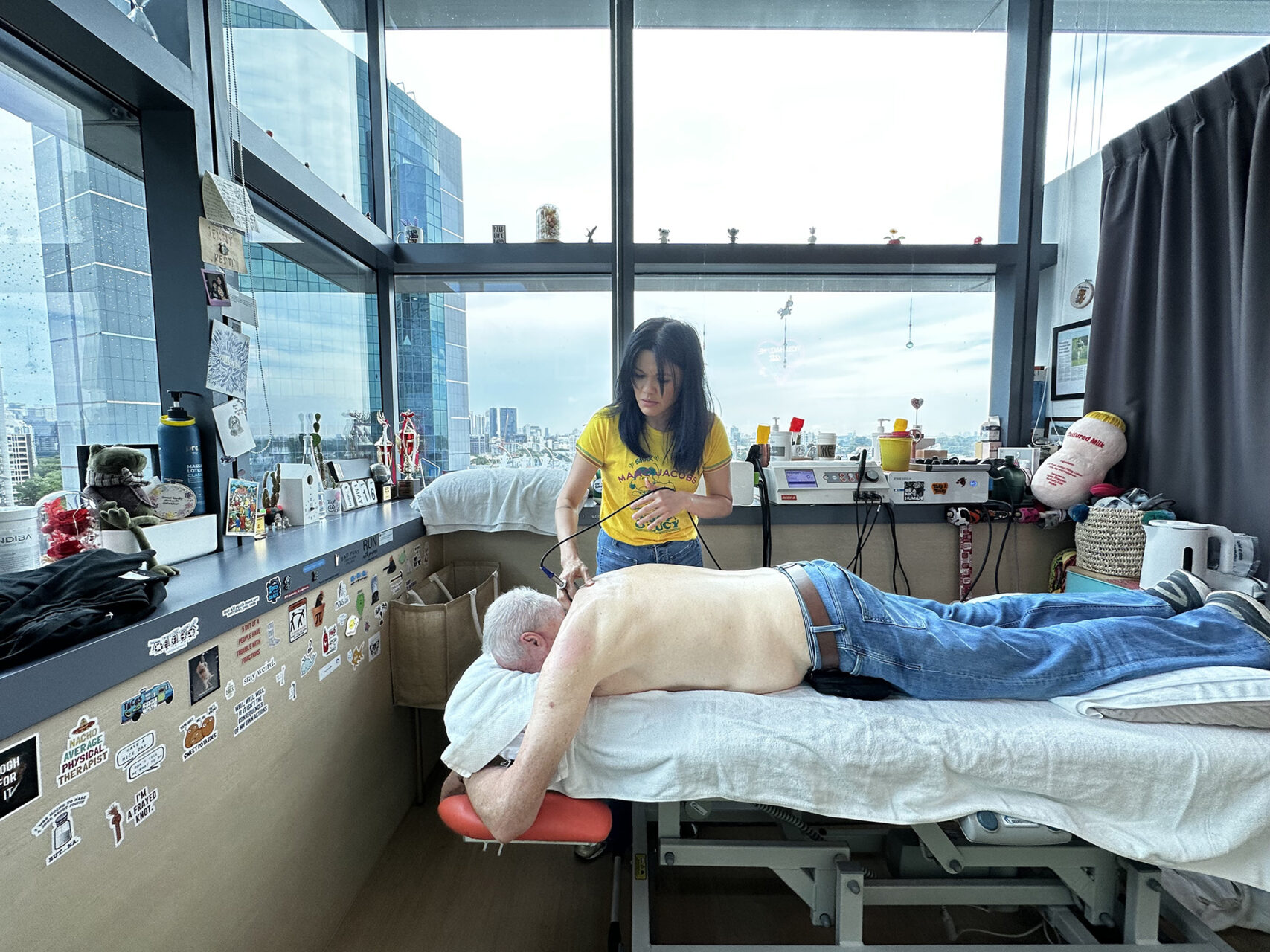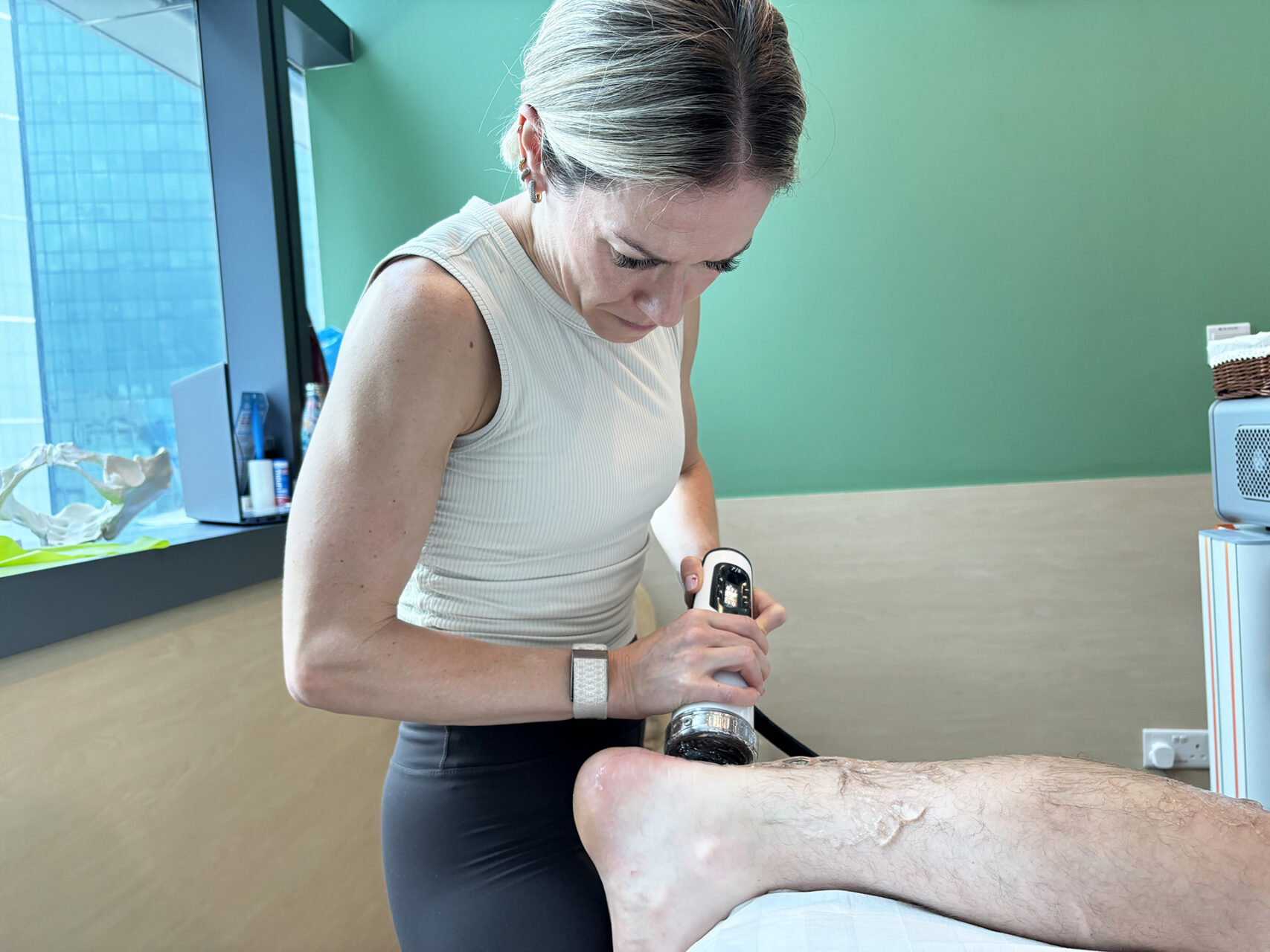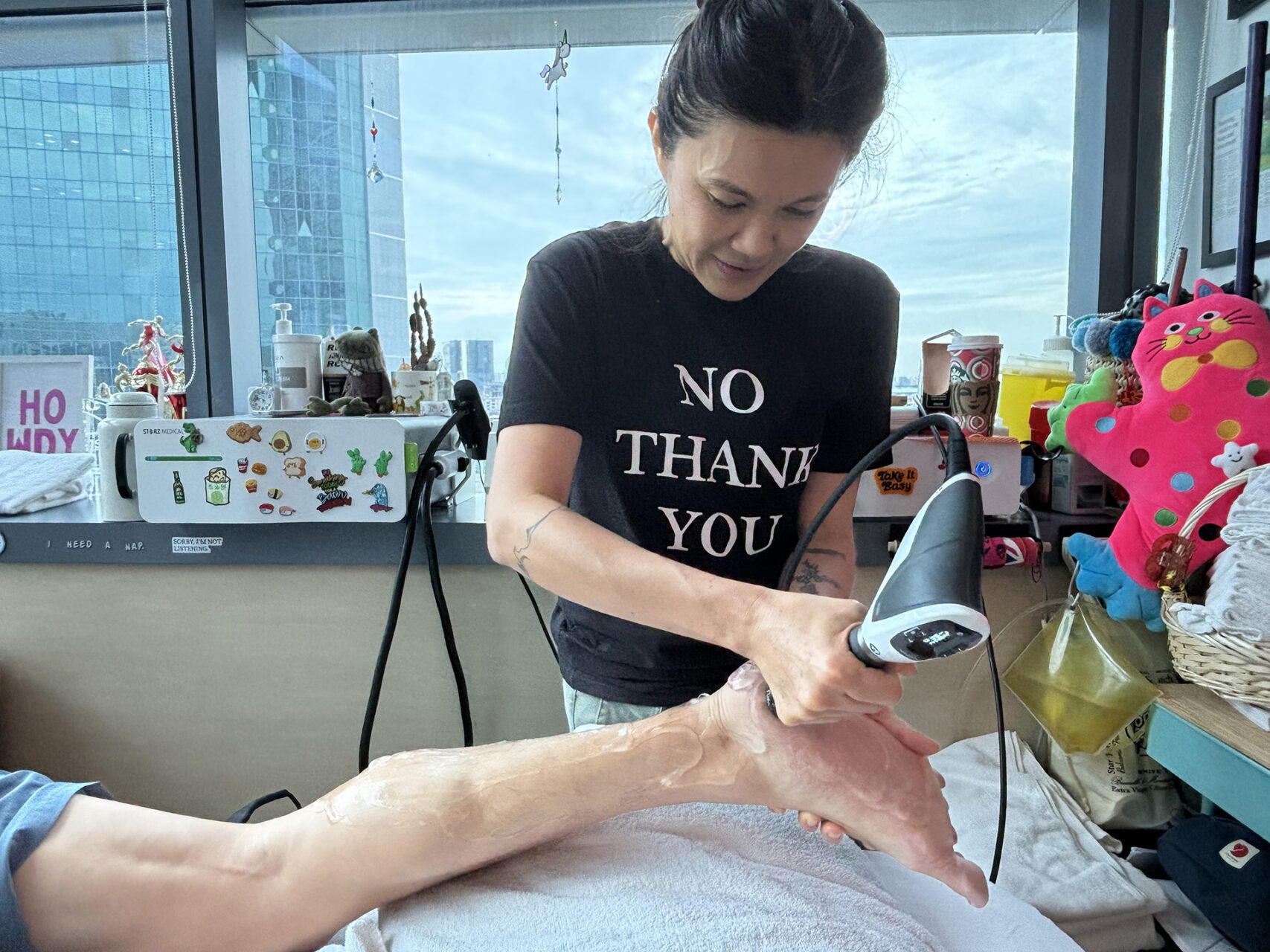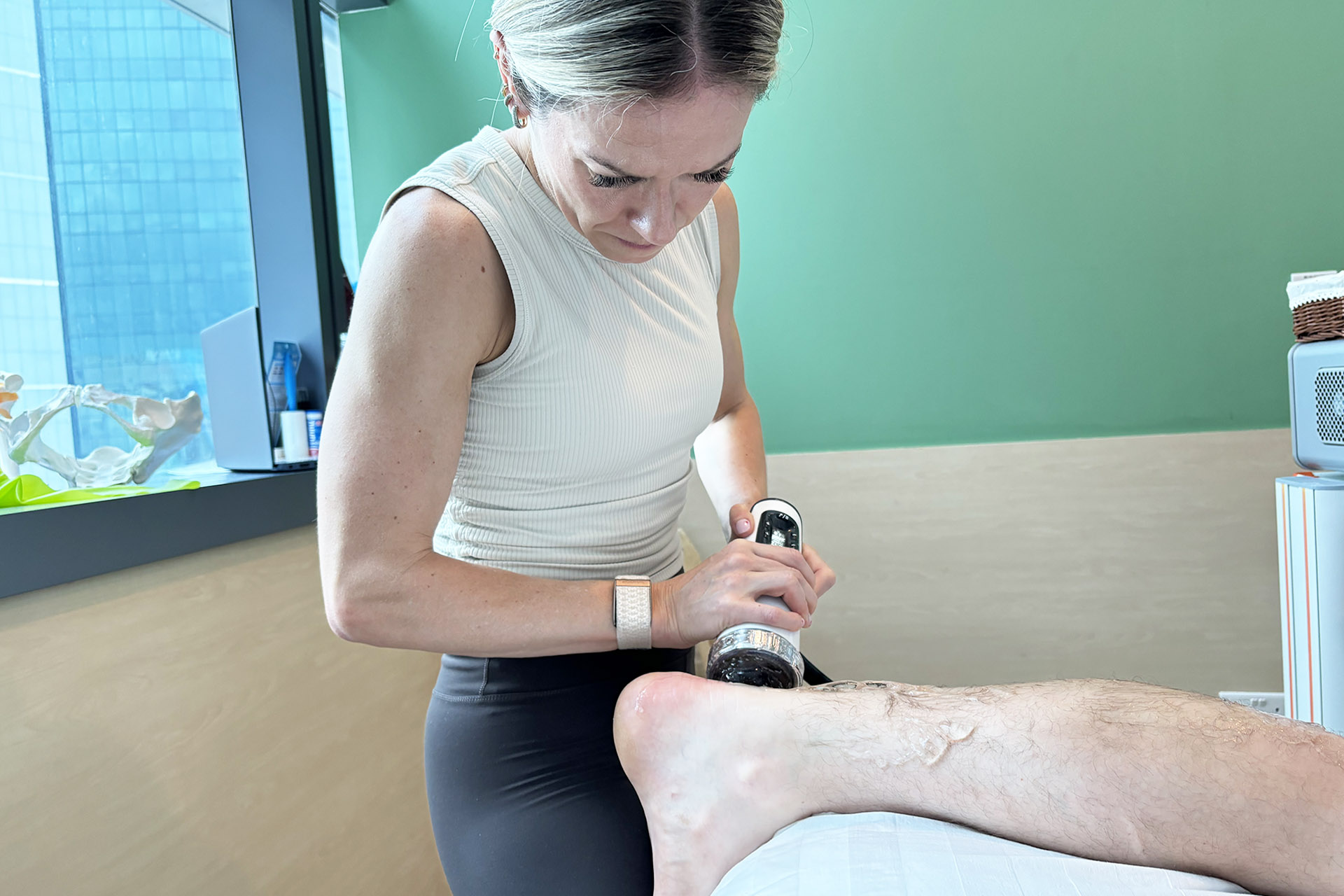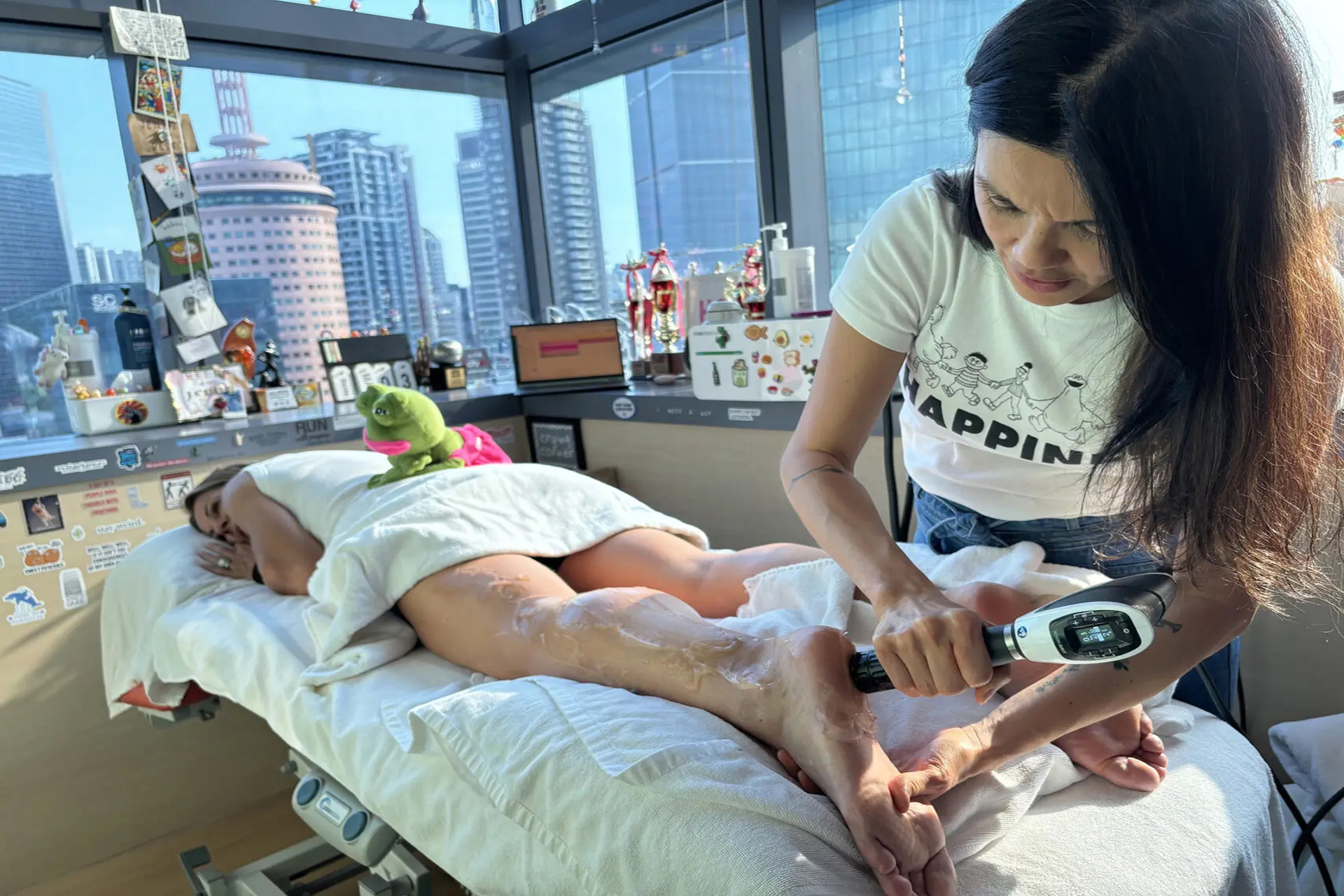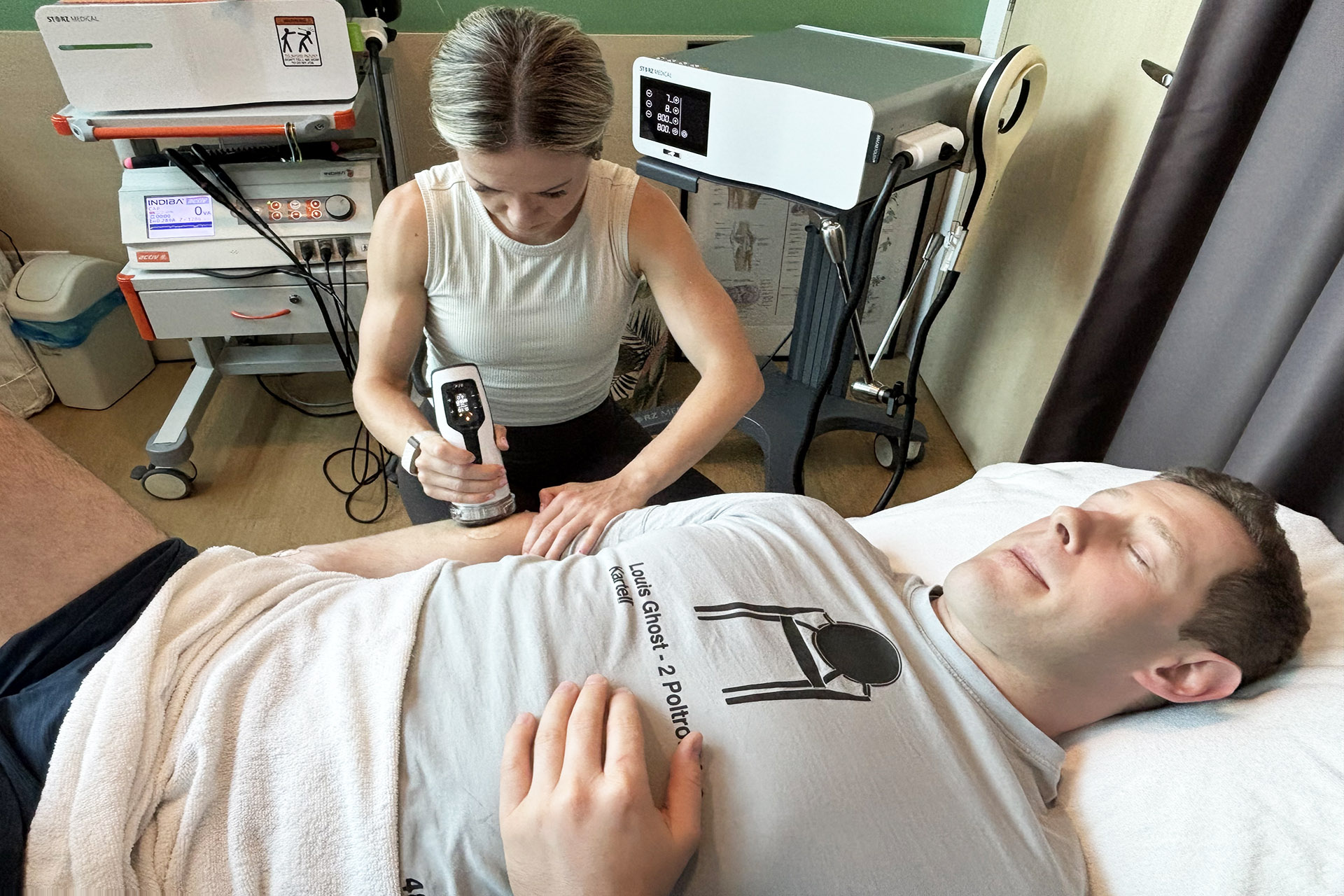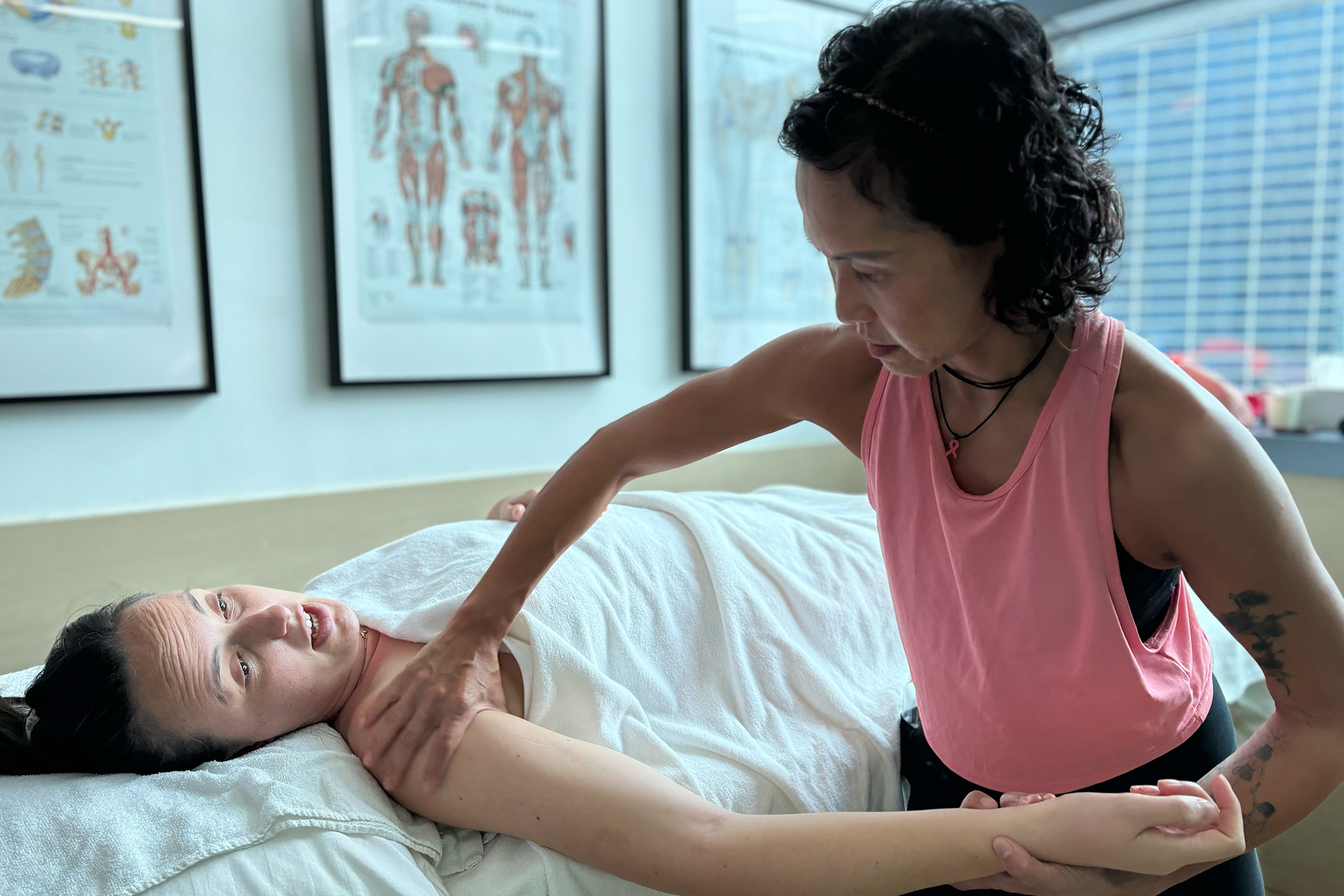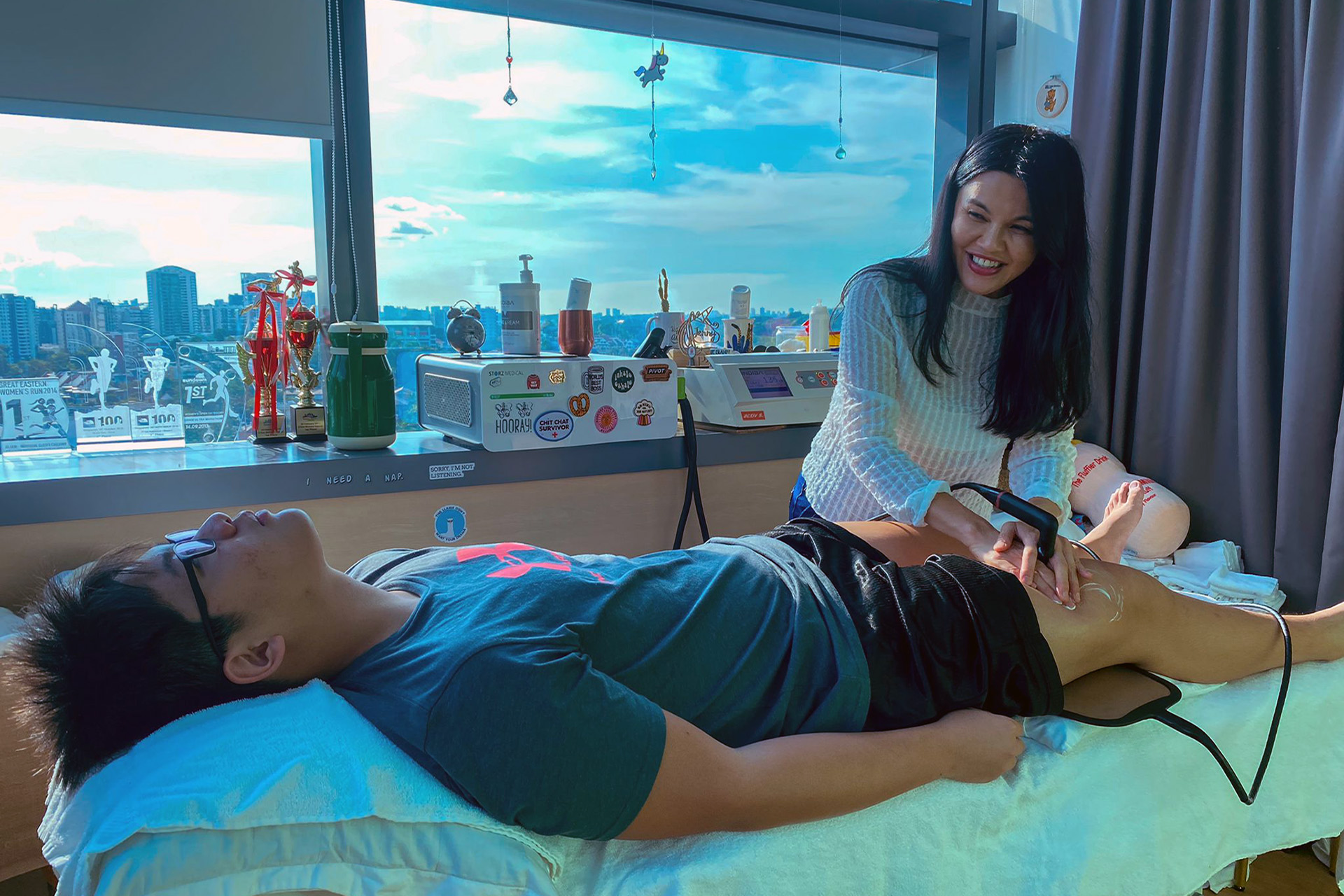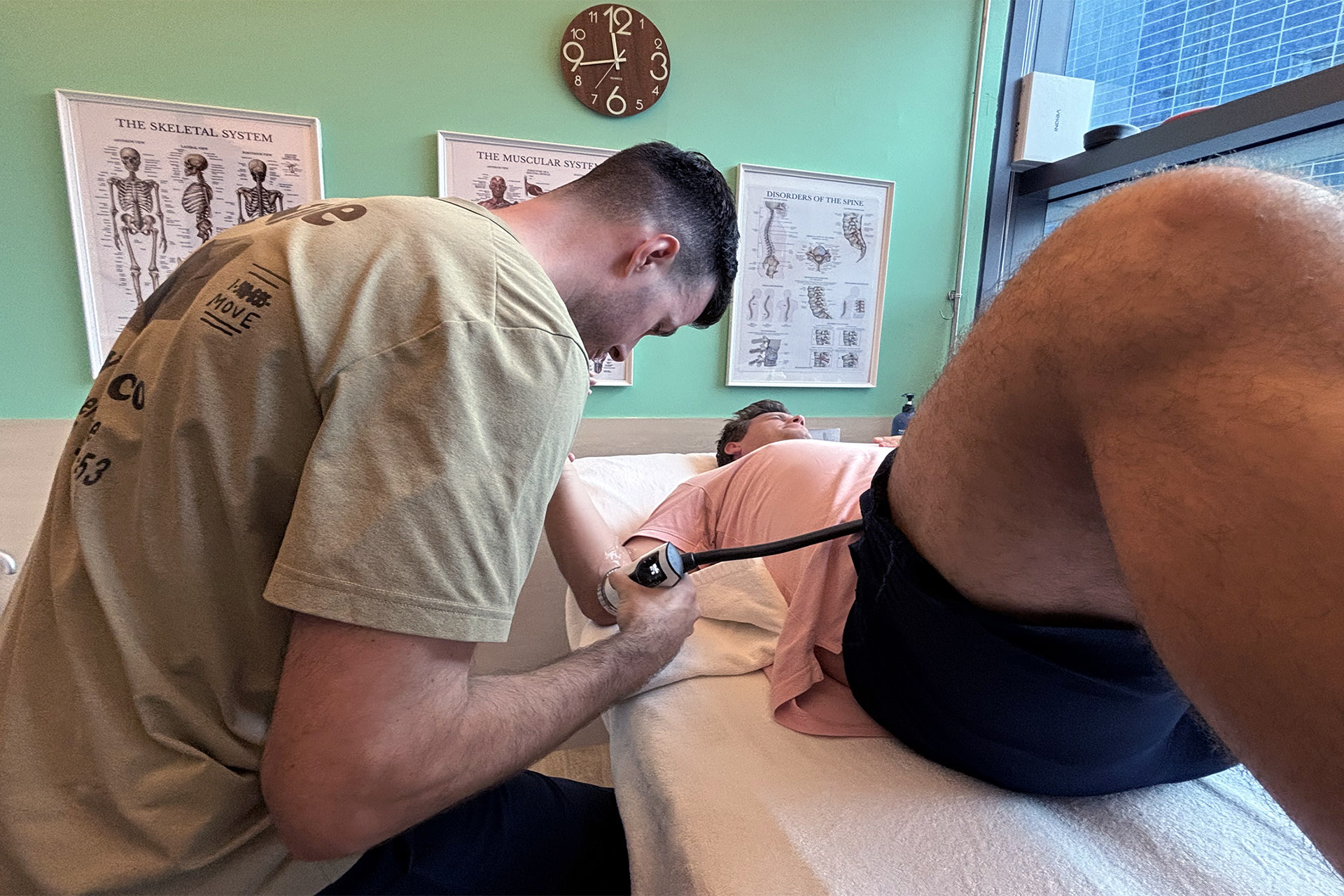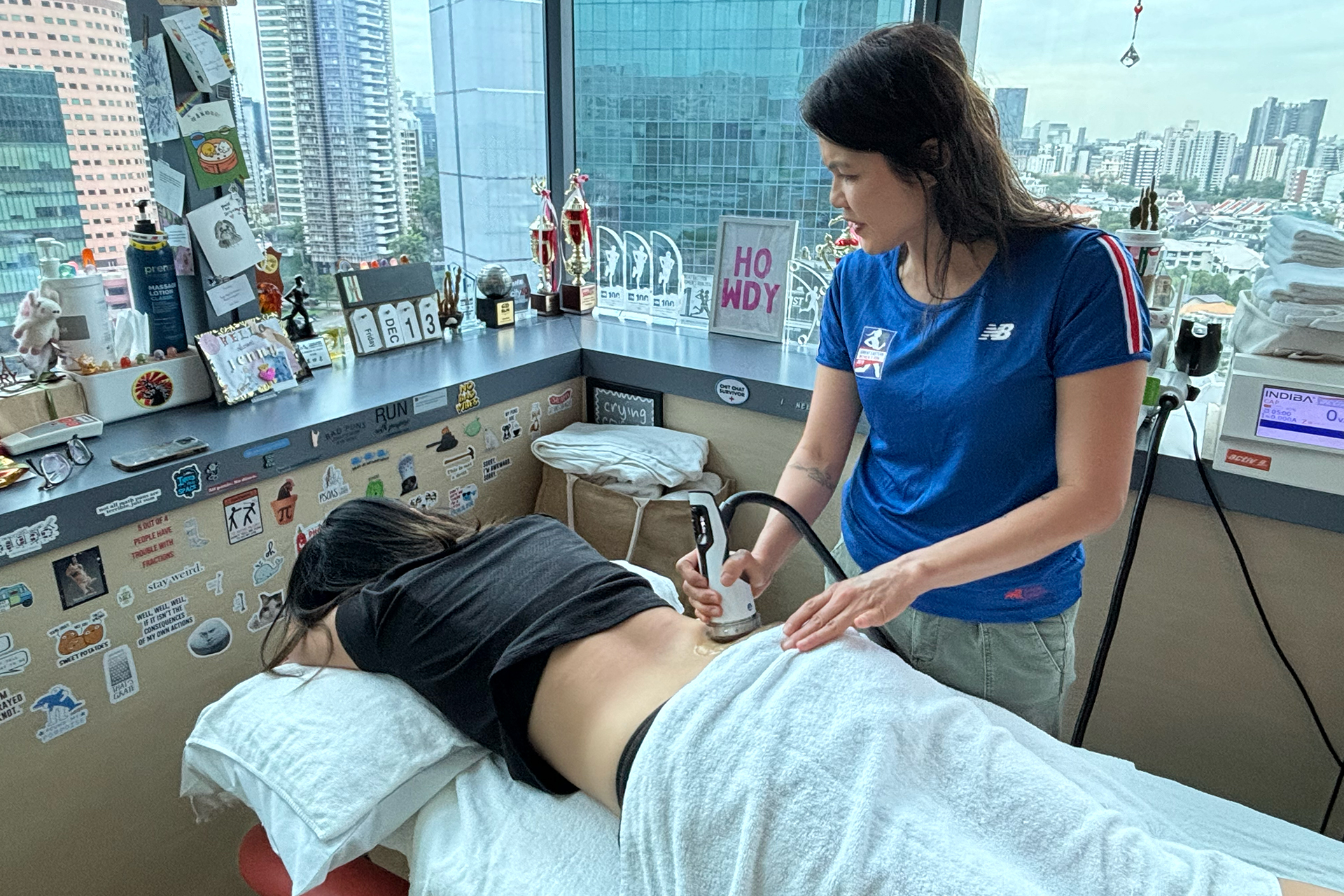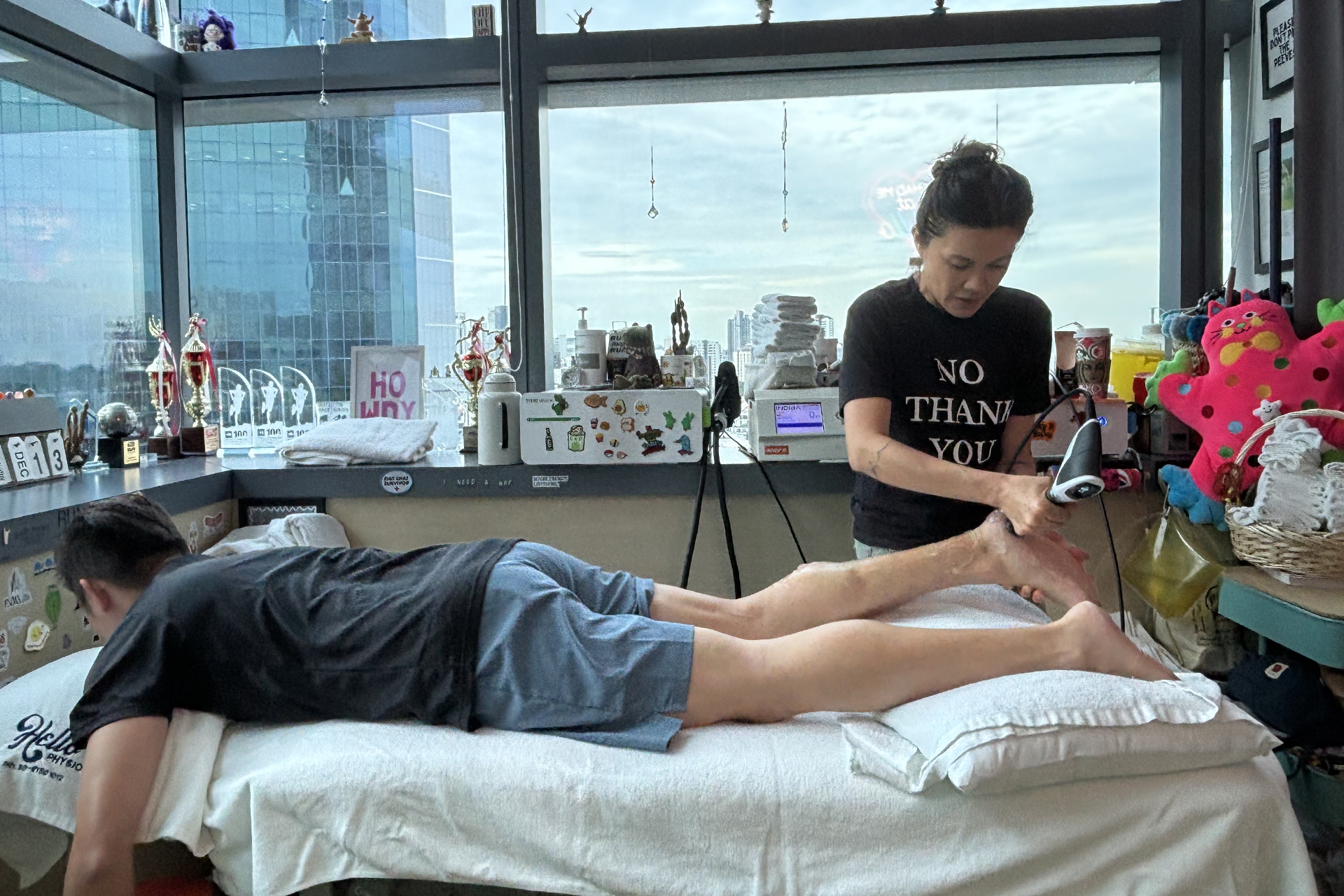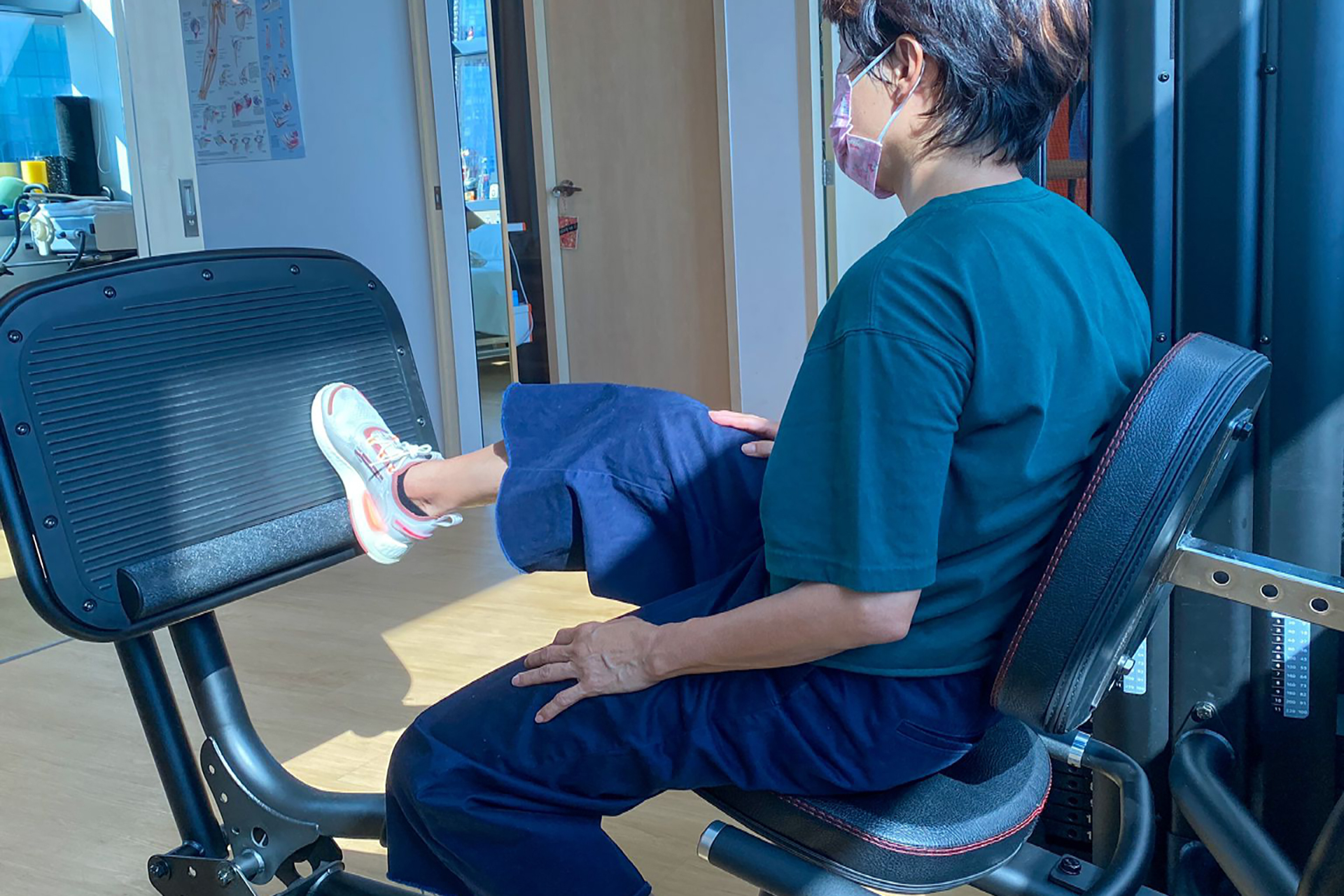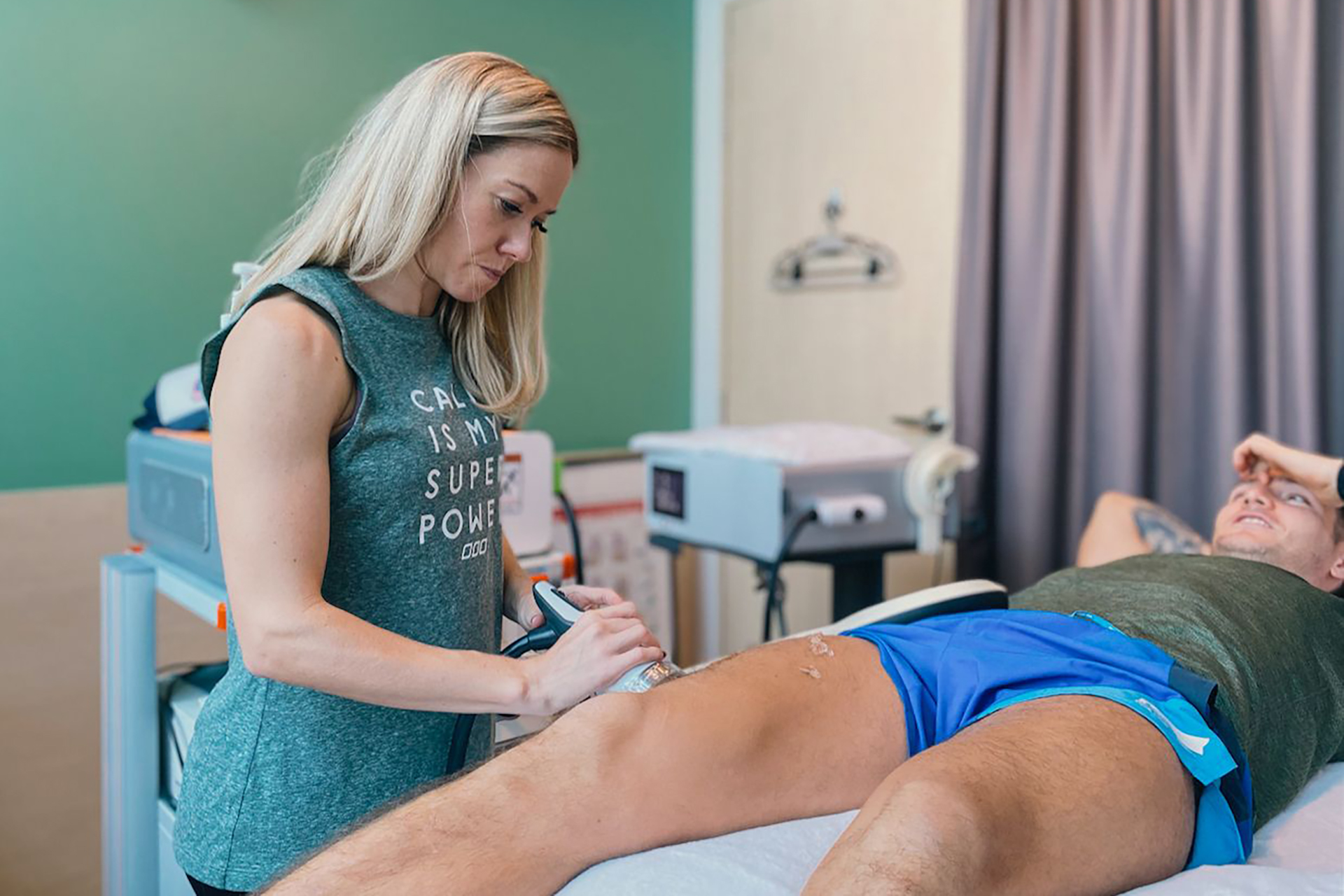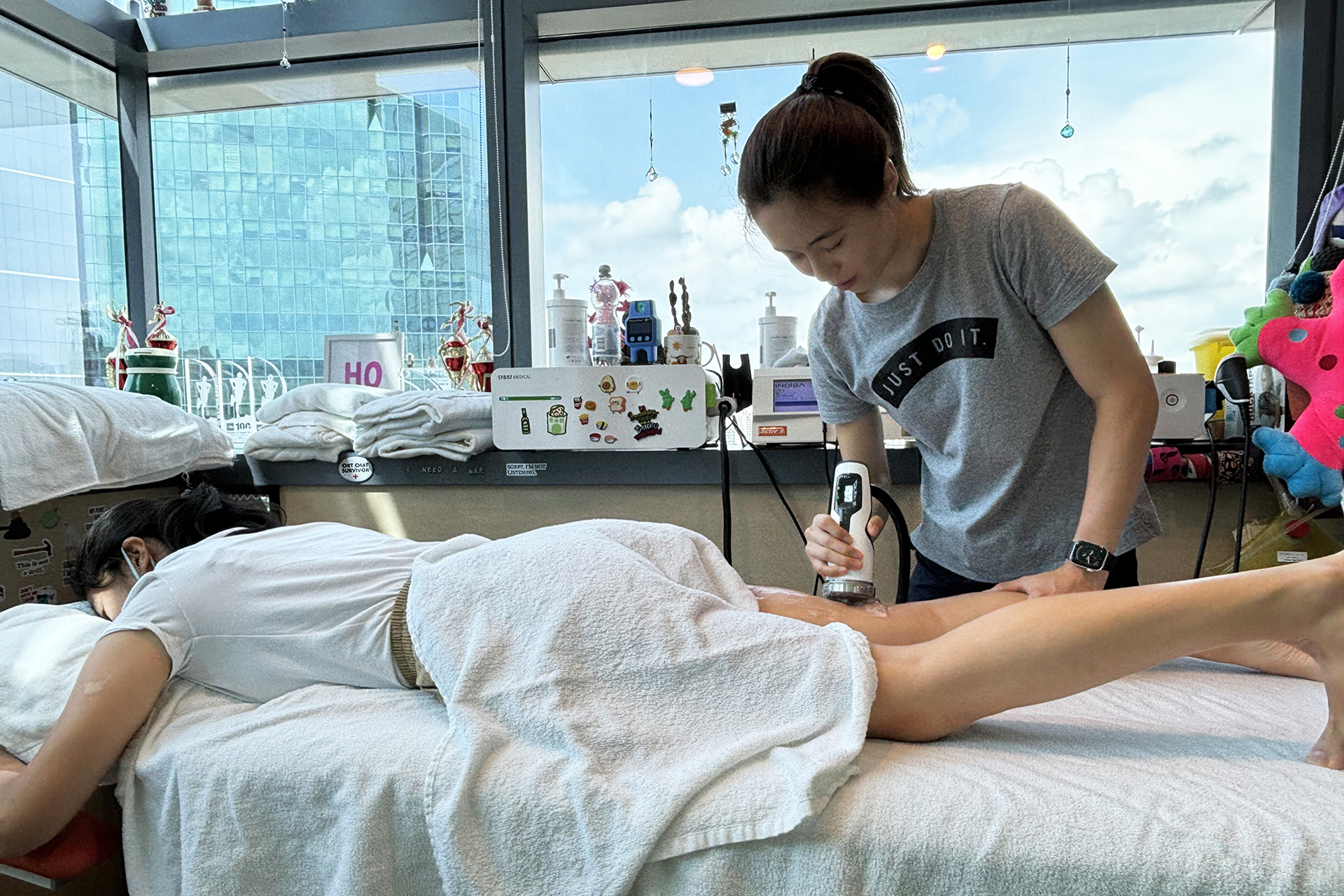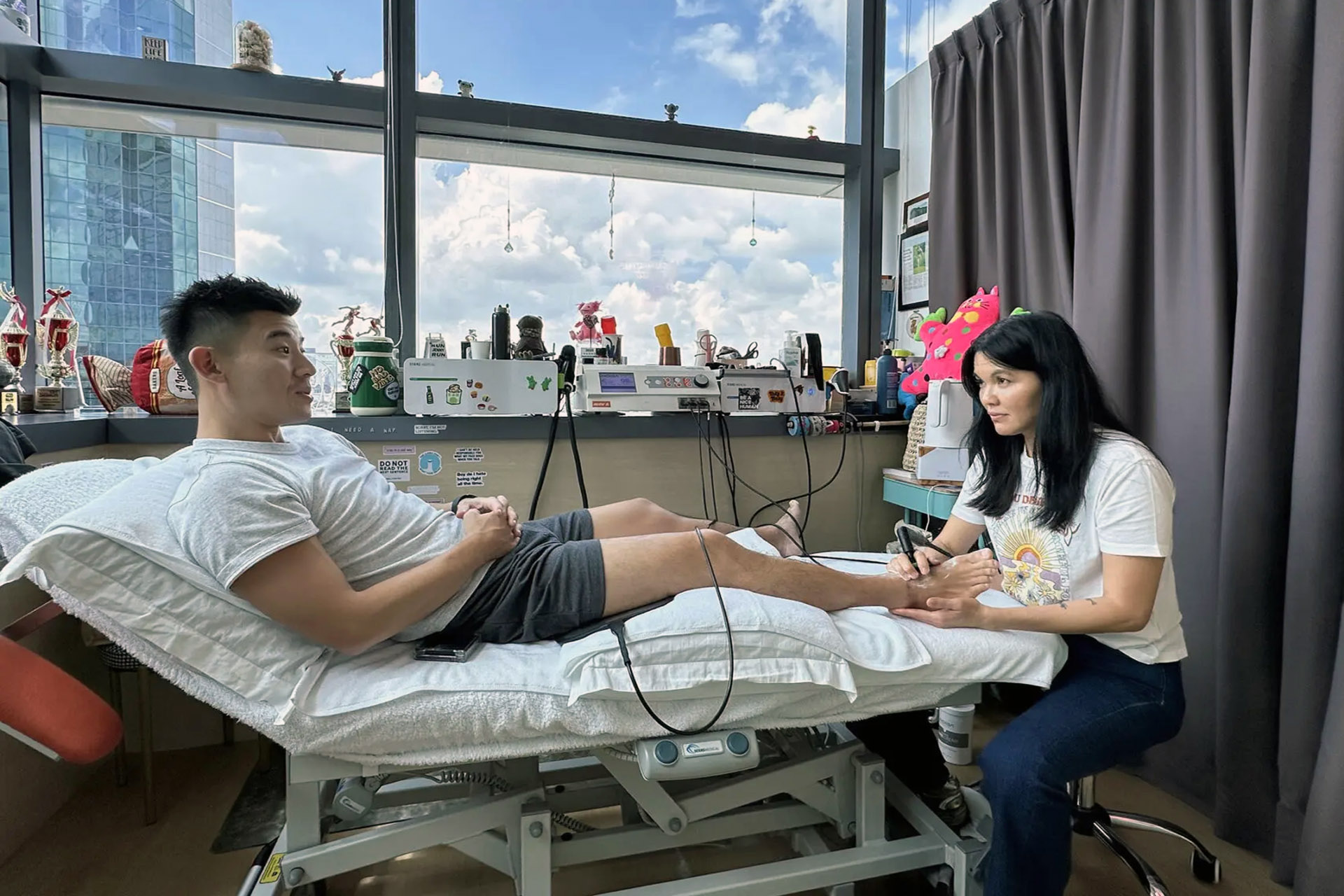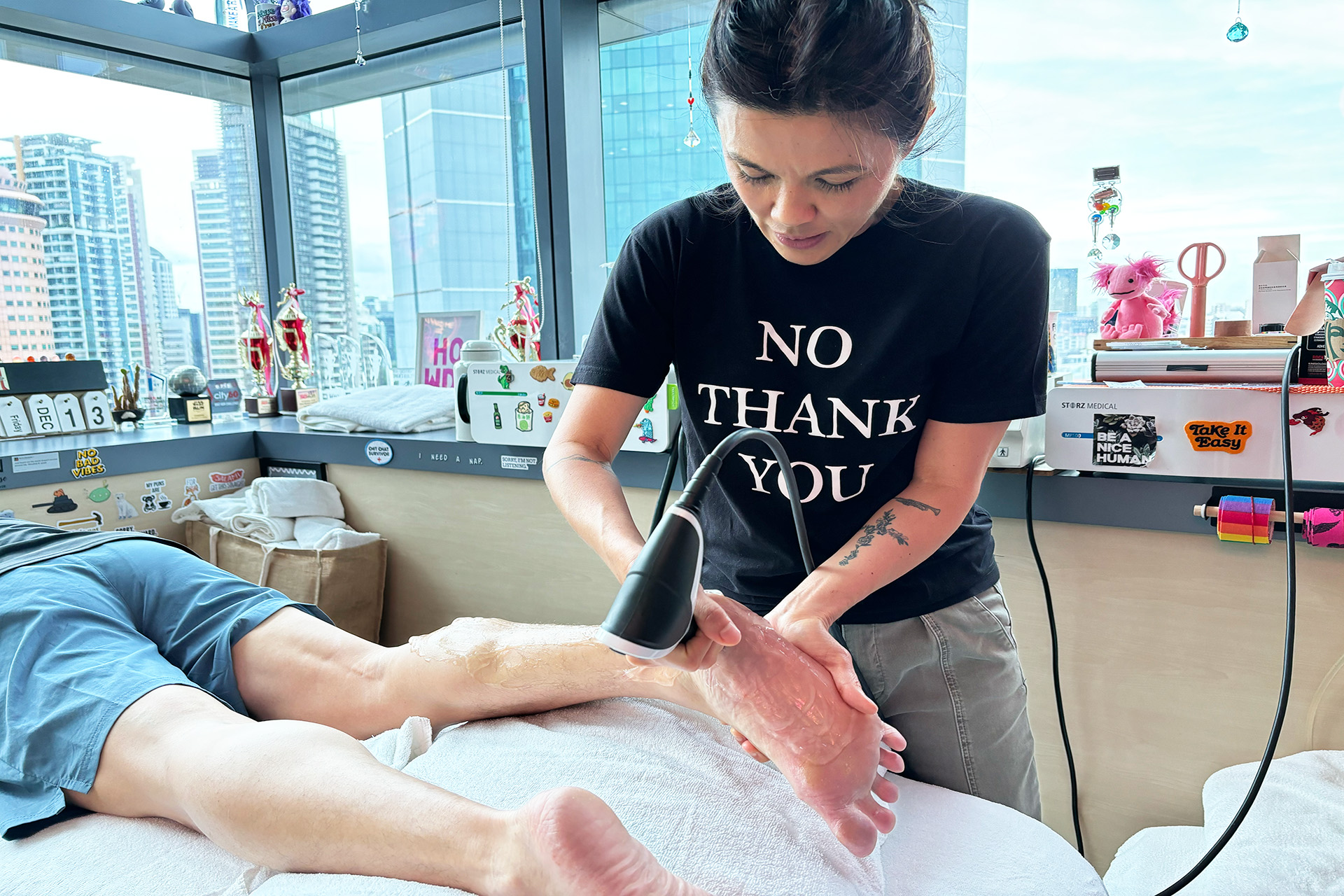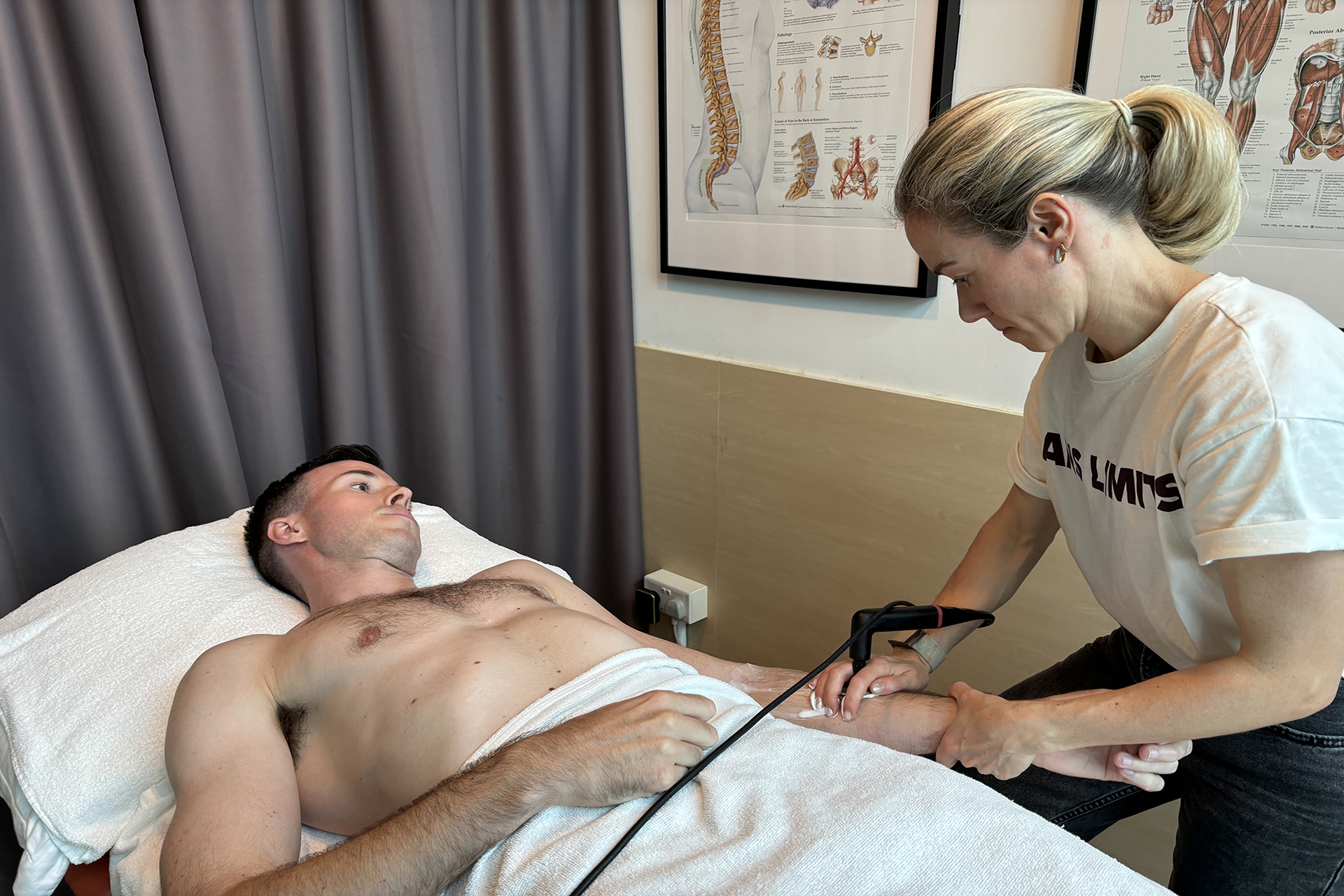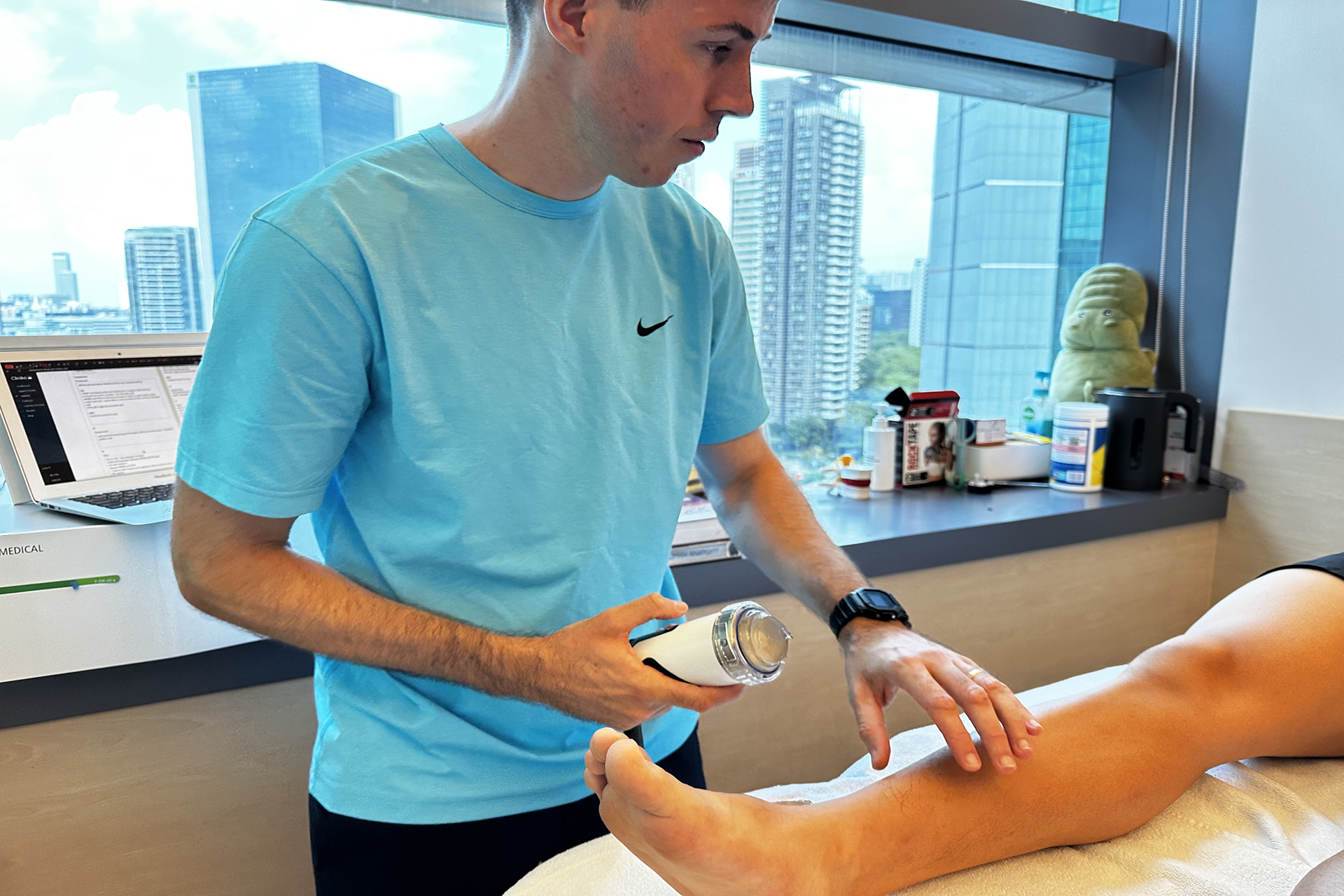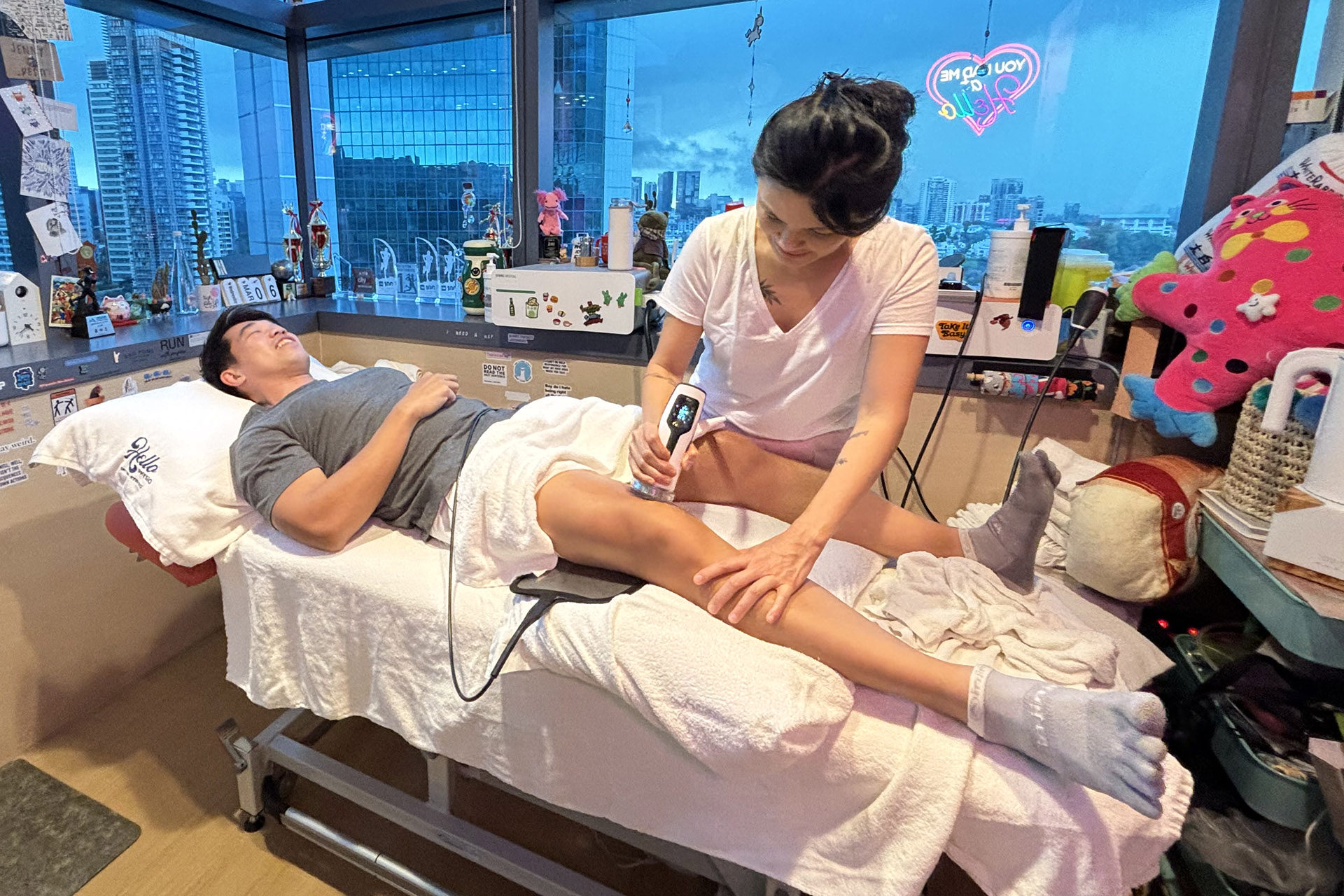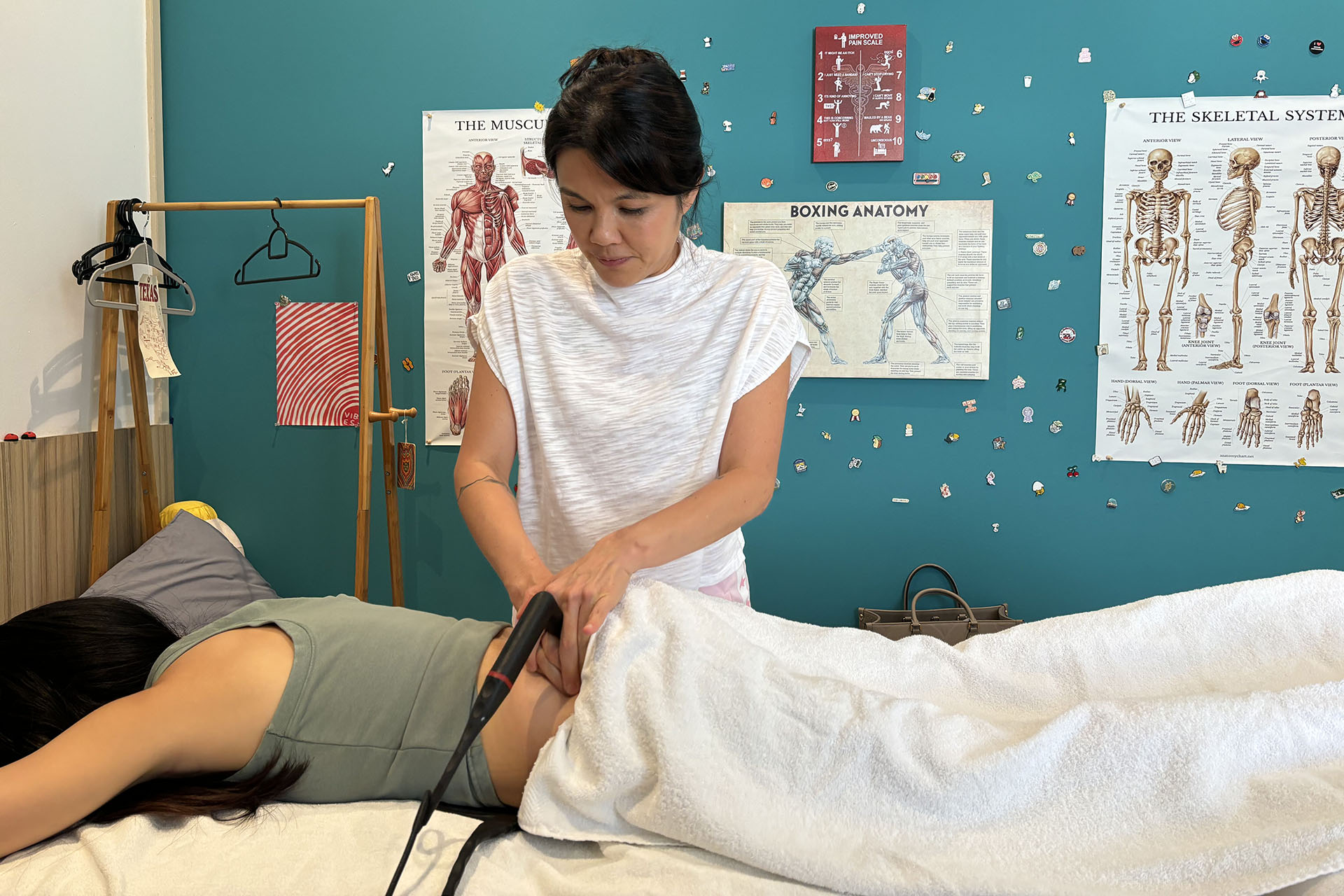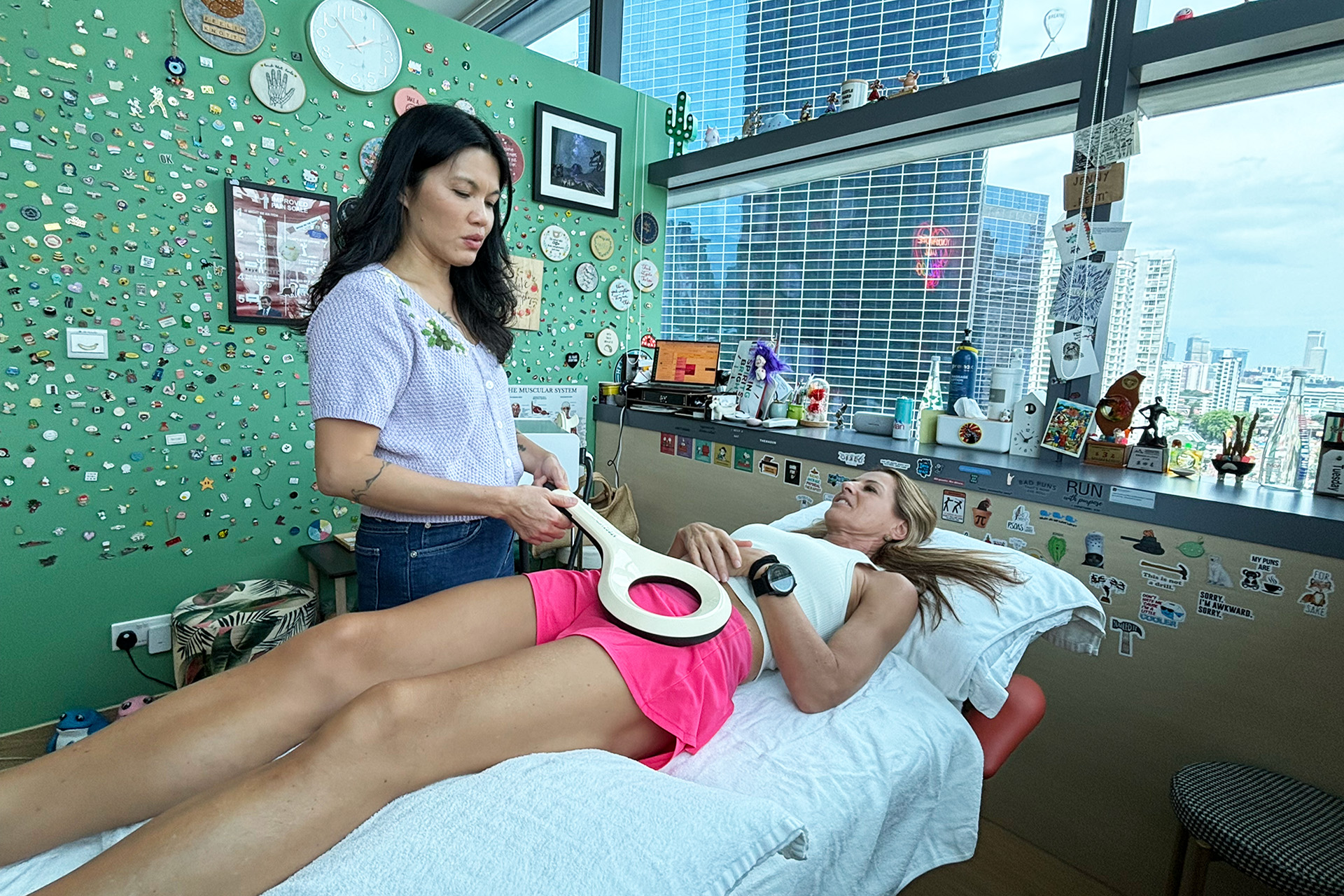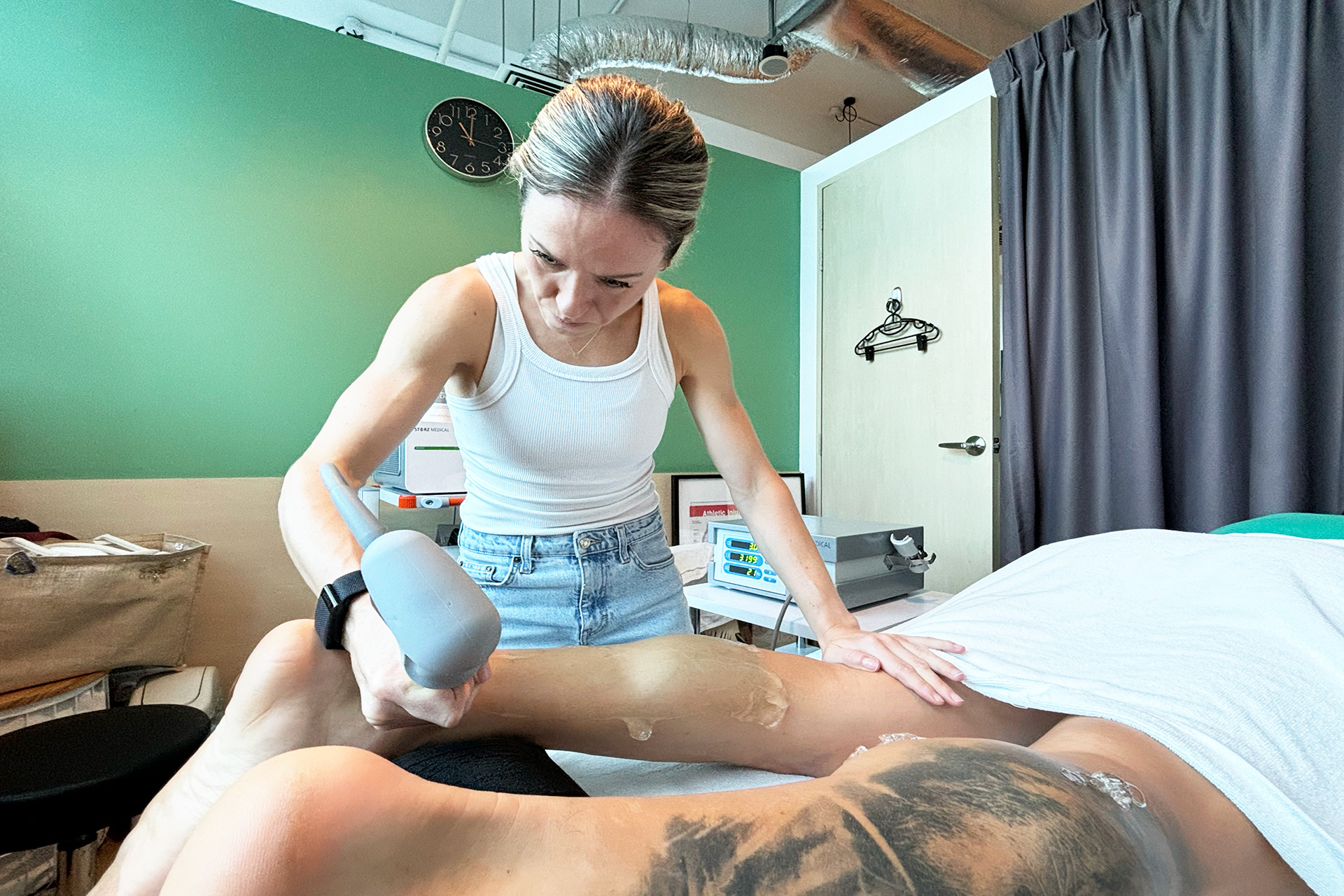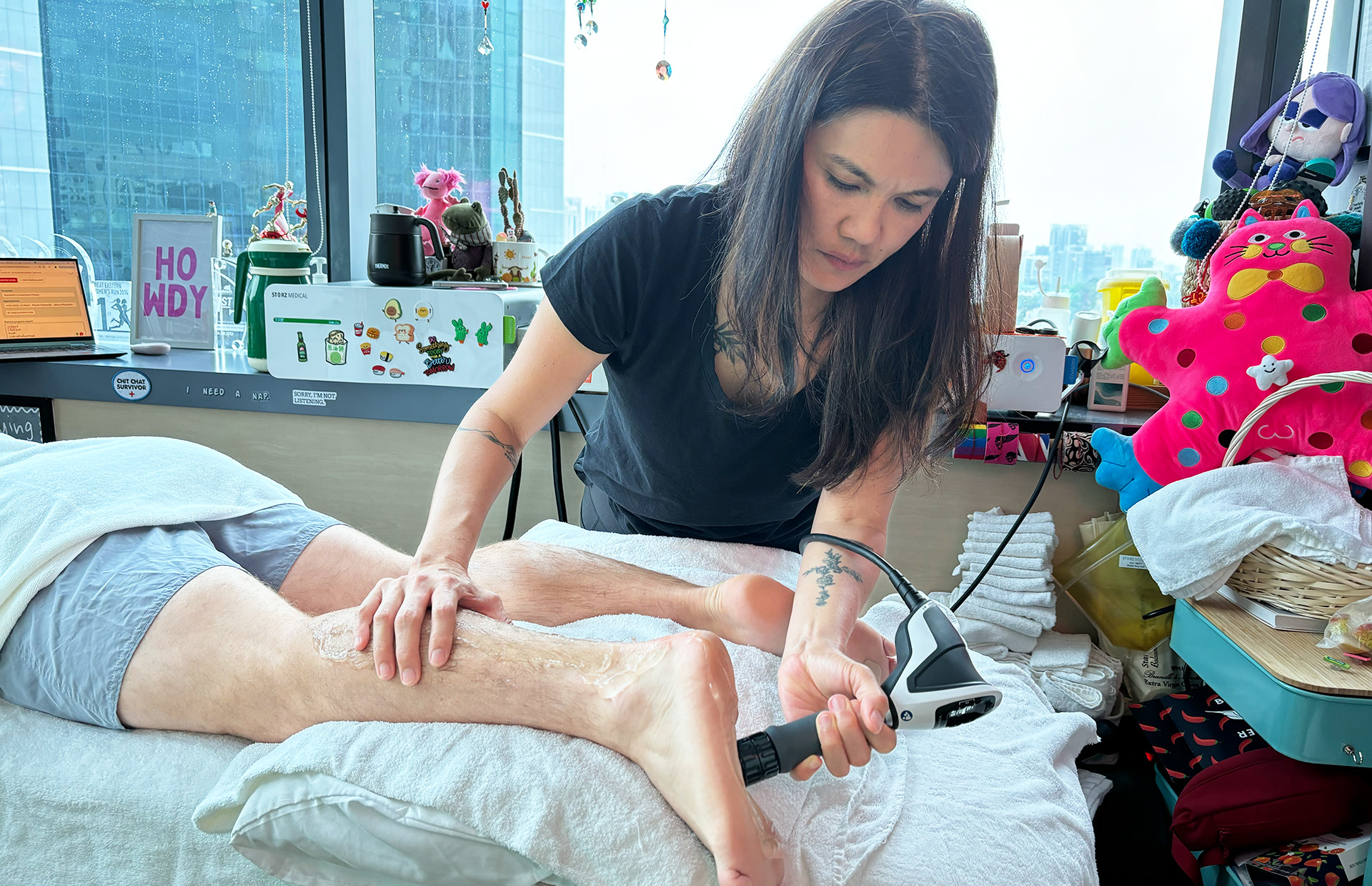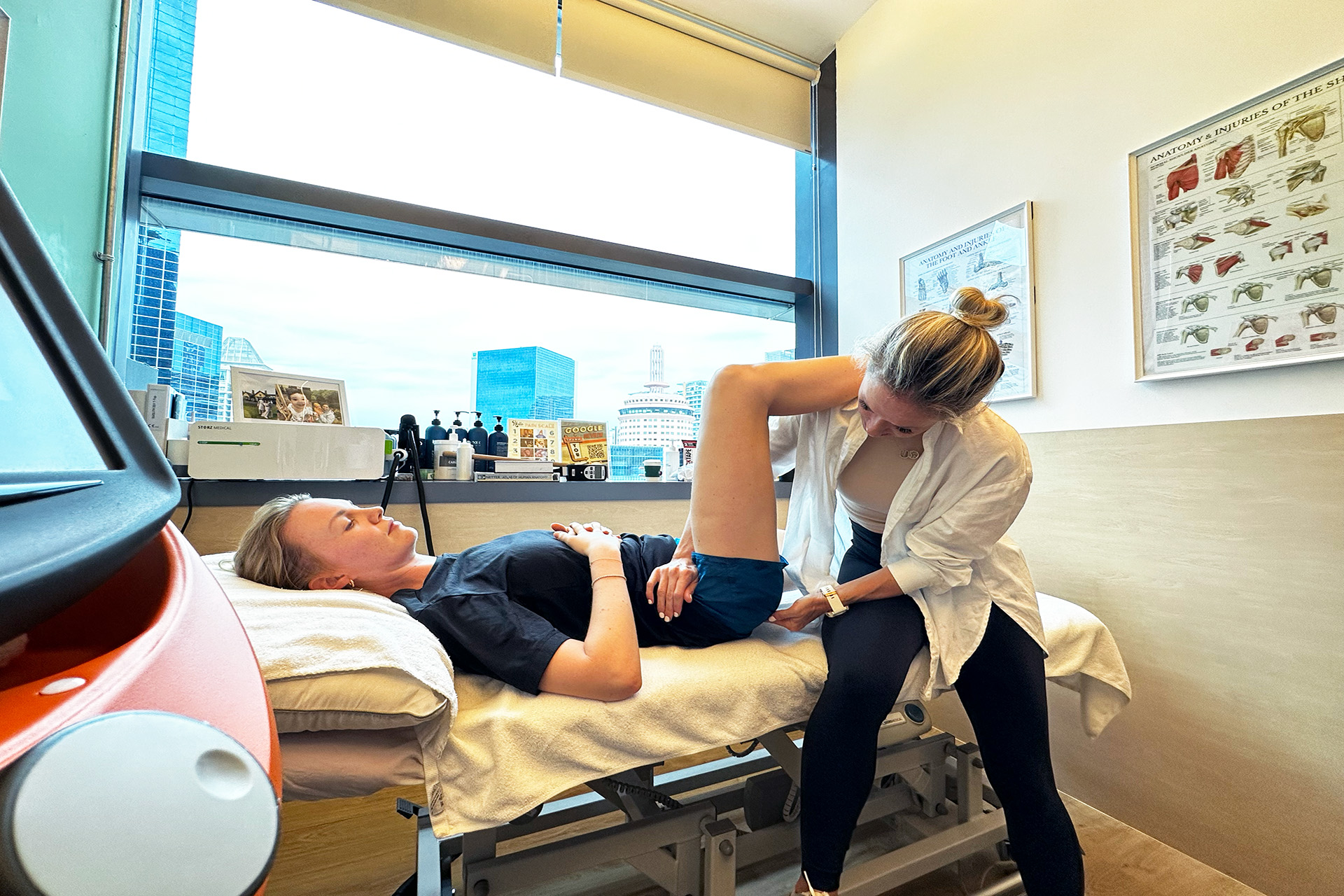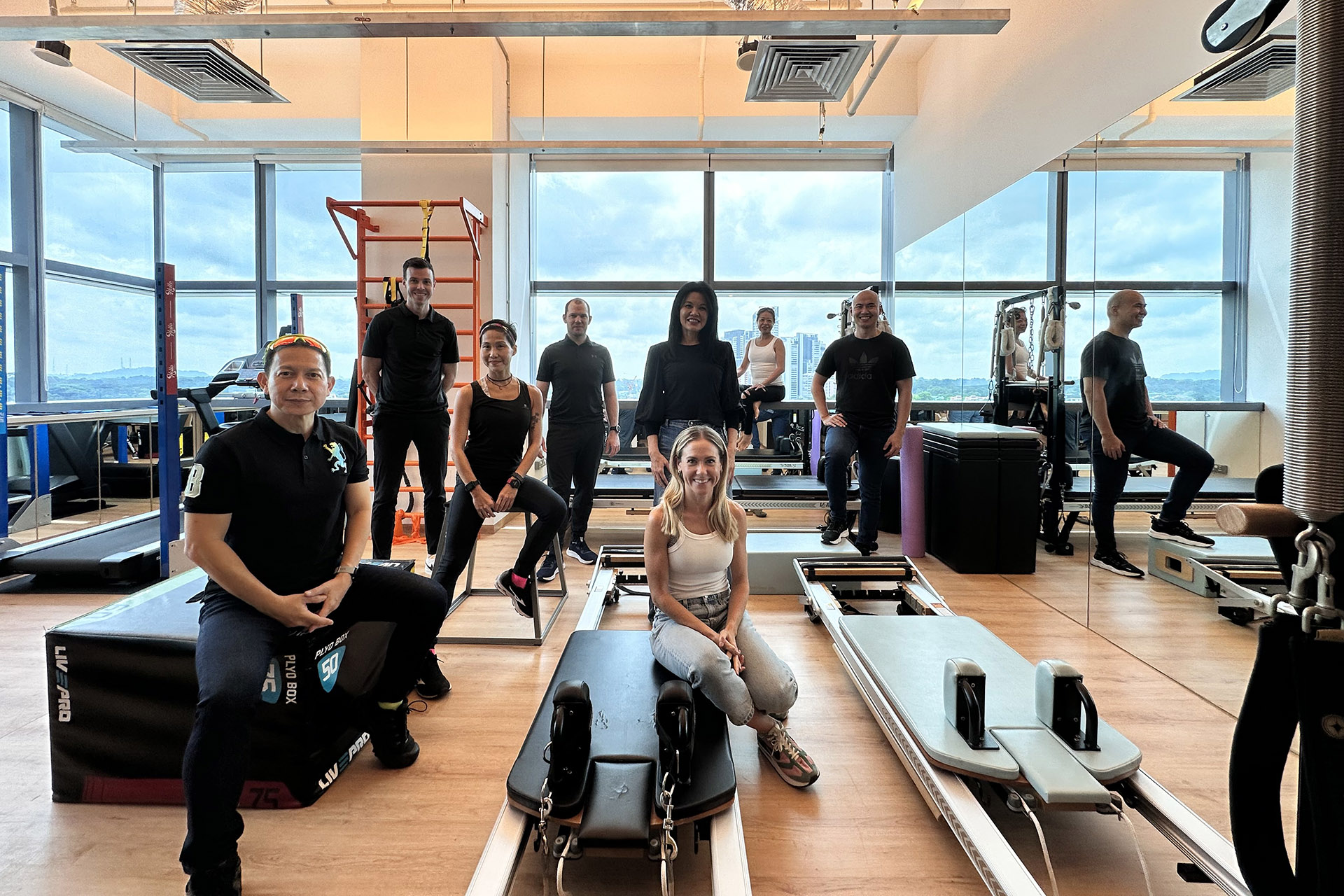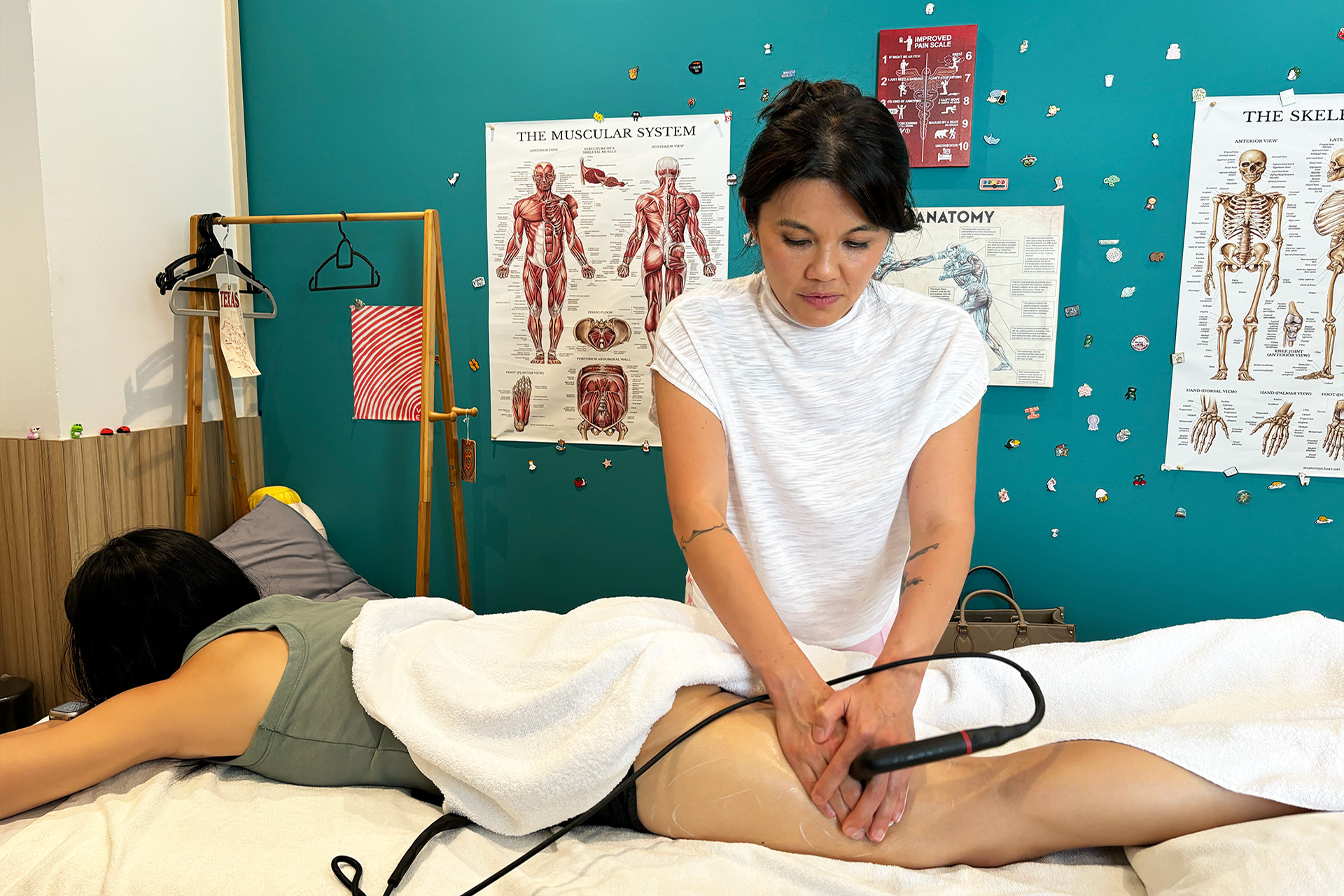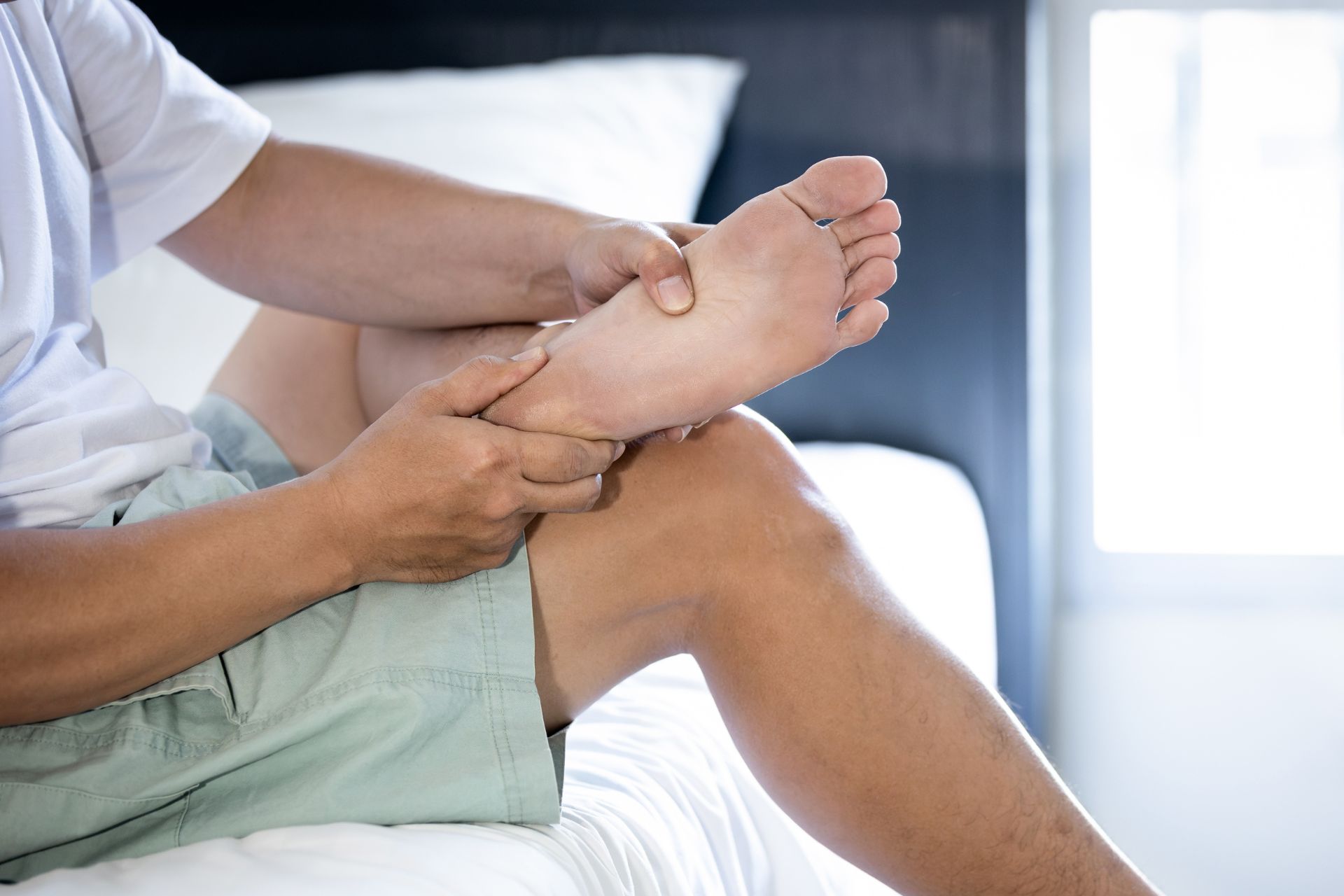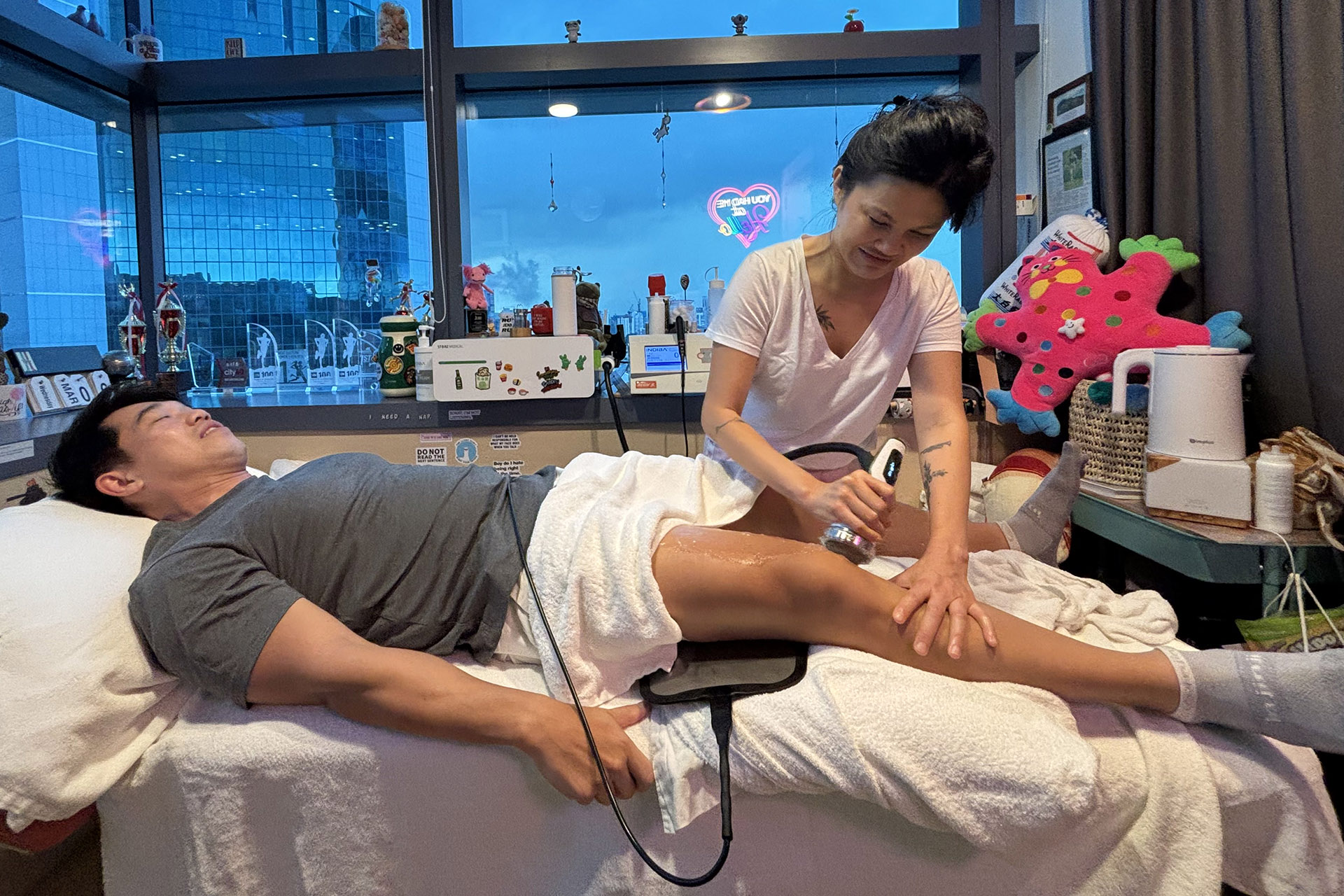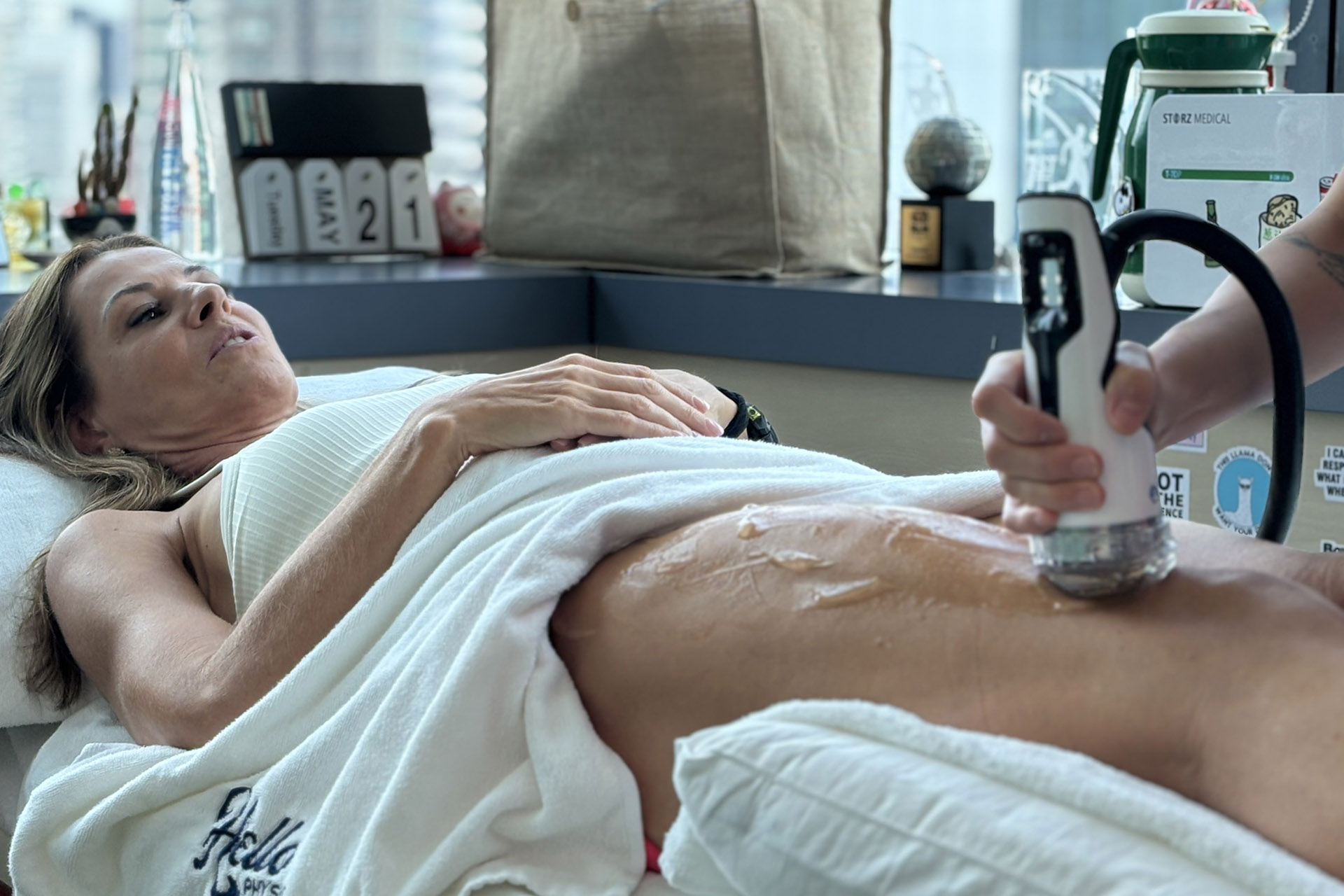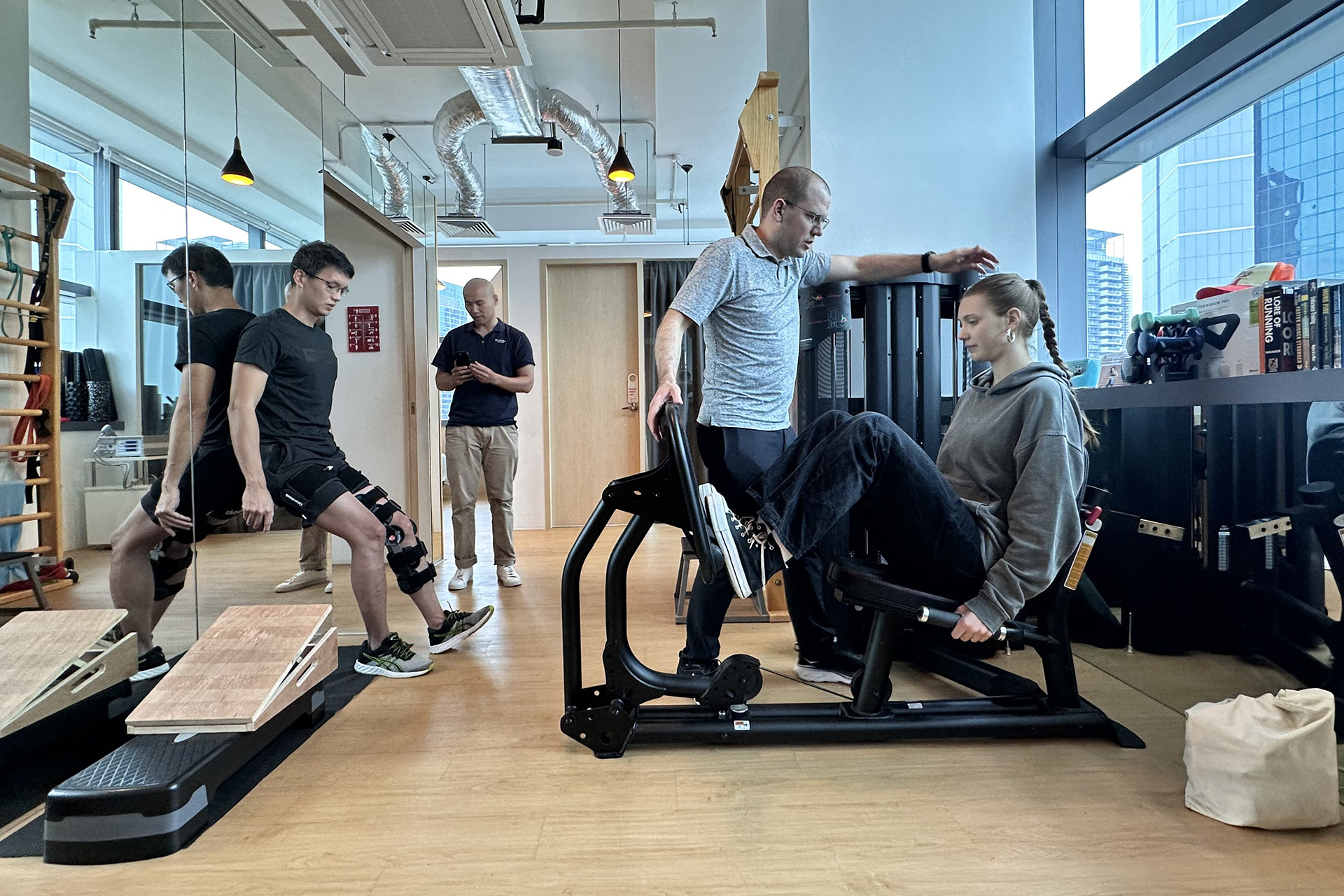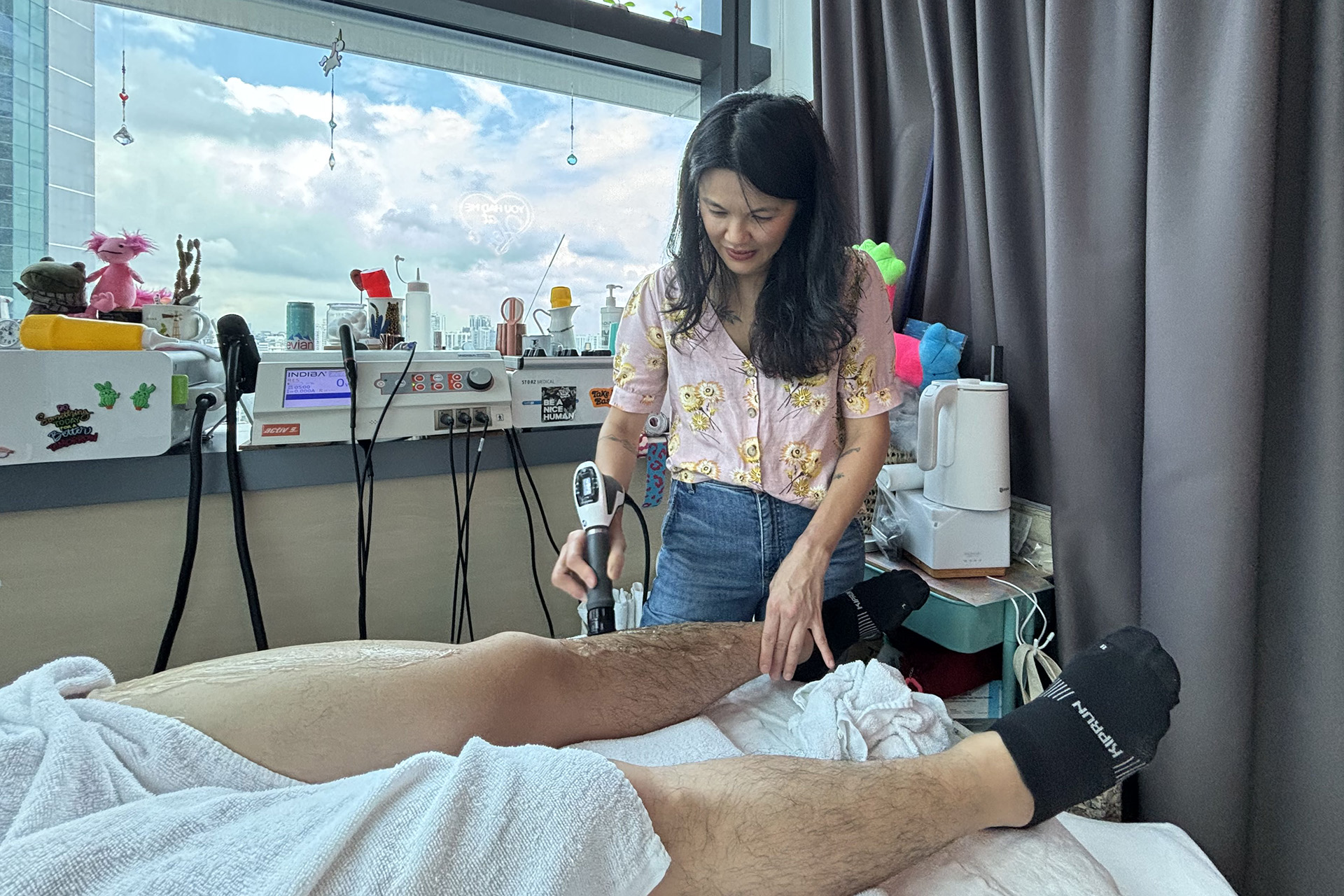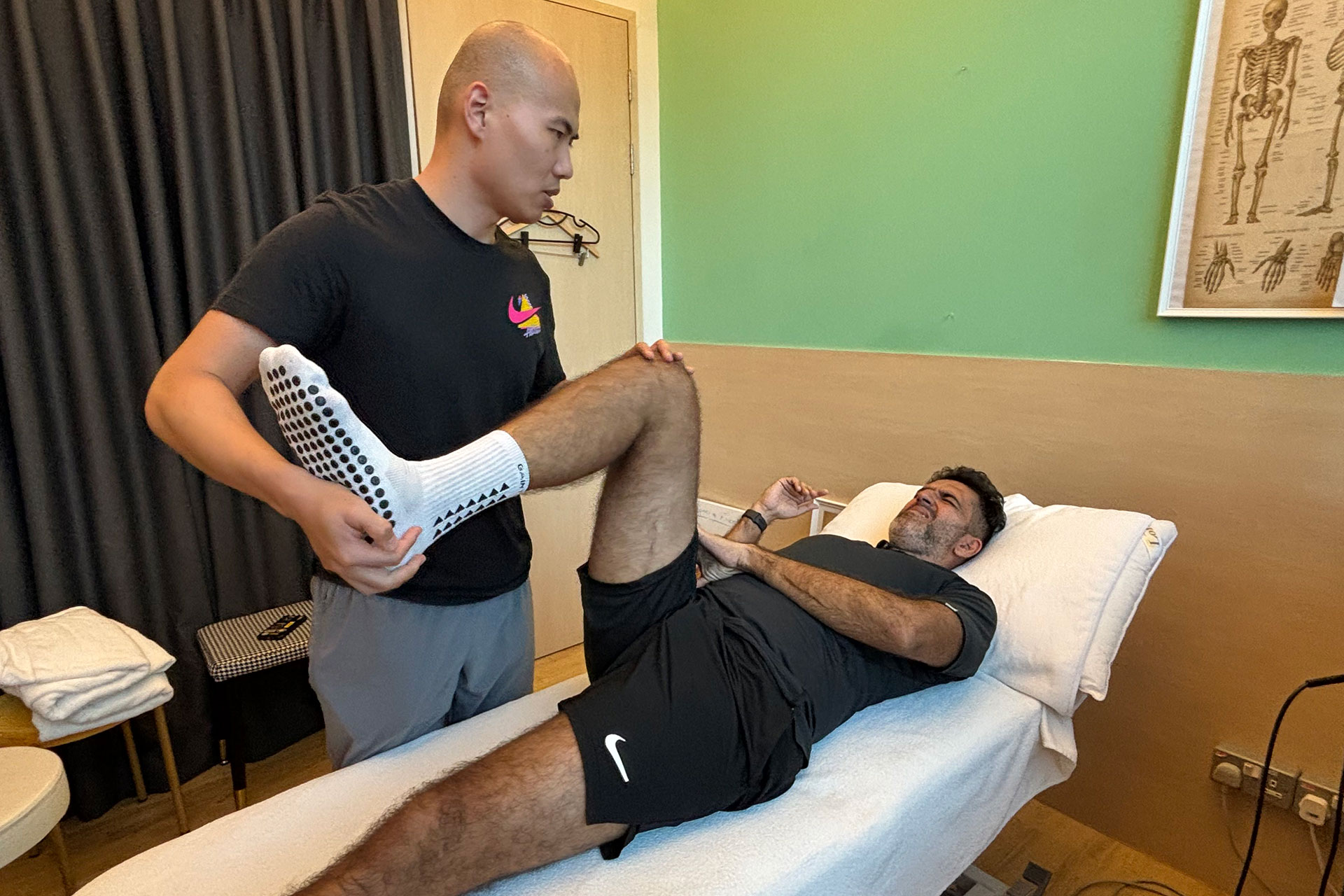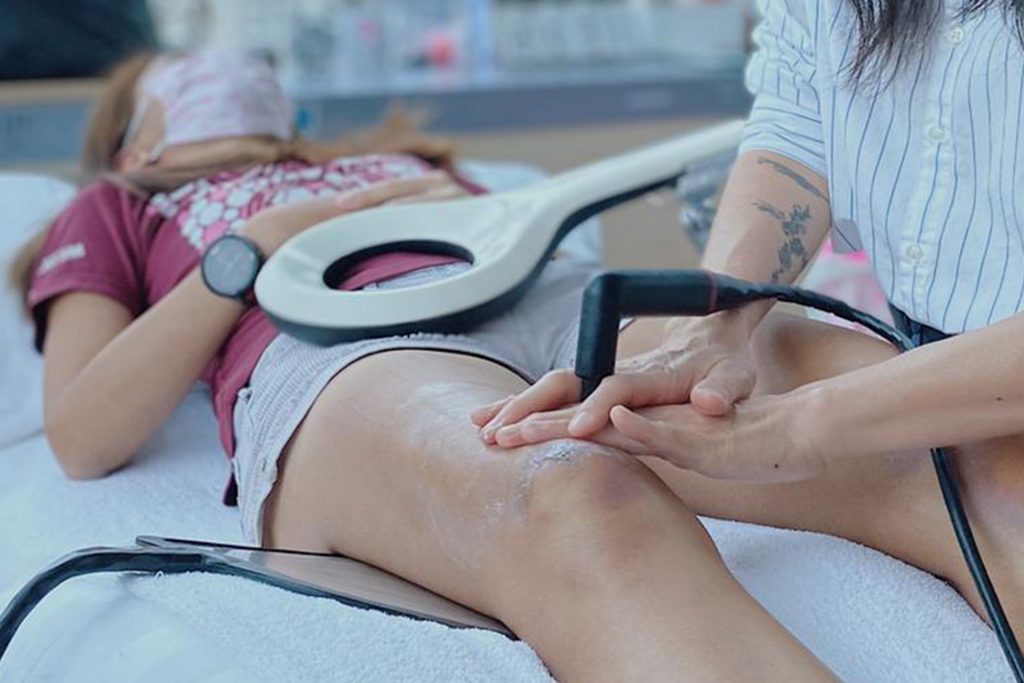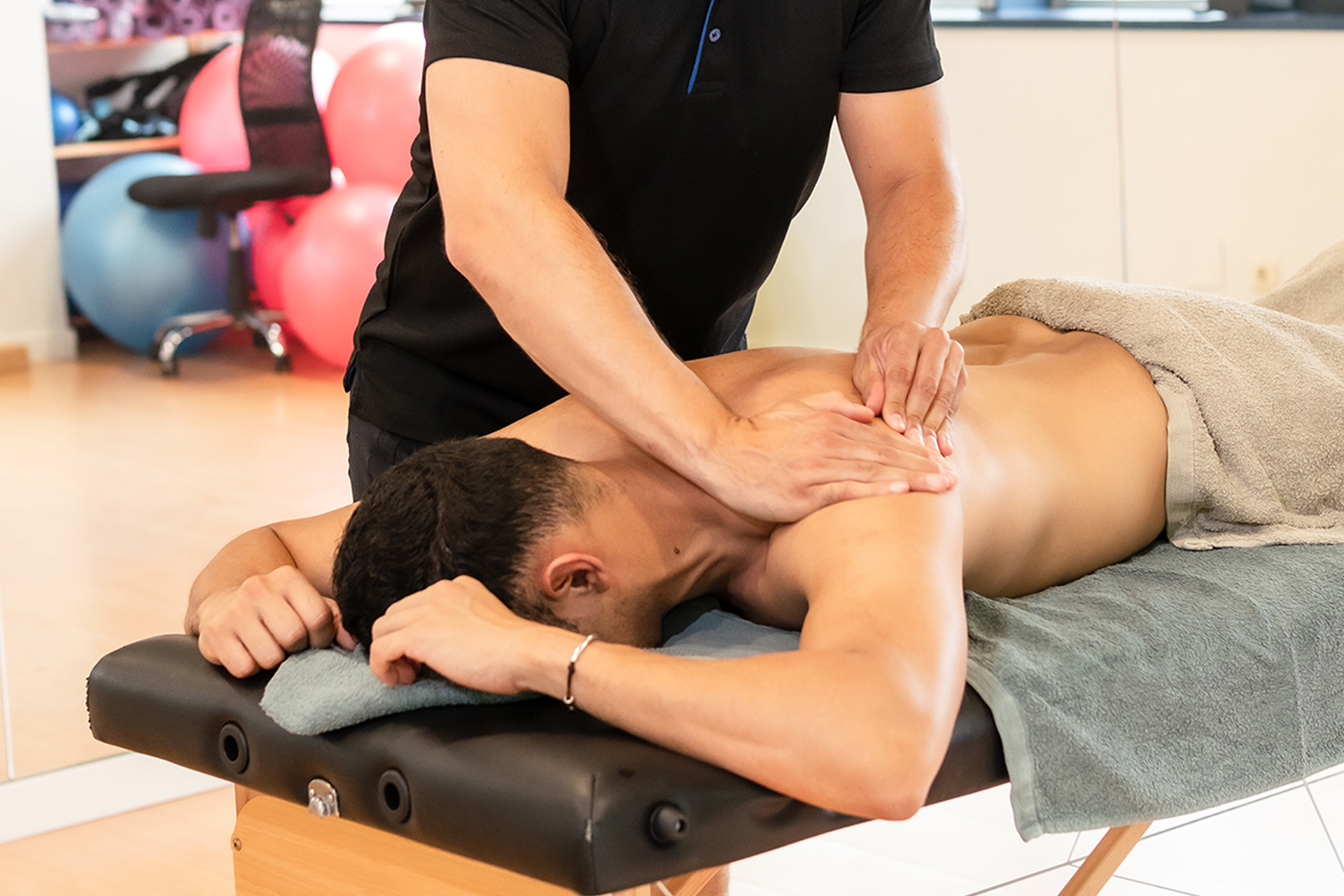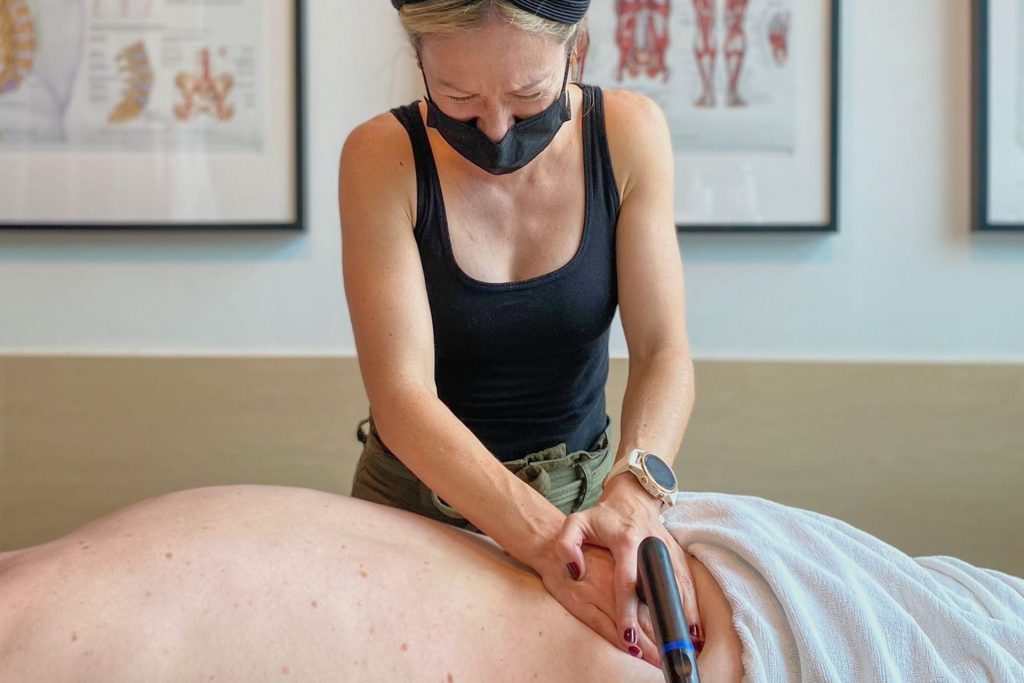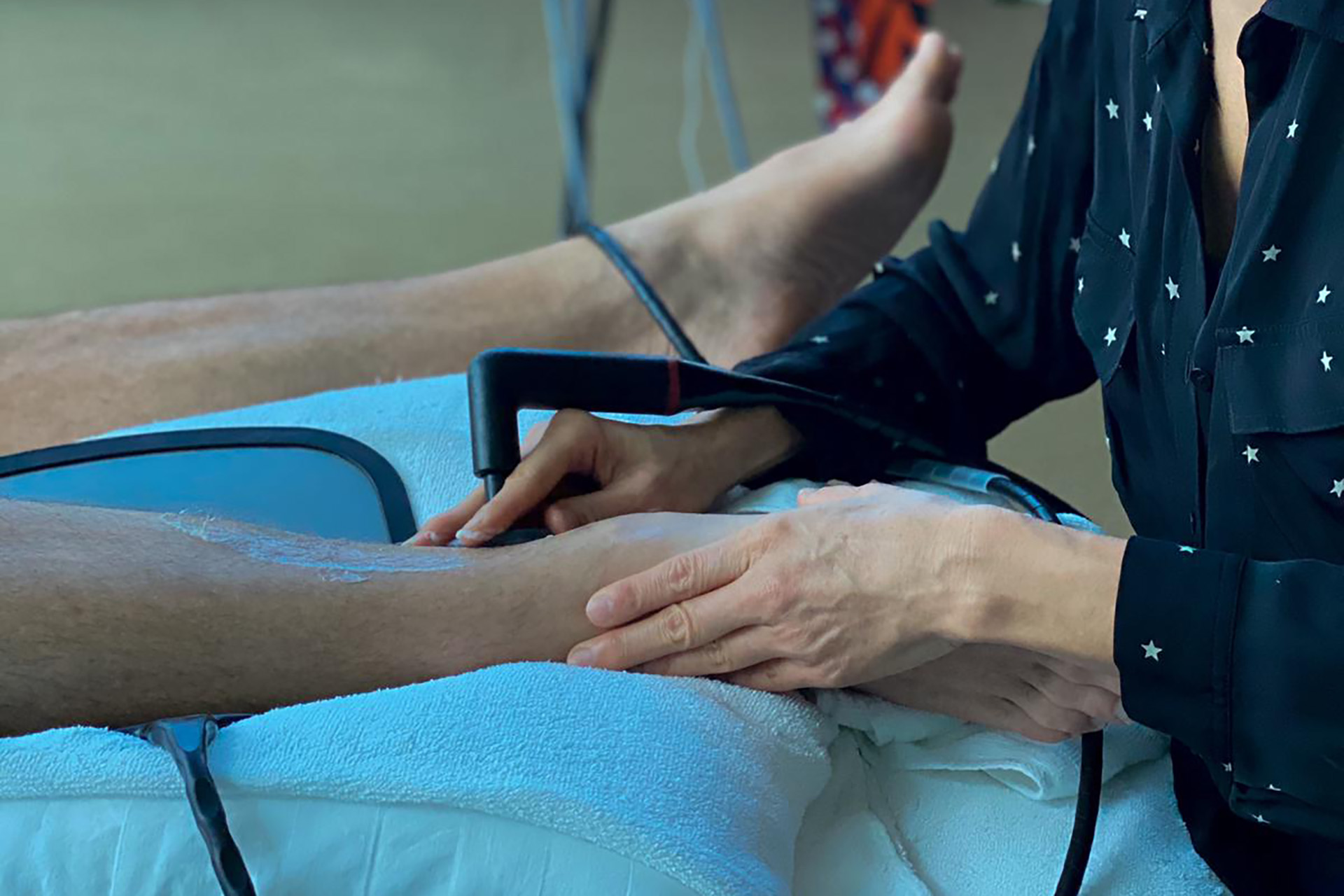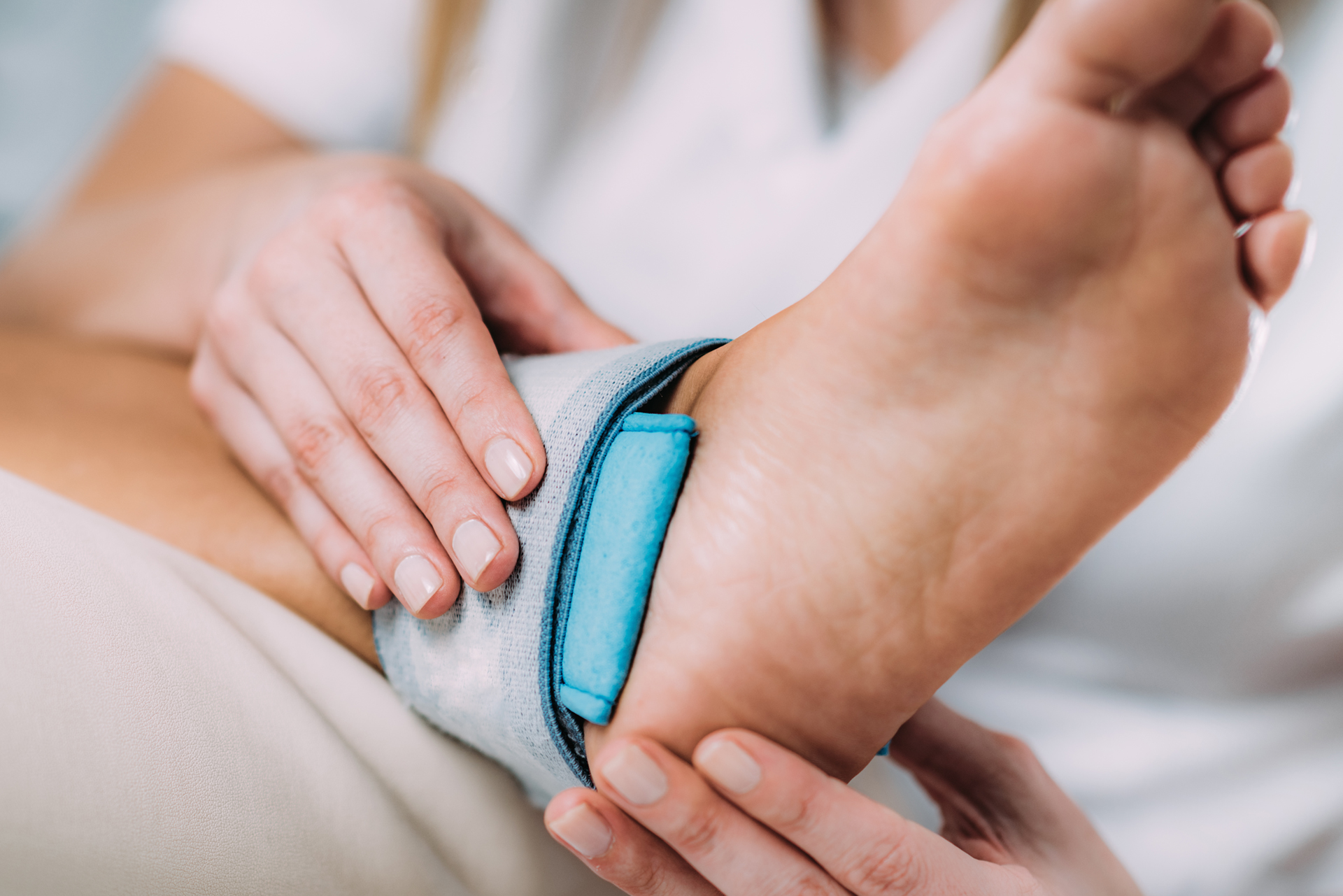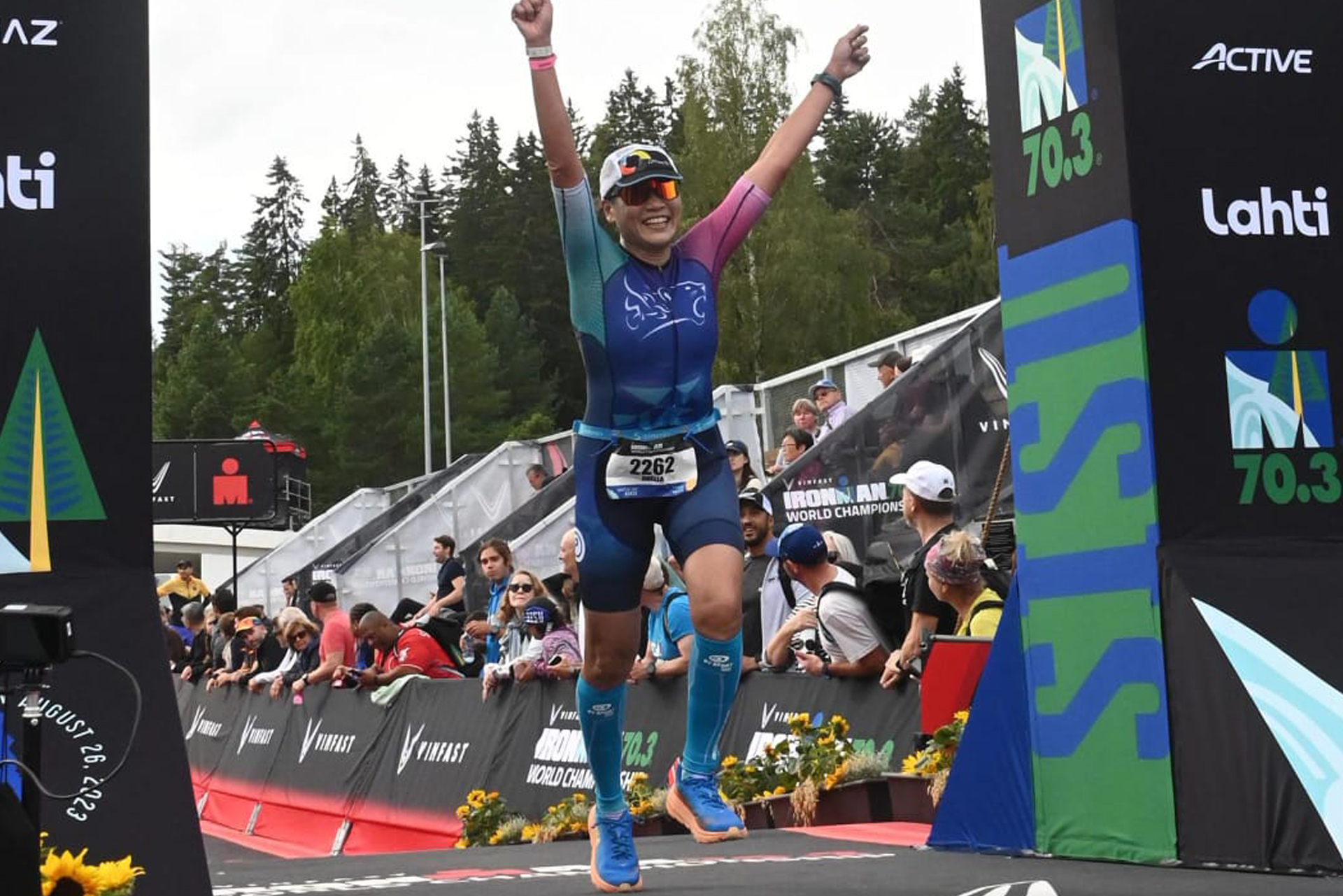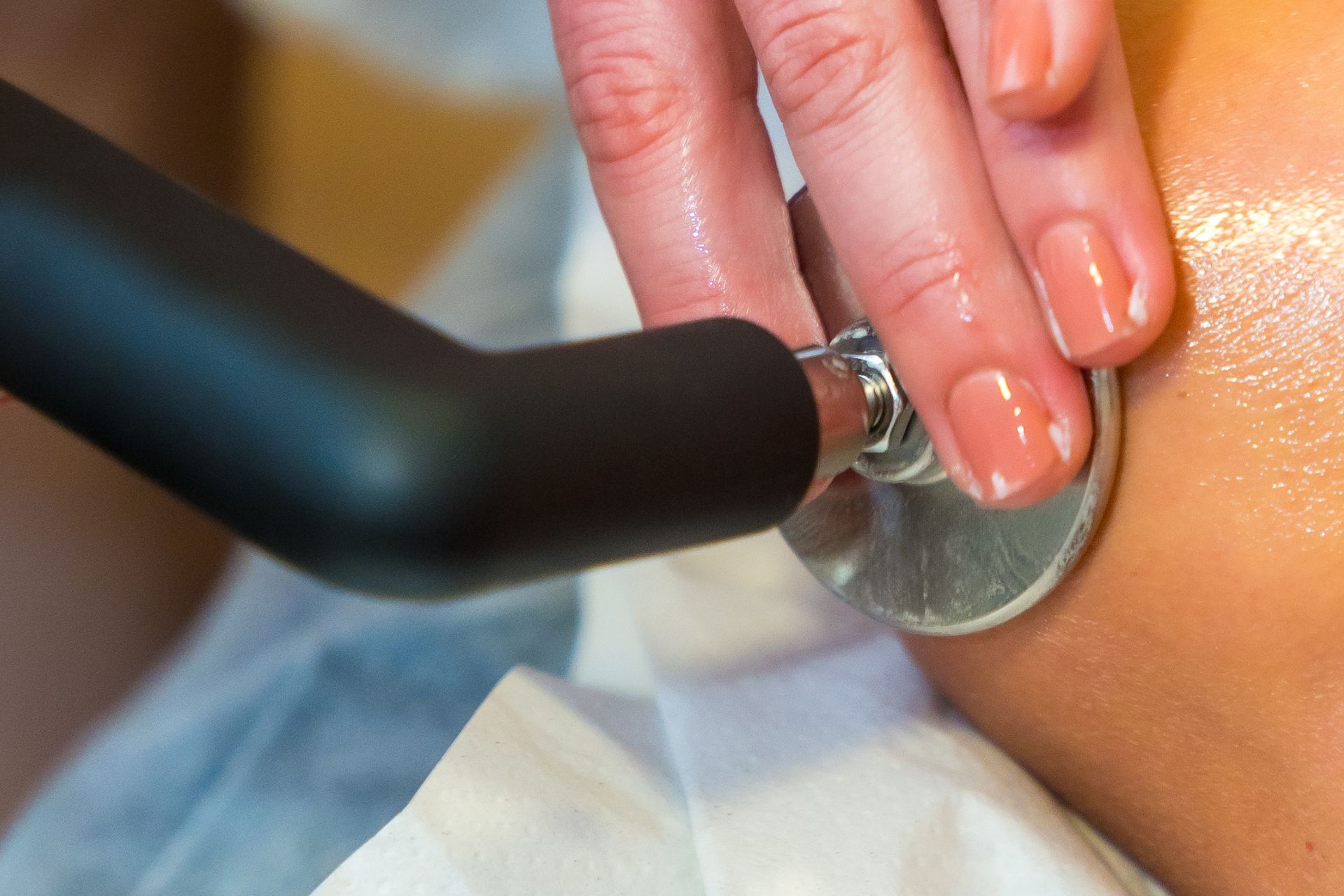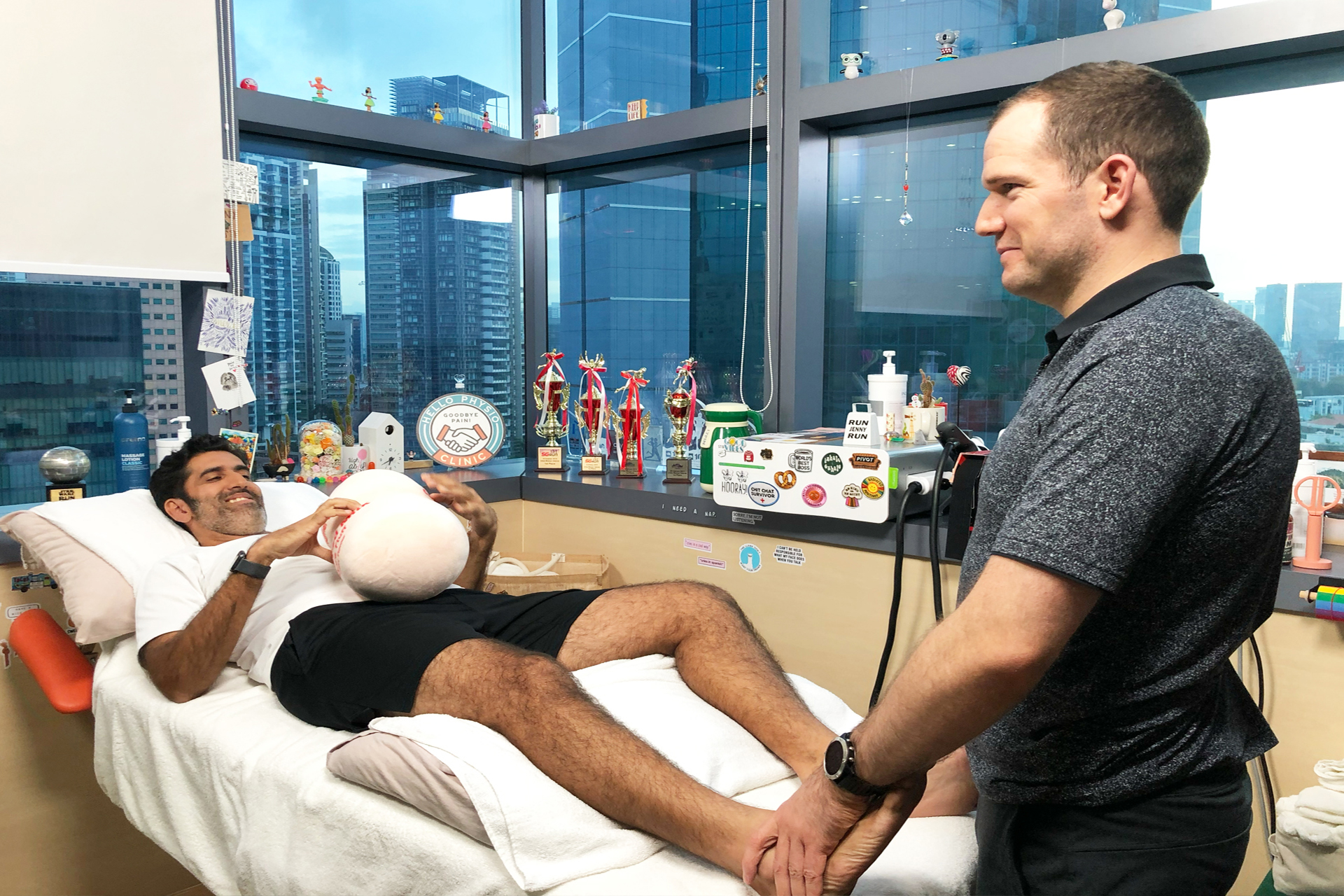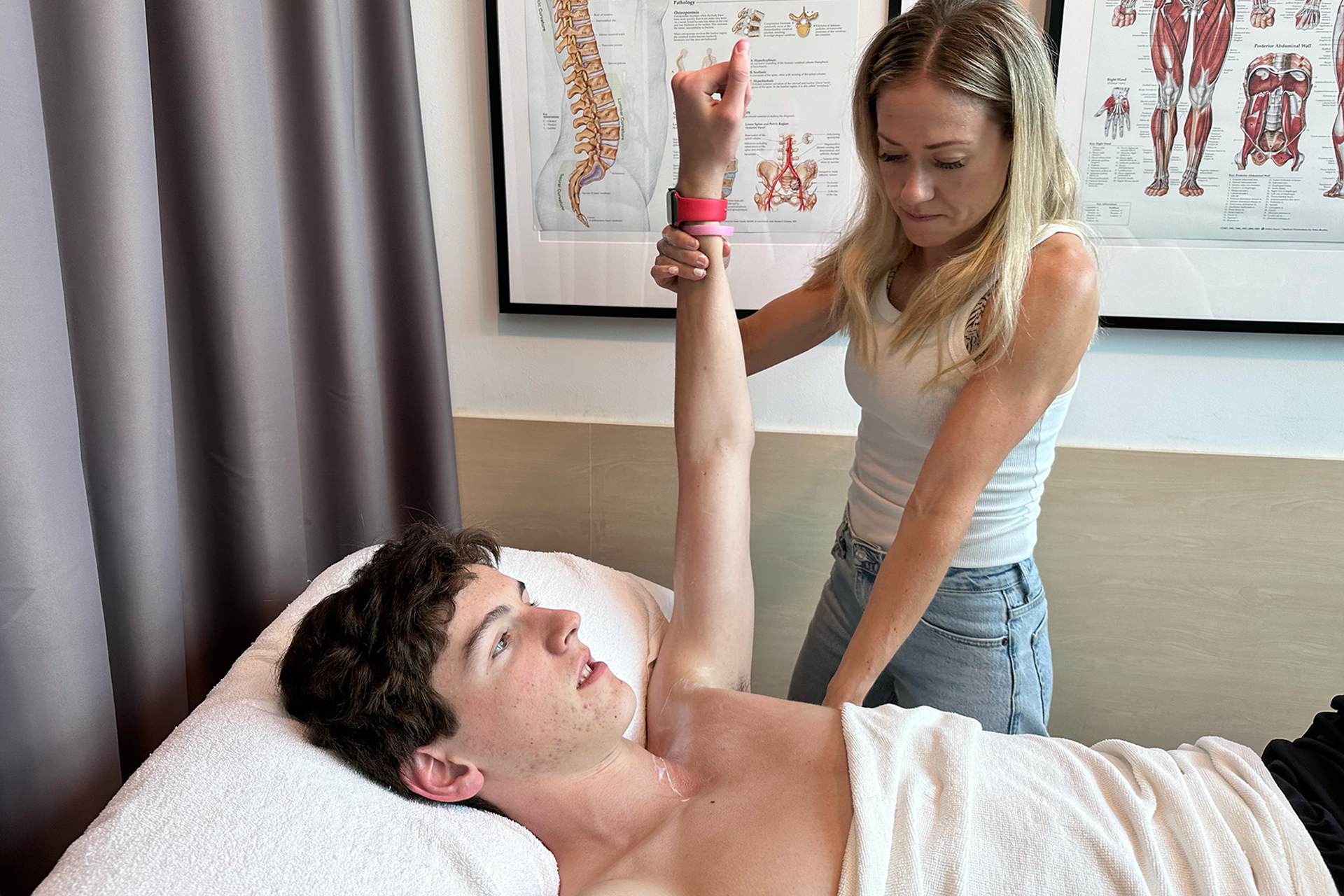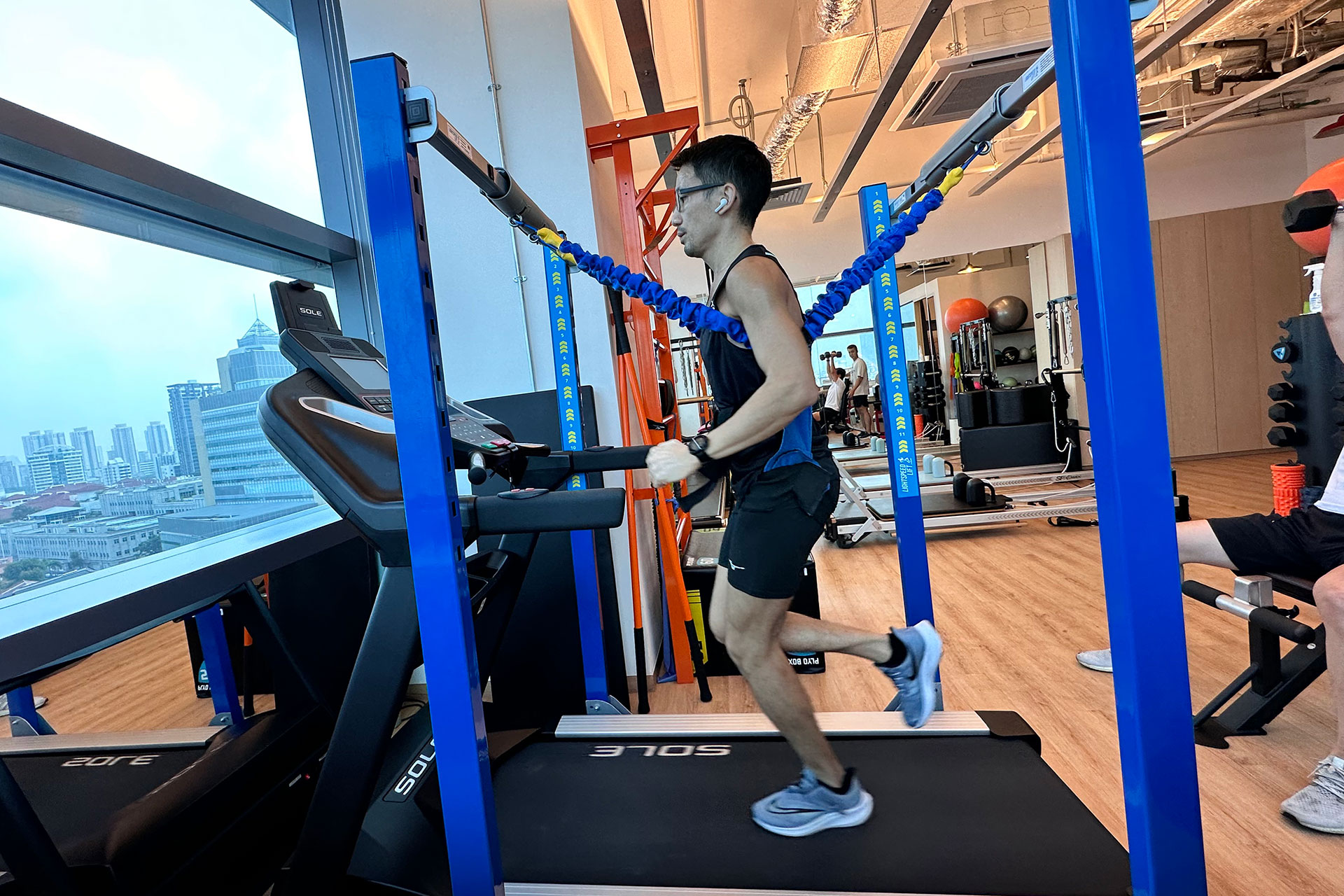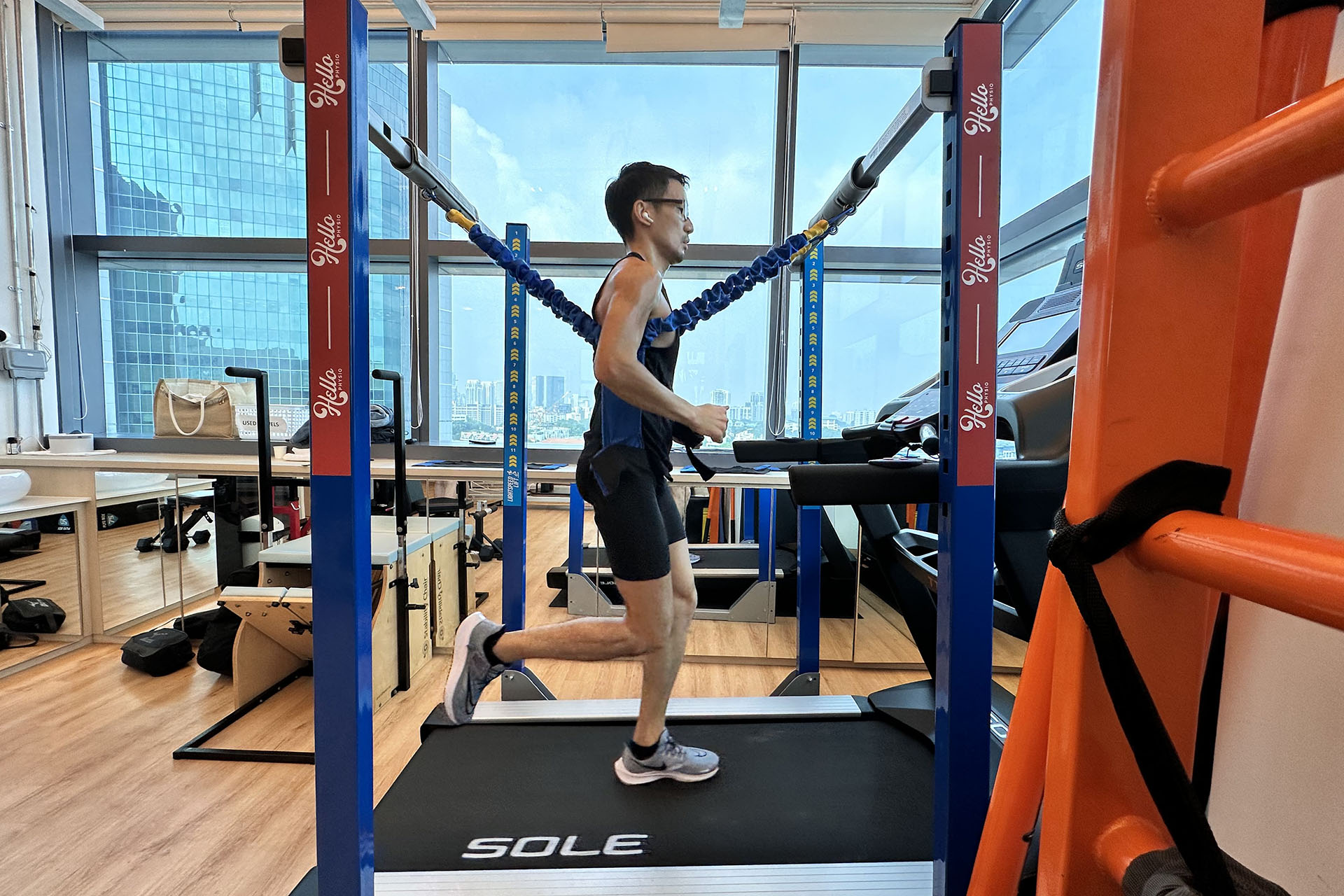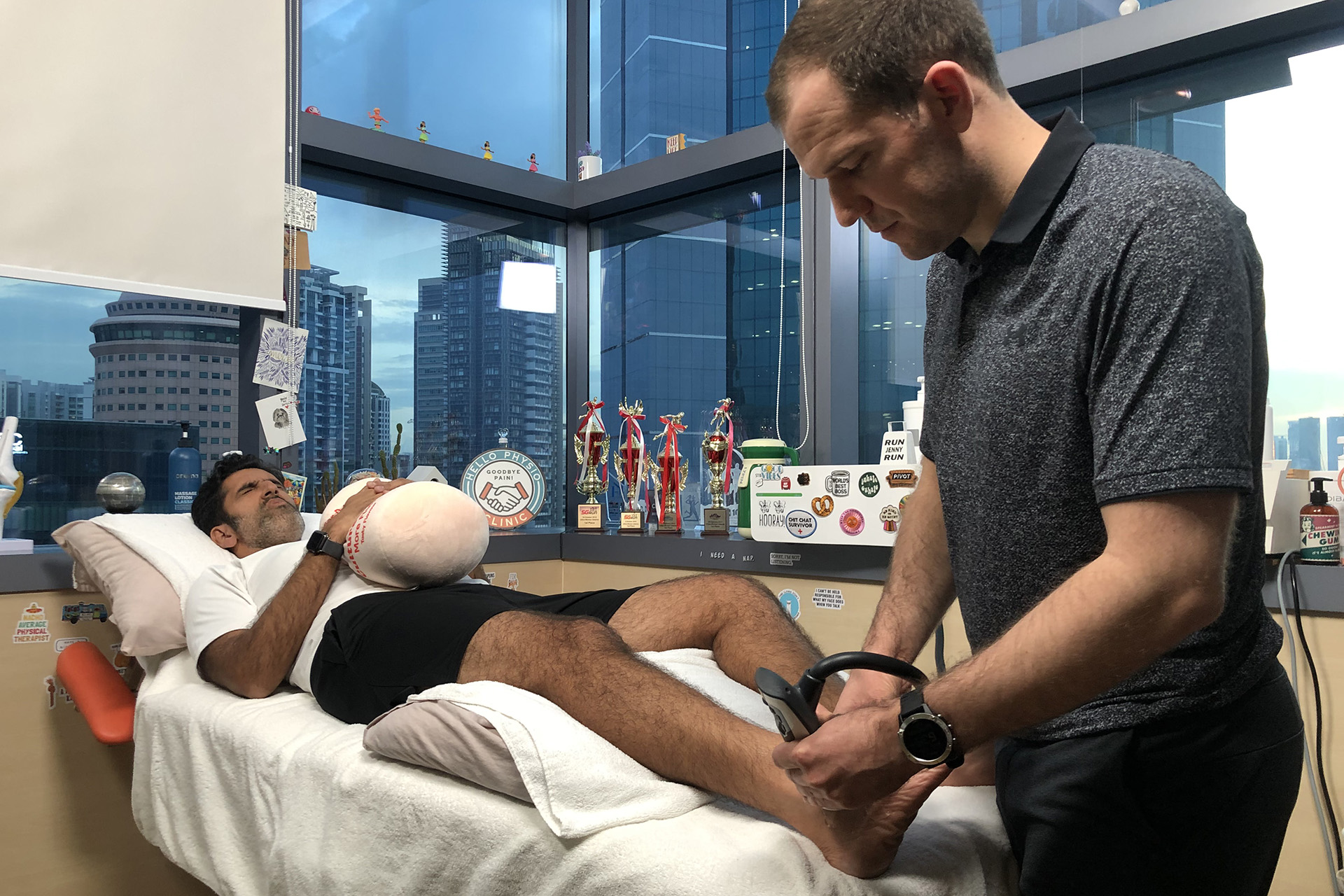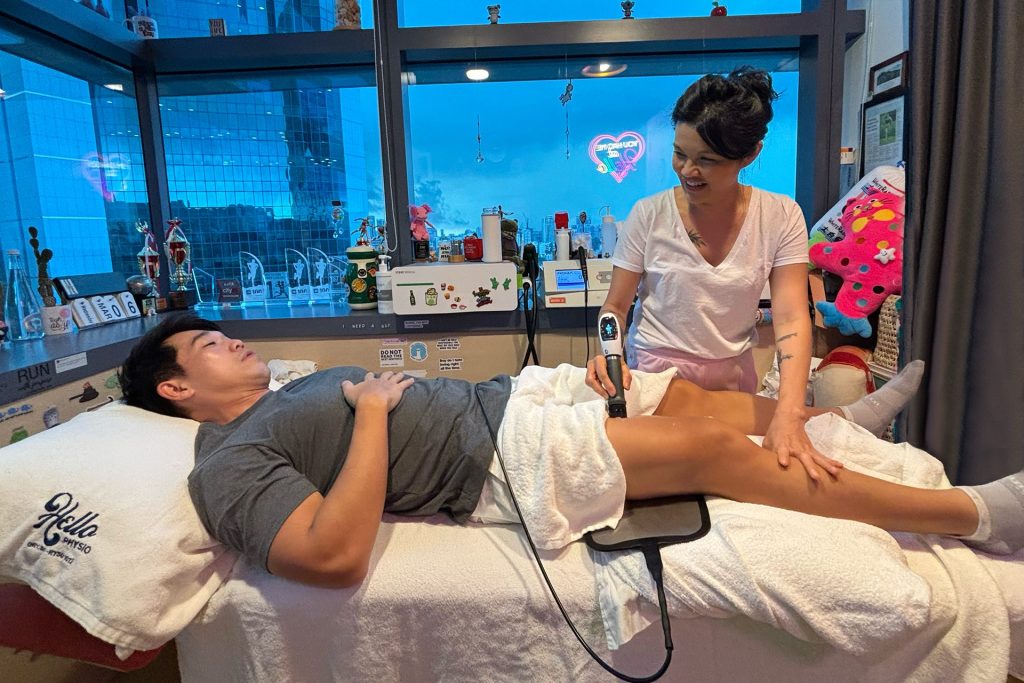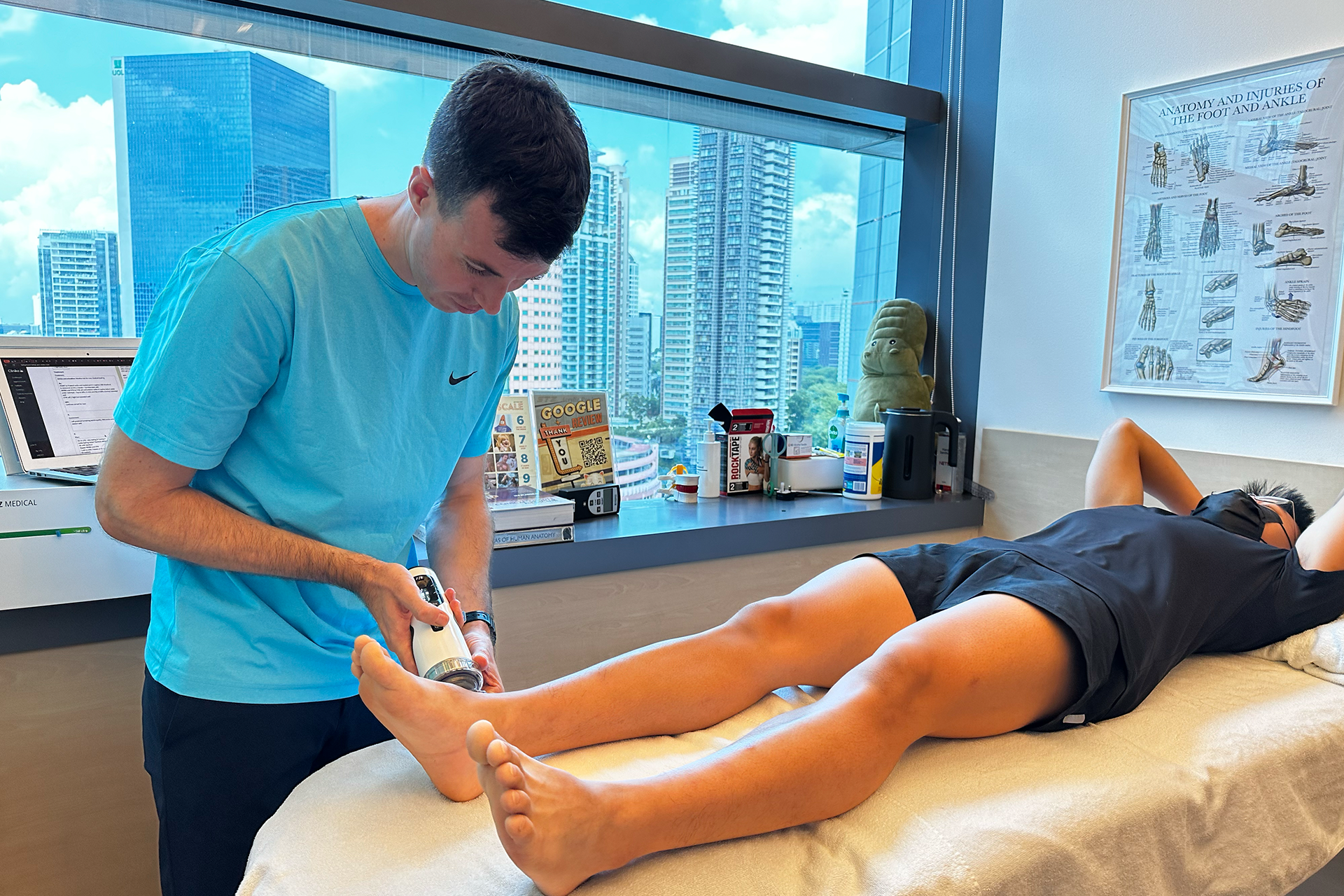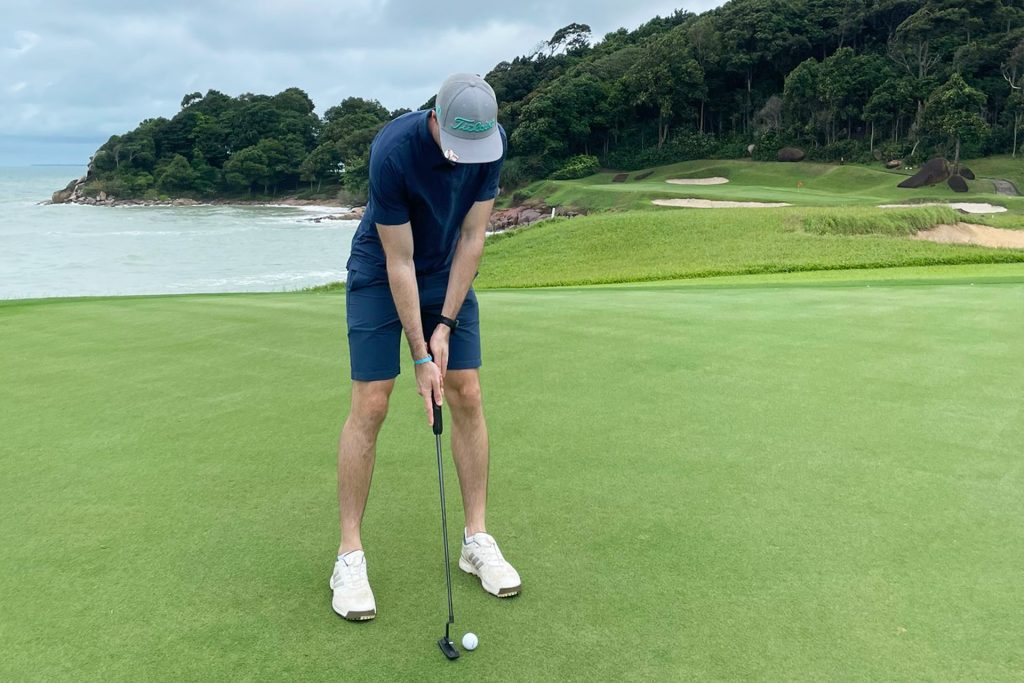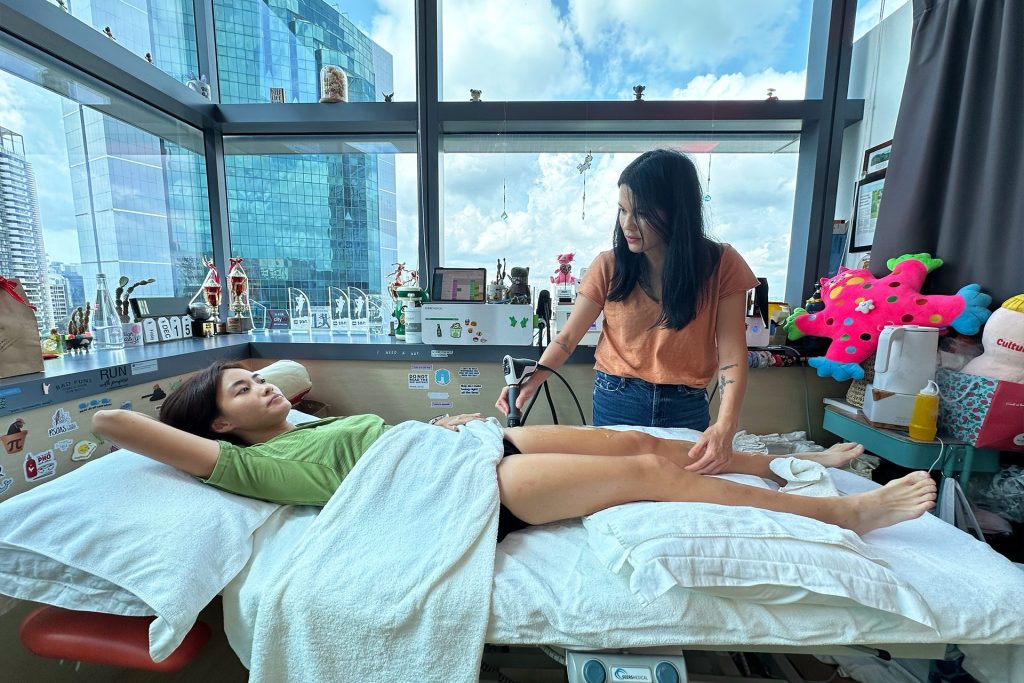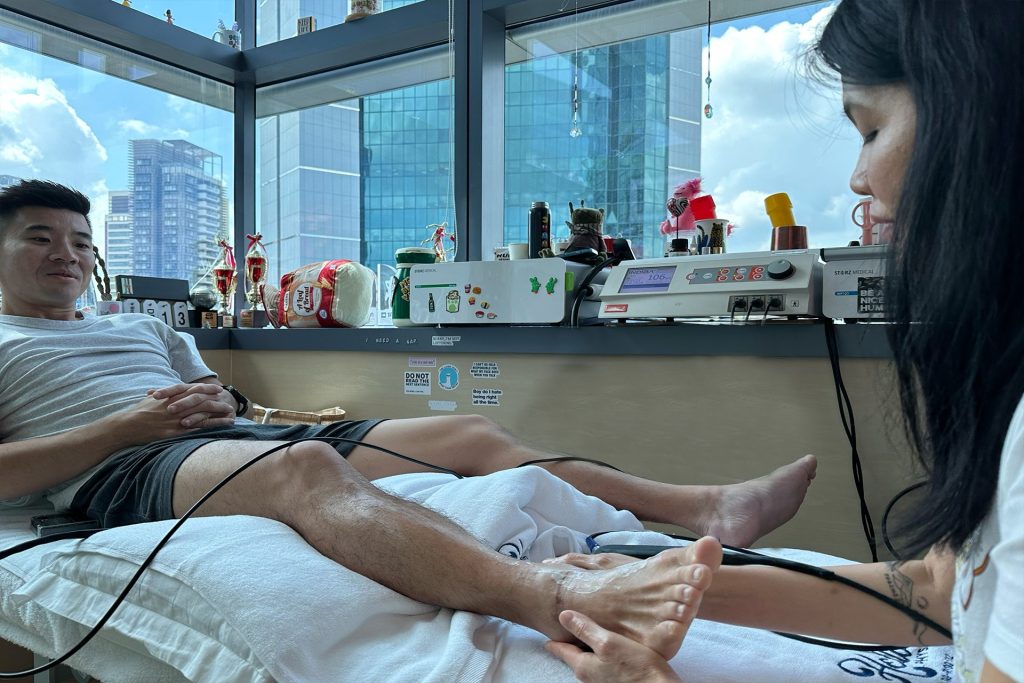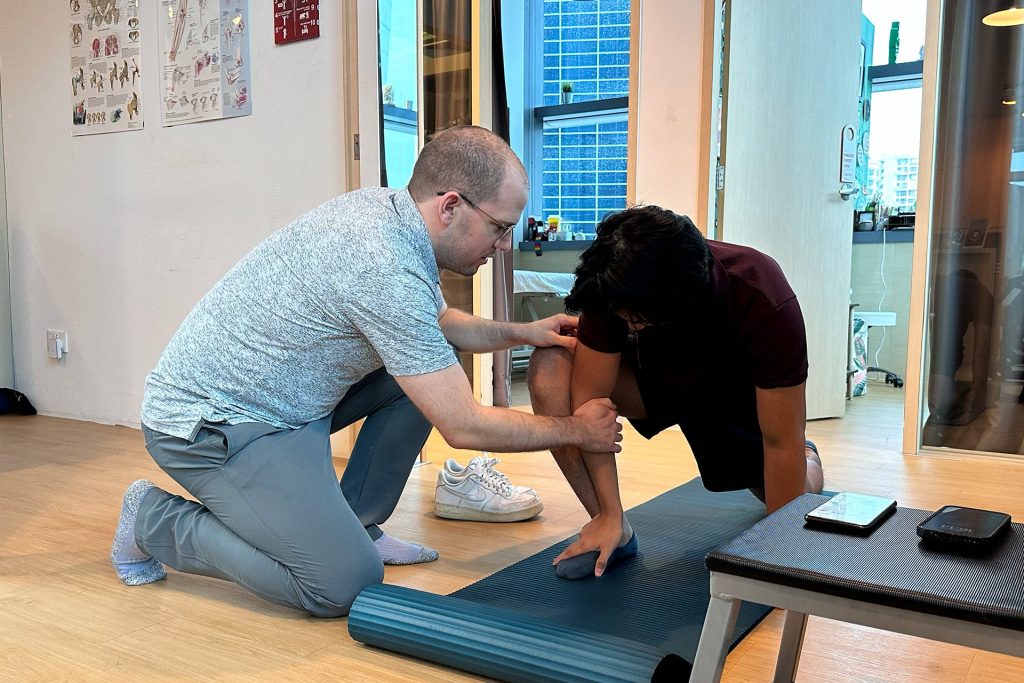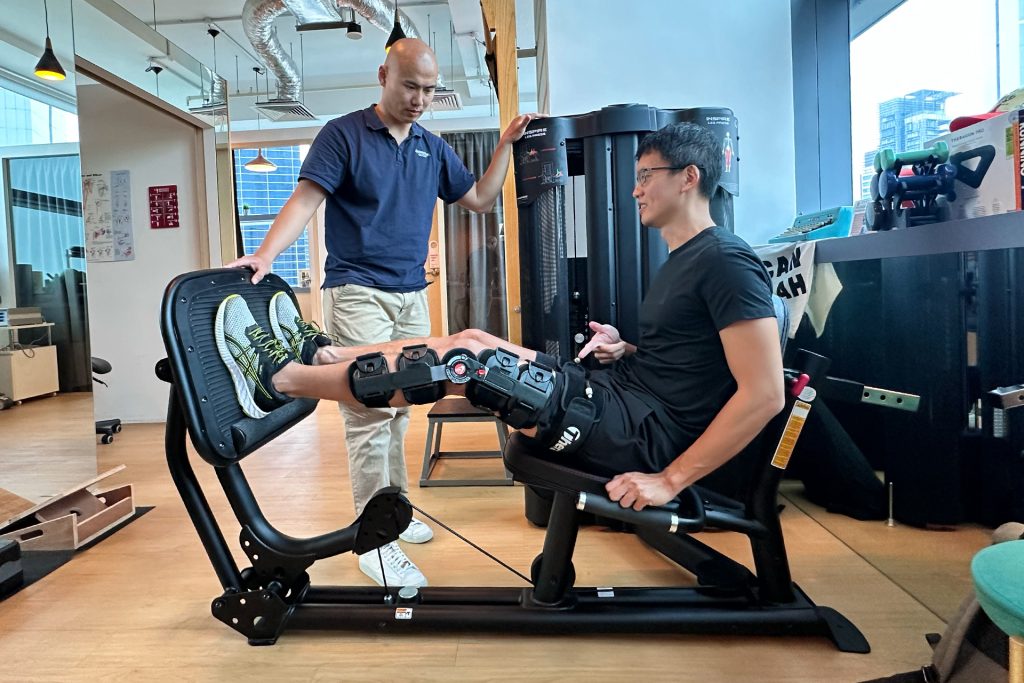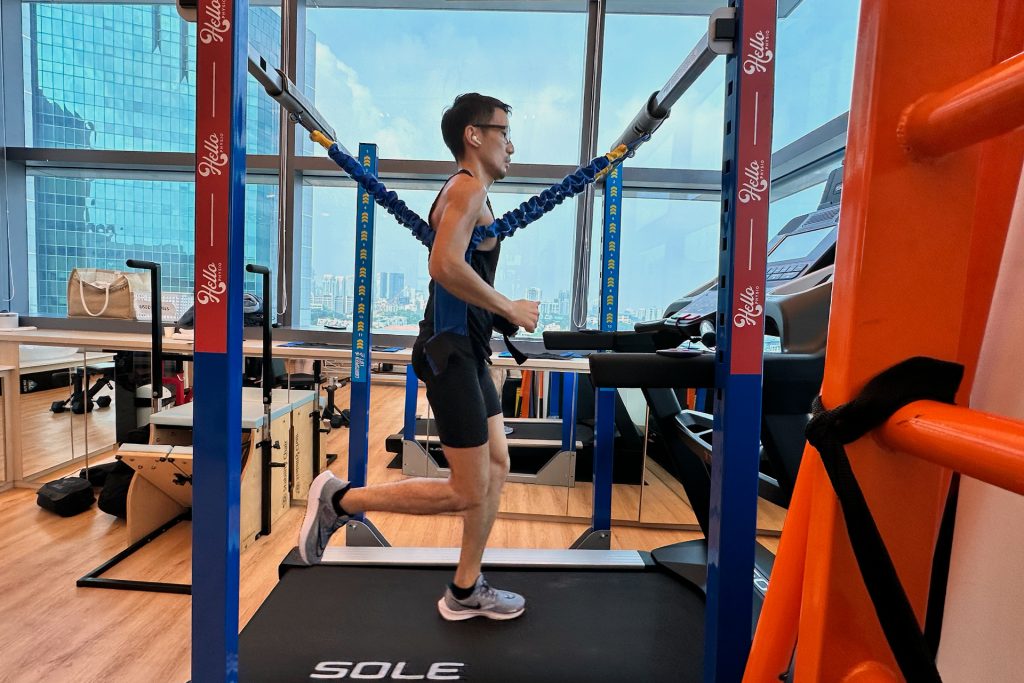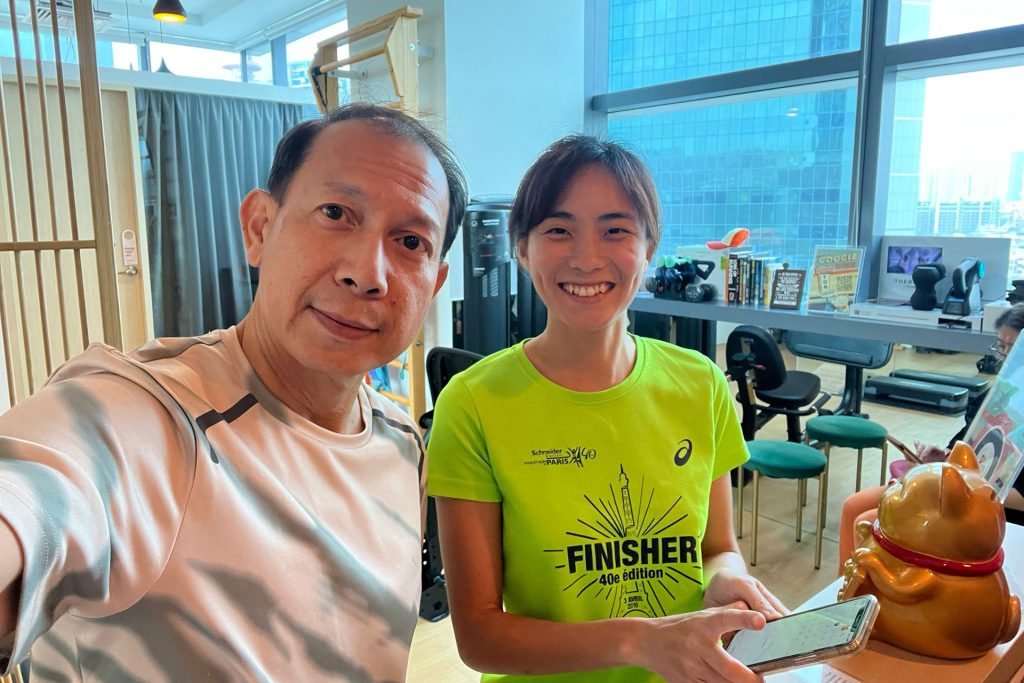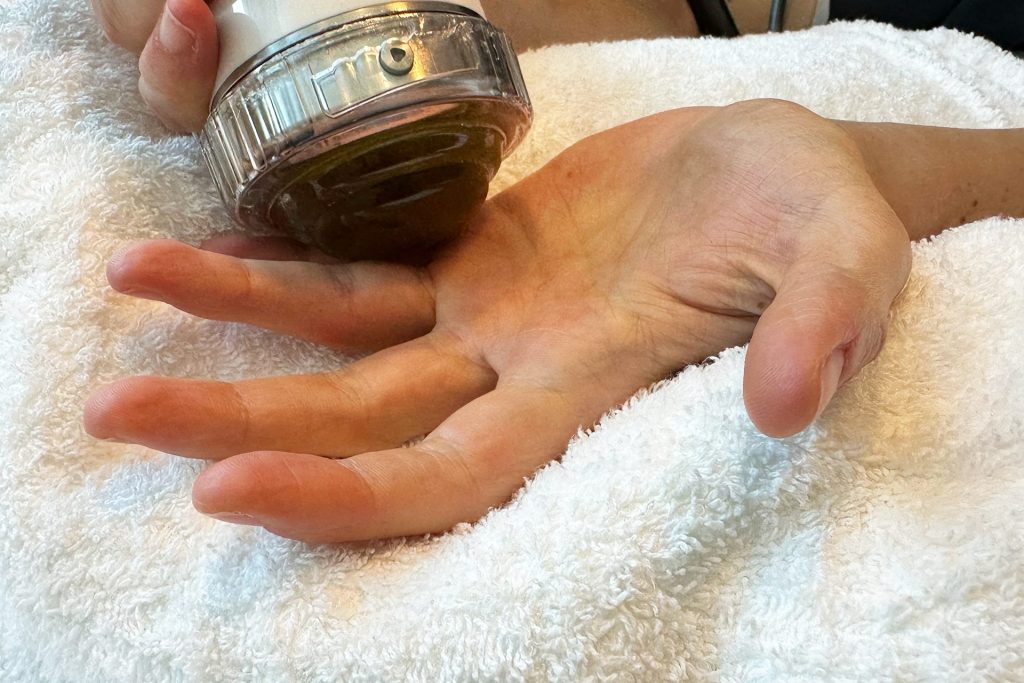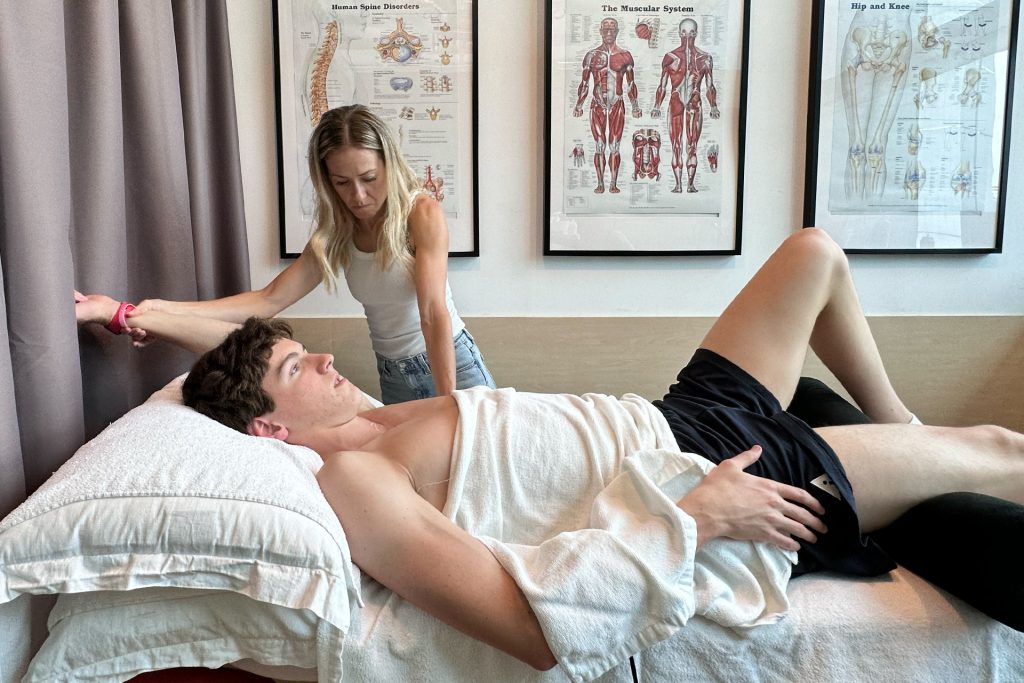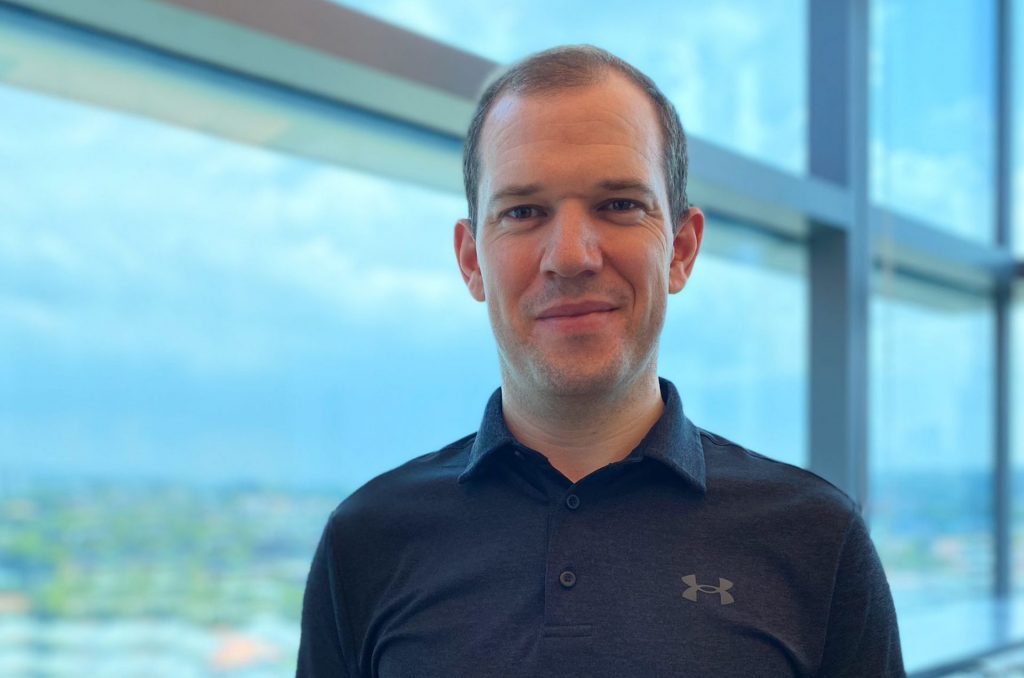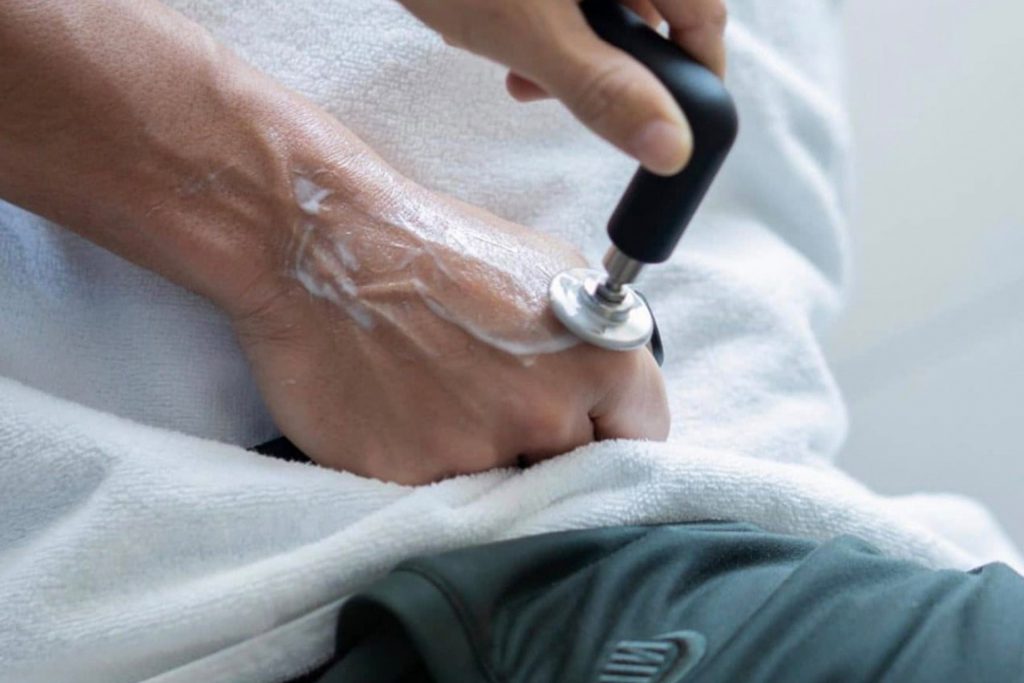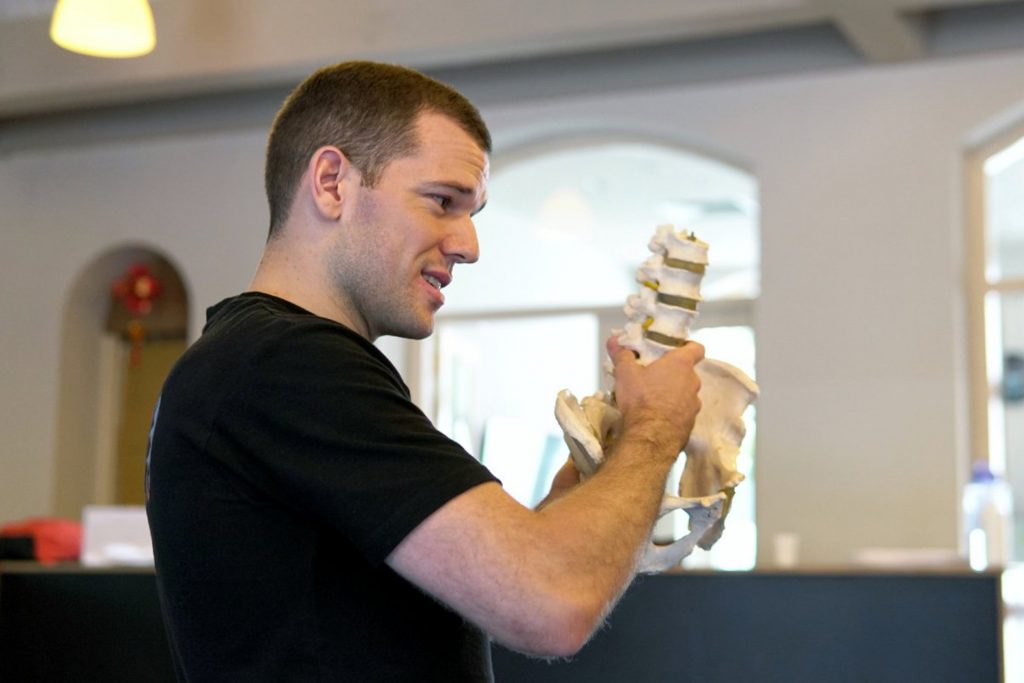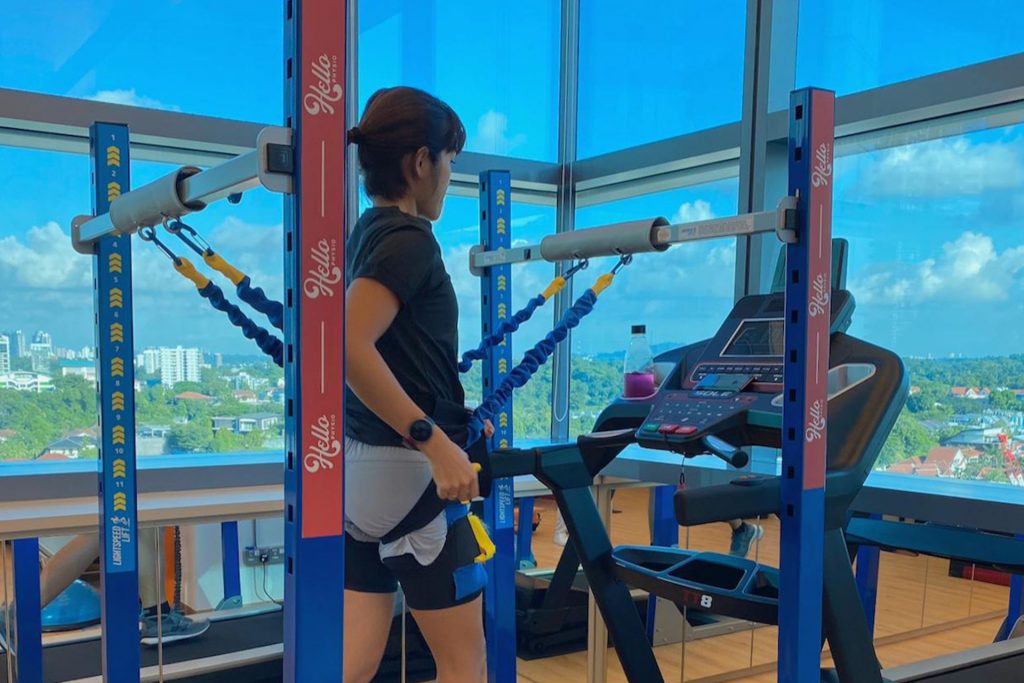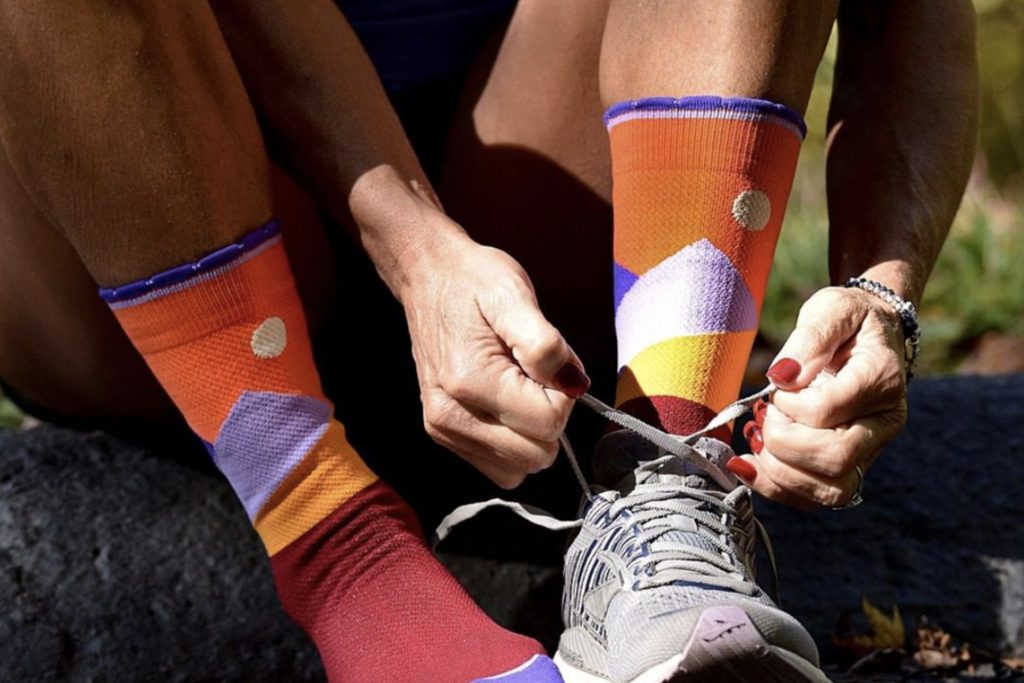Waking up with sharp heel pain when you first step out of bed is often a sign of plantar fasciitis, one of the most common causes of heel pain. It affects not only runners and athletes but also teachers, nurses and anyone who spends long hours standing. Risk factors include being over 40, female, overweight, wearing poor-quality footwear, or having abnormal foot mechanics.
Left untreated, plantar fasciitis can limit mobility and alter gait mechanics, leading to long-term issues. Fortunately, effective treatments for plantar fasciitis exist. Physiotherapy combined with advanced options such as Shockwave Therapy and INDIBA® offers proven relief by reducing pain, improving tissue healing, and restoring function. With proper treatment, most patients see significant improvement in 6 to 8 weeks. While imaging, such as X-rays, may reveal heel spurs, these are not always the direct cause of pain. Early intervention is key to recovery and preventing chronic discomfort.
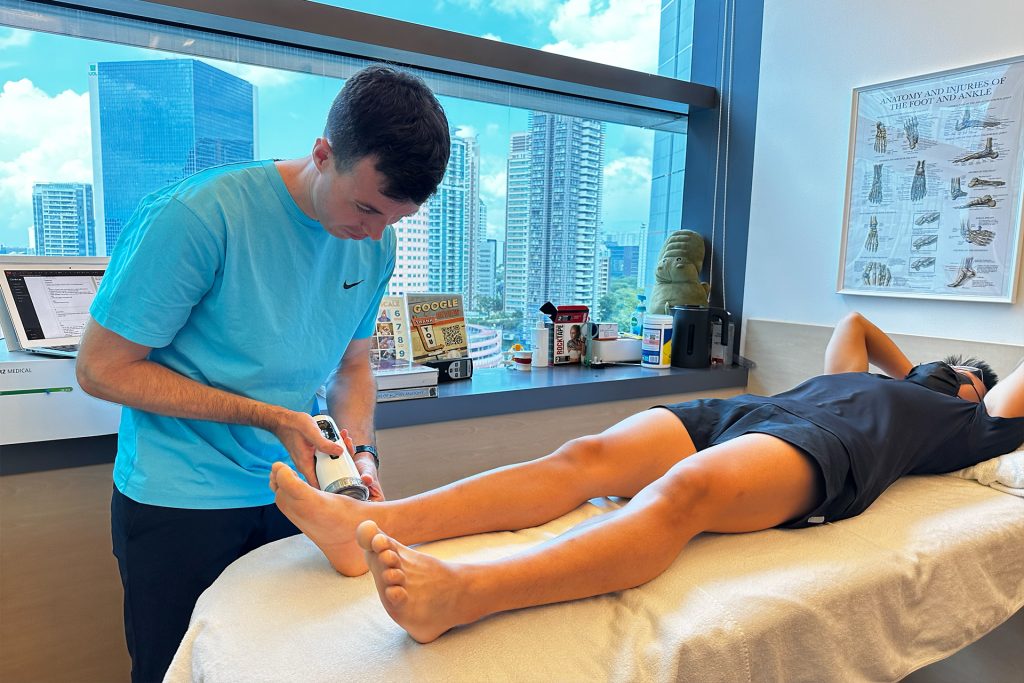
What Is Plantar Fasciitis?
Plantar fasciitis occurs when the plantar fascia, a thick band of connective tissue running from the heel bone to the toes that supports the arch of the foot and absorbs the repetitive stress of walking, running or standing, degenerates and becomes irritated. When overloaded, tiny microtears form, leading to stiffness and heel pain, most noticeable with the first steps in the morning or after extended periods of sitting.
Picture the fascia as a stretched rubber band on the verge of snapping. Each step forces it to expand and contract thousands of times a day, and because it anchors directly to the heel bone, this area is especially vulnerable to stress. Over time, these repeated strains weaken the tissue, making it more prone to inflammation, particularly at its attachment to the heel. The Achilles tendon works closely with the fascia in foot mechanics, which is why regular stretching of both can help prevent injury and ease symptoms.
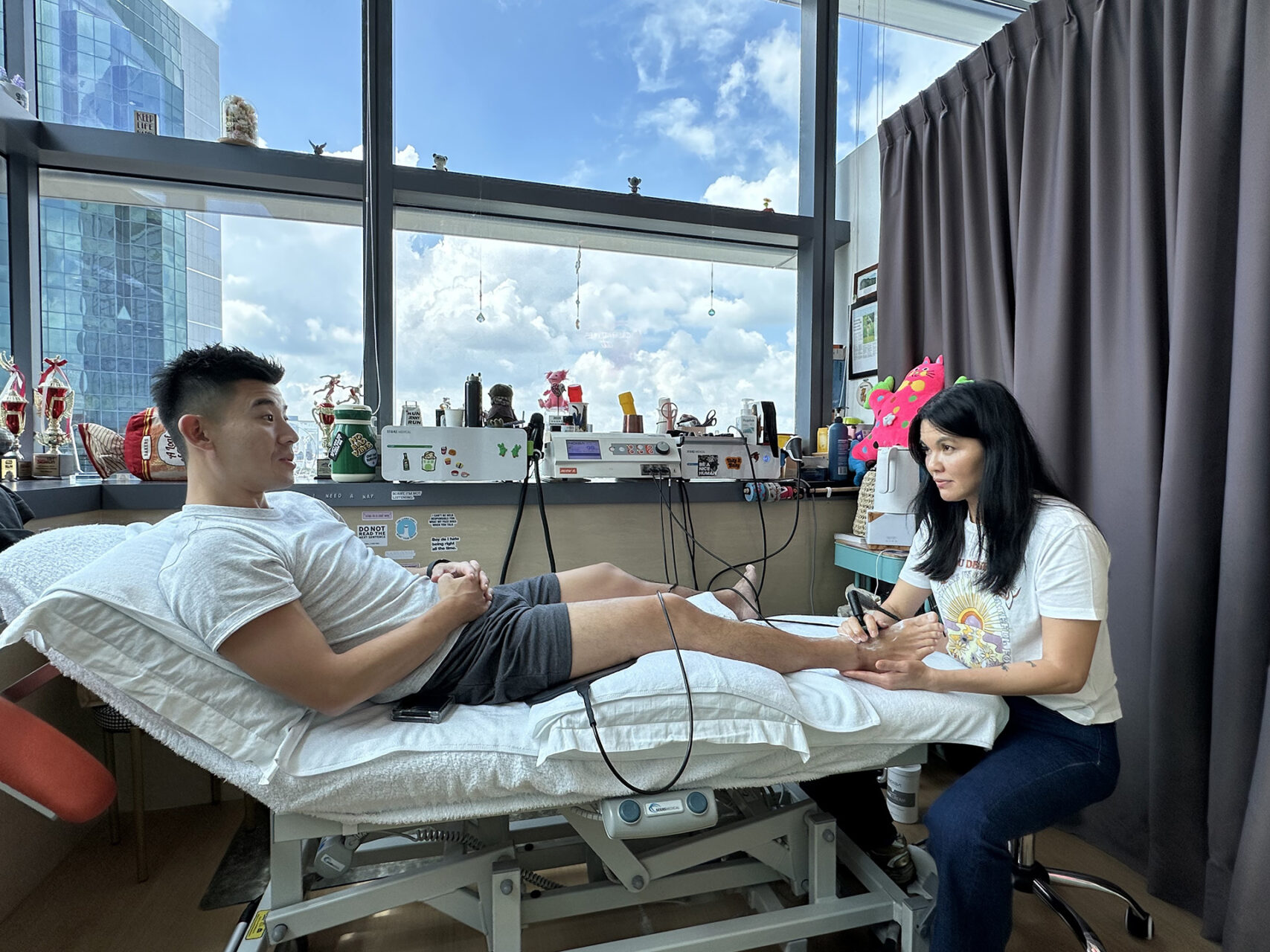
Symptoms of Plantar Fasciitis
Symptoms of plantar fasciitis include sharp heel pain, especially with the first steps in the morning or after rest, which may ease with movement but often returns after long activity.
As you move throughout the day, the pain may decrease, but it can return after prolonged periods of standing, walking or running. Some people experience discomfort in the arch of the foot, while others feel it more in the heel. The pain of plantar fasciitis can range from mild to severe and may feel like a stabbing sensation or a persistent ache on the bottom of the foot.
If you notice pain in the heel or arch of your foot that doesn’t improve after a week of rest and home care, it’s essential to consult your doctor or a healthcare professional. Early intervention can help prevent the pain from becoming chronic and allow you to return to your normal activities sooner.
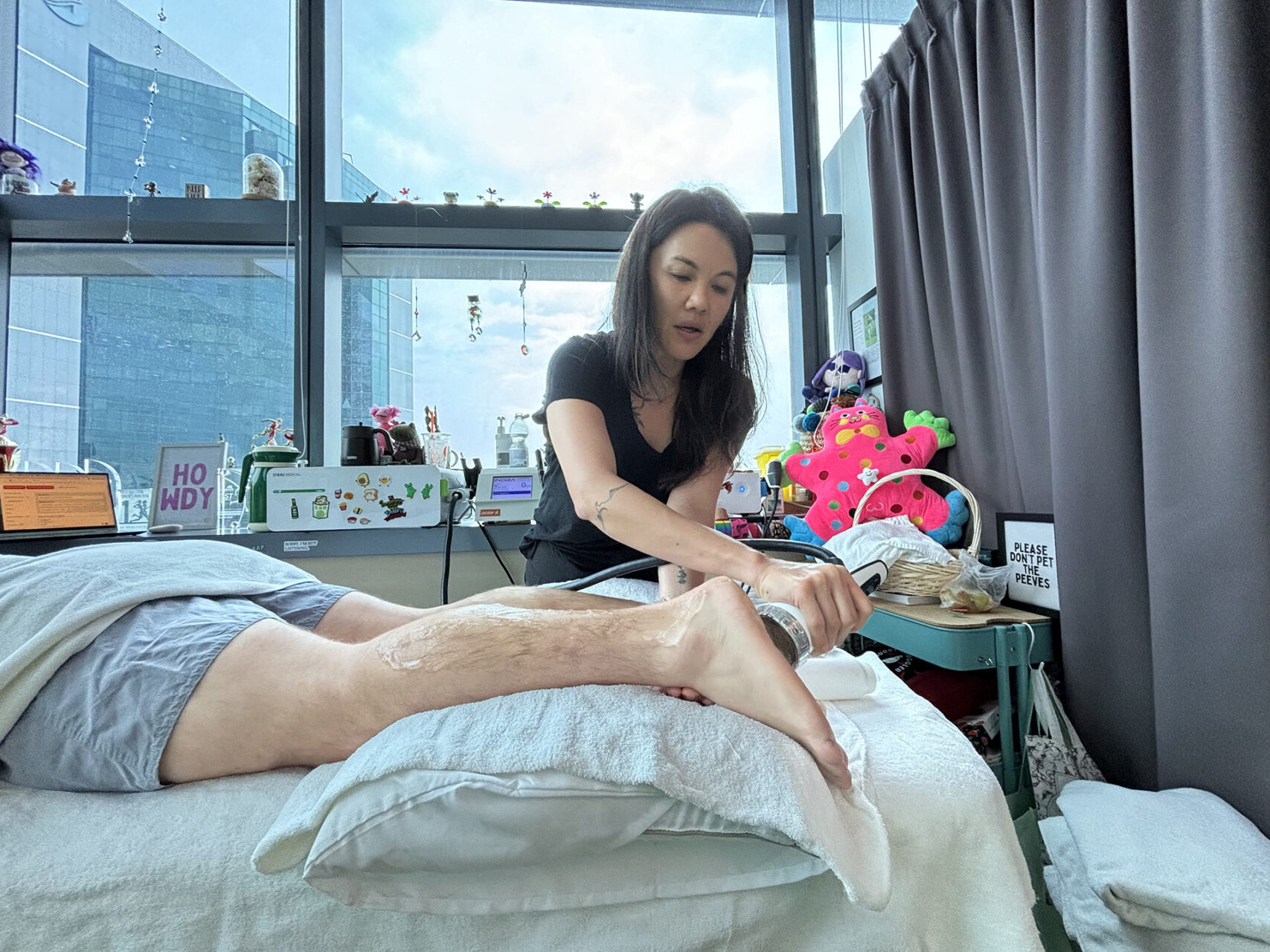
Common Causes of Plantar Fasciitis Pain
Plantar fasciitis pain is caused by repetitive strain and microtears in the plantar fascia near the heel, leading to collagen degeneration that worsens with overload and impact. Here are some common conditions that can arise from chronic plantar fasciitis if left unattended:
- Overpronation: When the heel’s outer edge first makes contact with the ground, and the foot rolls inward, flattening the arch in your feet. This creates strain on the muscles and tissues.
- Stress on the ligament: If the calf muscles are too tight and fail to support the foot.
- Obesity or sudden weight gain: For example, pregnancy can lead to heel pain from the weight the body has to compensate for carrying.
- Prolonged standing: When you bear weight on hard surfaces for most of the day.
- Repeated impact: Sports such as running can cause microtears in the heel.
- Inadequate footwear: Shoes without proper arch support or cushioning increase stress on the plantar fascia.
- Biomechanical abnormalities: Flat feet, high arches, or irregular walking patterns can contribute to excessive strain. Chronic plantar fasciitis or surgical release of the plantar fascia can compromise the foot’s stability, leading to collapse of the longitudinal arch and affecting the foot’s overall structure and function.
Regardless of the cause, most instances of plantar fasciitis typically manifest with the first step of the day. Each morning, or after a long rest, that first step becomes a painful reminder of the battle raging beneath the surface. Finding the proper plantar fasciitis treatment in Singapore can help you take back your mornings.
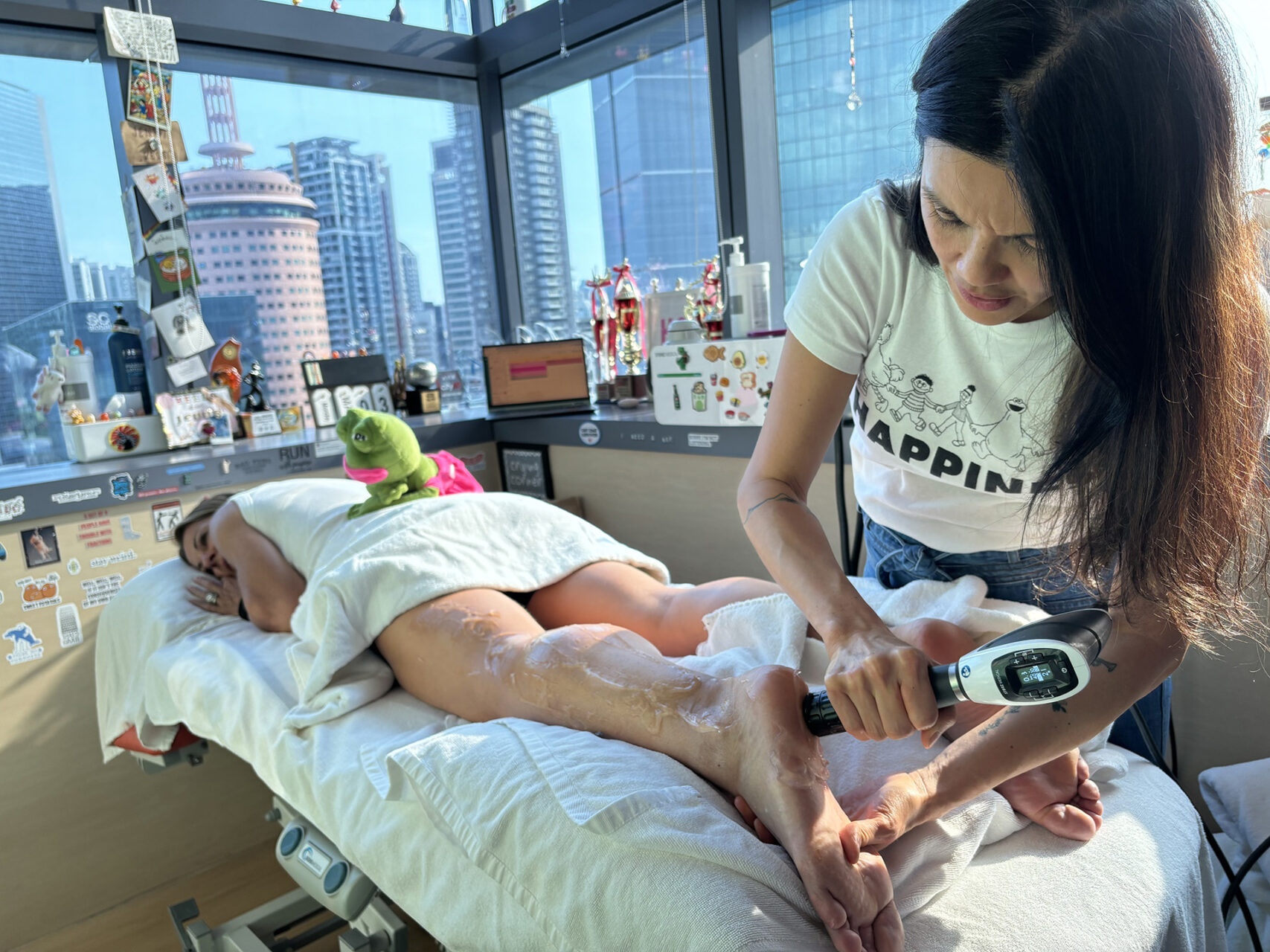
Diagnosis and Imaging Tests
Plantar fasciitis is usually diagnosed through a clinical exam where a physiotherapist reviews your symptoms, checks for heel or arch tenderness, and assesses foot mechanics. Most cases do not require imaging, but if the pain is severe, persistent, or another condition like a stress fracture or heel spur is suspected, X-rays or an MRI may be recommended. Imaging helps rule out other causes and guide treatment when standard care is not effective.
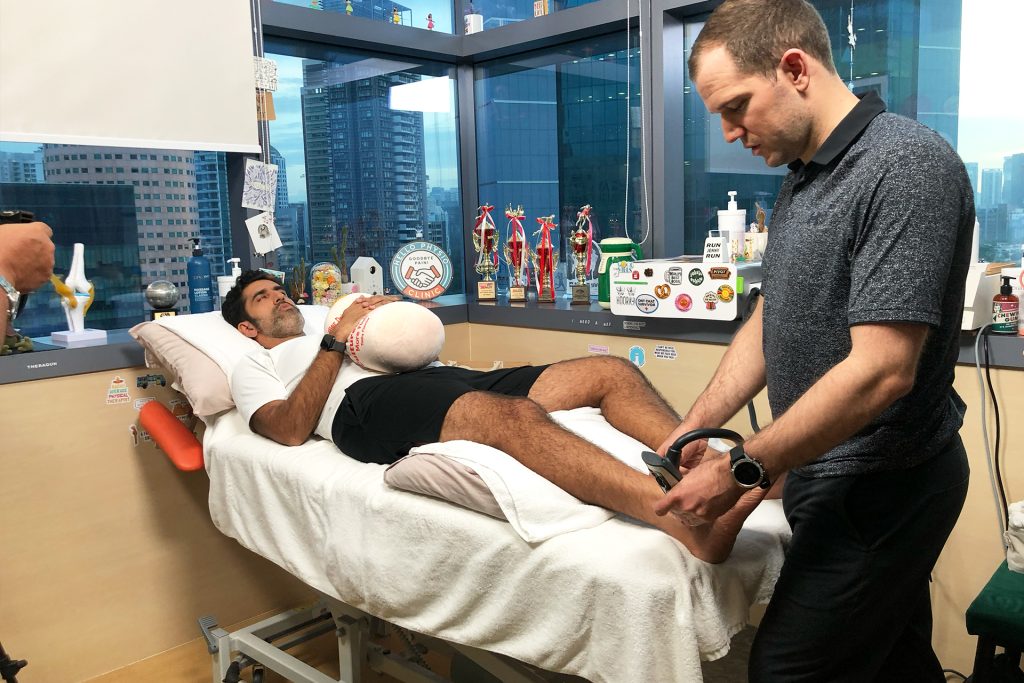
When to Seek Professional Help
While many cases of plantar fasciitis can be managed with conservative treatments, sure warning signs indicate it’s time to consult a healthcare professional. Red flags include:
- Severe pain that interferes with daily activities or prevents weight-bearing
- Pain persists longer than 2-3 weeks despite consistent home treatment
- Numbness, tingling, or fever accompanying heel pain
- Signs of infection, such as redness, warmth, or unusual swelling
- Pain that worsens progressively rather than improving with rest
Early professional intervention is crucial because untreated plantar fasciitis can lead to compensatory movement patterns that stress other parts of the body, including the knees, hips, and lower back. The sooner you address the root cause, the faster your recovery and the lower your risk of developing secondary issues.
It is essential to consult a qualified physiotherapist for the proper diagnosis and management of plantar fasciitis, as they can evaluate your symptoms, provide referrals and prescribe equipment such as night splints if needed.
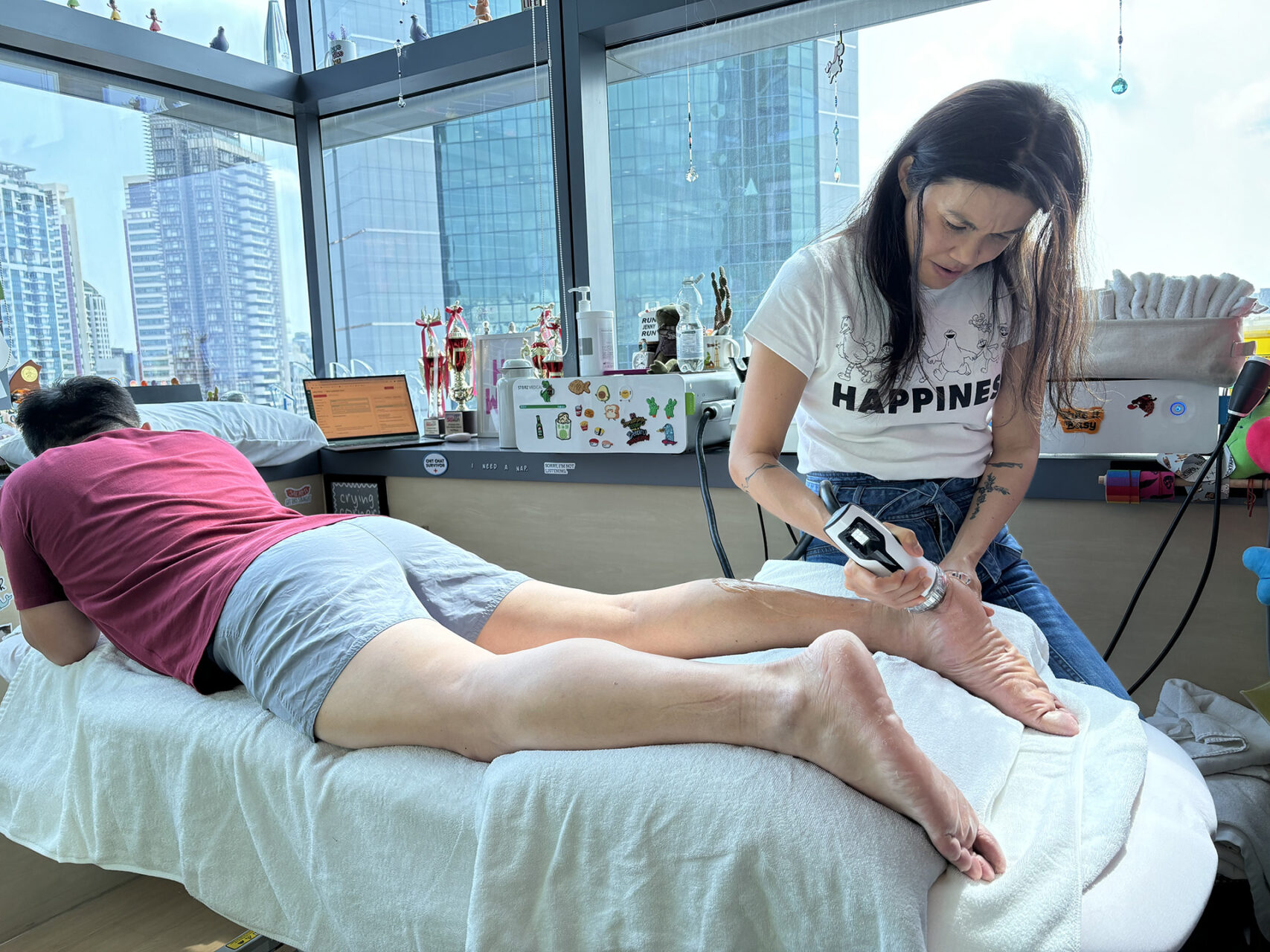
What Is the Best Treatment for Plantar Fasciitis
The best treatment for plantar fasciitis is a combination of advanced therapies like Shockwave Therapy and INDIBA, coupled with plantar fasciitis physical therapy treatments such as traditional mobilization and muscle activation techniques. These scientifically proven and personalized solutions deliver immediate pain relief and support long-term foot health.
Shockwave Therapy: Utilises targeted acoustic waves to enhance blood flow and cellular activity in the heel, promoting faster healing. It also helps break down hardened tissue and boosts collagen production, contributing to the foot’s long-term health. Treatment typically involves 3 to 5 sessions over several weeks, with many patients experiencing significant pain reduction after the first few sessions.
INDIBA: This innovative treatment utilises a specific radiofrequency to stimulate ionic exchange at the cellular level, a process essential for tissue repair. INDIBA increases tissue temperature to boost blood flow and cell activity, aiming to address the root causes of plantar fasciitis by promoting cellular health and reducing inflammation and pain.
Physical Therapy: Structured exercise programs that stretch the calves and plantar fascia form the foundation of conservative treatment. The fascia and Achilles tendon are central to foot and ankle mechanics, and keeping them flexible helps ease plantar fasciitis symptoms. A physiotherapist can design a tailored program to correct imbalances, improve mobility and strengthen supporting muscles, reducing pain and preventing future injury.
Whether you’re just starting your treatment journey, looking into plantar fasciitis treatment costs, or exploring alternatives after conventional approaches haven’t worked, HelloPhysio is here to guide you with cutting-edge solutions designed for lasting relief and healing.
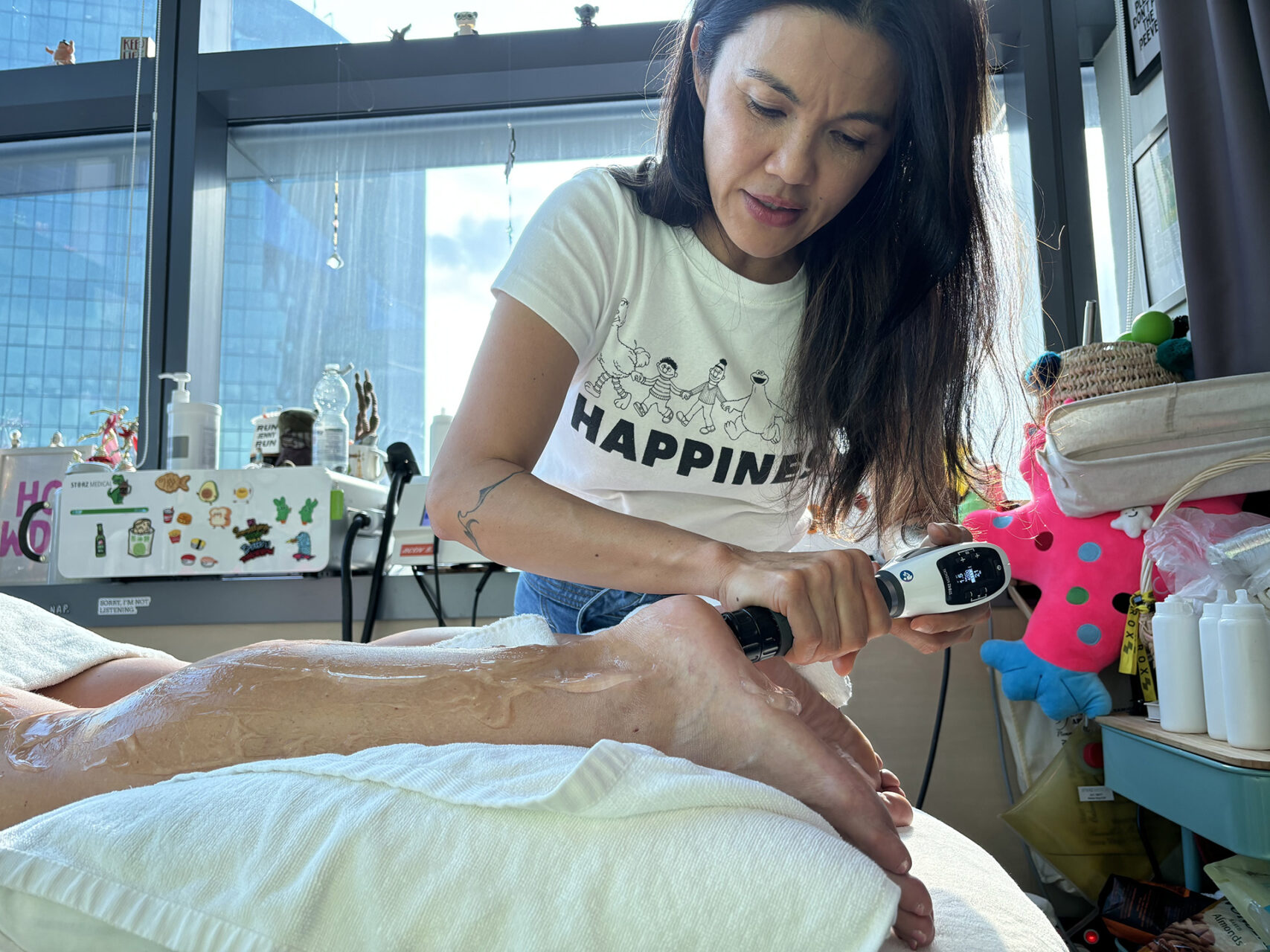
How Long Does Plantar Fasciitis Treatment Take?
Most patients experience noticeable improvement within 6 to 8 weeks of consistent treatment, although complete healing typically takes 3 to 6 months. The gradual onset of plantar fasciitis pain typically develops over several months, making patience during recovery essential.
Several factors influence your healing timeline:
- Early intervention advantage: Patients who start treatment within the first few months typically see faster results than those who delay care
- Treatment consistency: Following prescribed exercises and therapies daily accelerates recovery
- Severity of condition: Chronic cases may require more extended treatment periods
- Individual factors: Age, activity level, and overall health affect healing speed
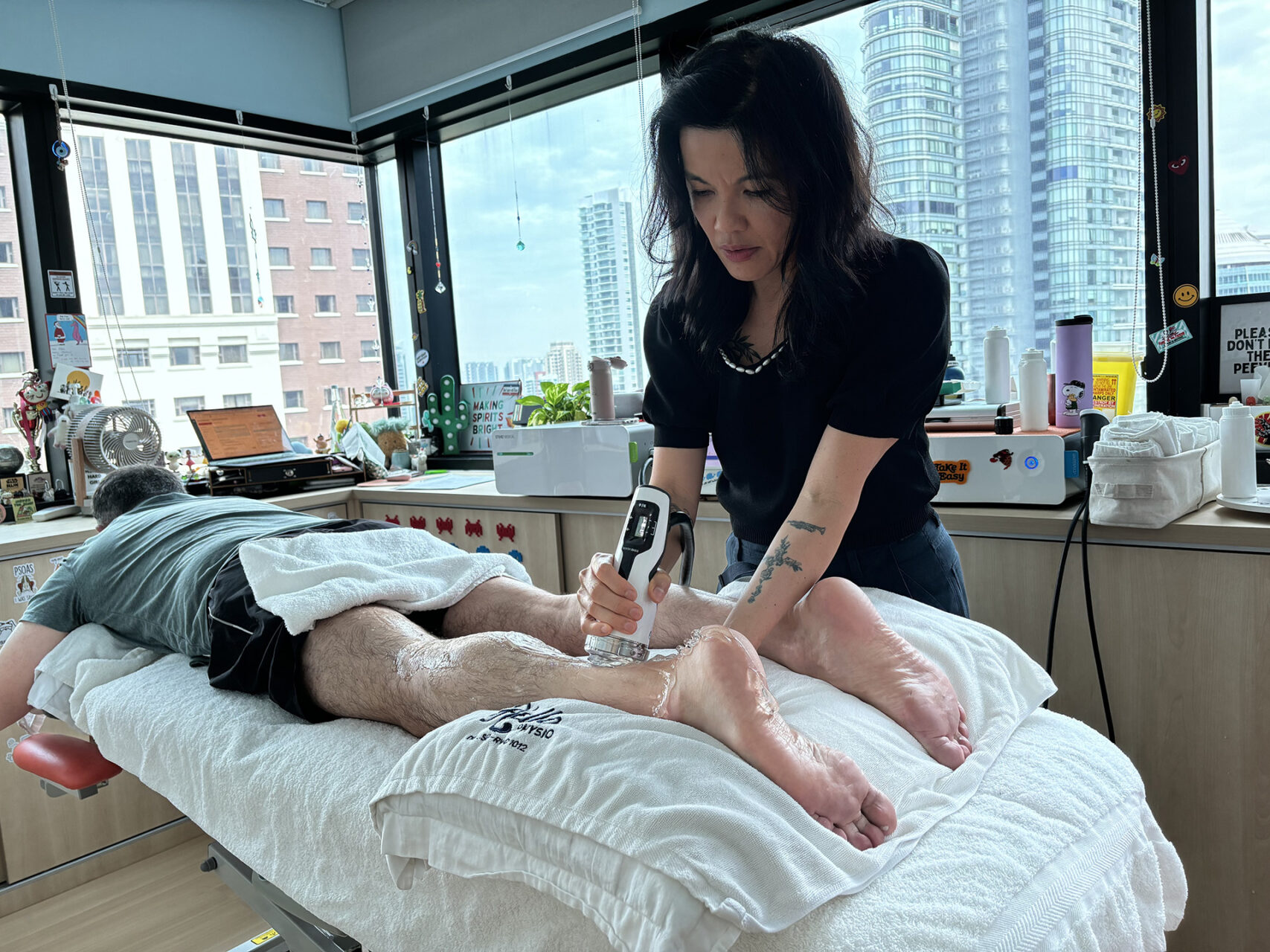
At-Home Plantar Fasciitis Treatment Options
With the right approach, you can take confident steps toward pain-free living. Some of the things you can do at home include:
1. Prioritize Proper Footwear
The right shoes are the foundation of plantar fasciitis relief. Choose footwear with cushioned heels, solid arch support and slight heel elevation. Supportive shoes can help make painful steps more comfortable, protecting your feet with every stride. Avoid walking barefoot, especially on hard surfaces, and replace worn-out shoes that no longer provide adequate support.
2. Use Orthotic Devices
Supplement your footwear with orthotic inserts. Custom orthotics or over-the-counter options offer tailored support to reduce strain on your arches, ensuring stability and comfort with every step. Well-fitted orthotics can reduce plantar fascia tension by up to 34%, making them one of the most effective conservative treatments available.
3. Night Splints for Overnight Relief
Night splints gently stretch your calf and arch while you sleep, helping to reduce morning pain and stiffness. These simple devices work while you rest, helping your first steps of the day feel lighter and pain-free. Most patients notice reduced morning pain within 1-2 weeks of consistent night splint use.
4. Incorporate Targeted Exercises
Strengthening your foot and leg muscles through targeted exercises is crucial for recovery. Regularly stretching your calves and plantar fascia can help alleviate discomfort and prevent future flare-ups.
- Calf Stretches: Stand arm’s length from a wall, place your hands against it, and step your affected foot back. Keep your heel on the ground and lean forward until you feel a stretch in your calf. Hold for 30 seconds, repeat 3 times.
- Plantar Fascia Stretches: Sit with your affected leg crossed over your other leg. Pull your toes back toward your shin until you feel a stretch along the bottom of your foot. Hold for 30 seconds, repeat 3 times.
- Tennis Ball Rolls: Roll a tennis ball or frozen water bottle under your foot for 2-3 minutes, applying gentle pressure to massage the plantar fascia.
- Toe Curls: Place a towel on the floor and use your toes to scrunch it toward you, strengthening the small muscles in your feet.
- Marble Pickups: Practice picking up marbles with your toes to improve foot strength and flexibility.
- Achilles Tendon Stretches: Tight Achilles tendons can contribute to plantar fasciitis, making stretching this area crucial for both treatment and prevention.
5. Lifestyle Adjustments
Simple changes, such as avoiding walking barefoot or wearing unsupportive flip-flops, can make a significant difference. Every choice, such as choosing cushioned shoes or limiting high-impact activities, helps reduce pain and protect your feet. Additional lifestyle modifications include:
- Weight management: Excess weight increases pressure on the plantar fascia
- Activity modification: Temporarily reduce high-impact activities like running or jumping
- Workplace ergonomics: Use anti-fatigue mats if you stand for long periods
- Gradual return to activity: When resuming sports or exercise, increase intensity gradually
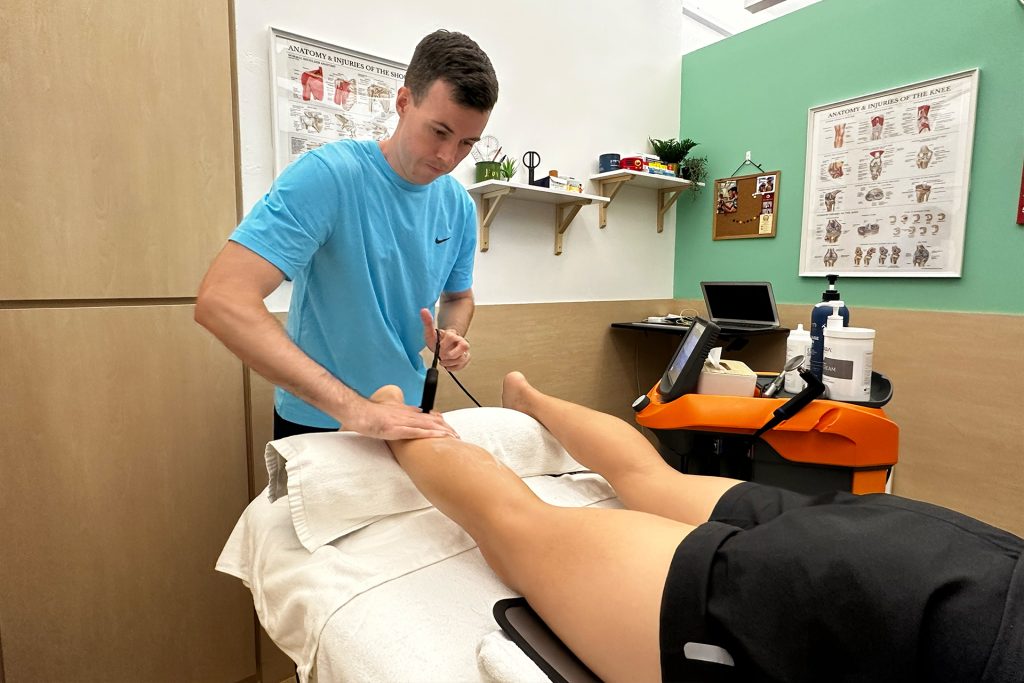
Prevention: Your Best Defense Against Recurrence
Prevention is just as important as treatment. Recognizing triggers, paying attention to early symptoms, and prioritizing supportive footwear and orthotics can help you avoid recurring pain and maintain a healthy, active lifestyle. A comprehensive prevention strategy includes:
- Proper Warm-up Techniques: Always warm up before exercise or sports activities. Spend 5-10 minutes performing gentle calf stretches and ankle circles to prepare your feet for activity.
- Weight Management: Maintaining a healthy weight reduces stress on your plantar fascia. Even a 5-10 pound weight loss can significantly decrease foot pressure and reduce the risk of recurrence.
- Workplace Modifications: If your job requires prolonged standing, consider investing in anti-fatigue mats, wearing supportive shoes, and taking regular breaks to stretch and change positions.
- Gradual Activity Progression: When returning to exercise or starting new activities, increase intensity and duration gradually. Follow the 10% rule – don’t increase your activity level by more than 10% per week.
- Early Warning Signs: Be aware of mild morning stiffness, heel tenderness after activity, or arch discomfort. Addressing these early symptoms can help prevent the development of full-blown plantar fasciitis.

Frequently Asked Questions About Plantar Fasciitis Treatment
Can plantar fasciitis heal on its own?
While mild cases may improve with rest and basic care, most cases benefit significantly from targeted treatment. Without proper intervention, plantar fasciitis often becomes chronic and more difficult to treat.
What’s the fastest way to cure plantar fasciitis?
The fastest recovery occurs when multiple treatment approaches are combined, including professional therapy, consistent home exercises, proper footwear, and lifestyle modifications. There’s no instant cure, but comprehensive treatment typically provides noticeable relief within two to three weeks.
Should I walk if I have plantar fasciitis?
Gentle walking is generally beneficial and helps maintain mobility, but avoid activities that cause sharp pain. Listen to your body and modify activities as needed during the healing process.
Can plantar fasciitis become permanent?
With appropriate treatment, plantar fasciitis rarely becomes a permanent condition. However, delayed or inadequate treatment can lead to chronic pain and compensatory problems in other parts of your body.
What shoes are best for plantar fasciitis?
Look for shoes with excellent arch support, cushioned heels, and good shock absorption. Avoid flat shoes, high heels, and worn-out footwear. Many patients benefit from athletic shoes designed for their specific foot type and gait pattern.
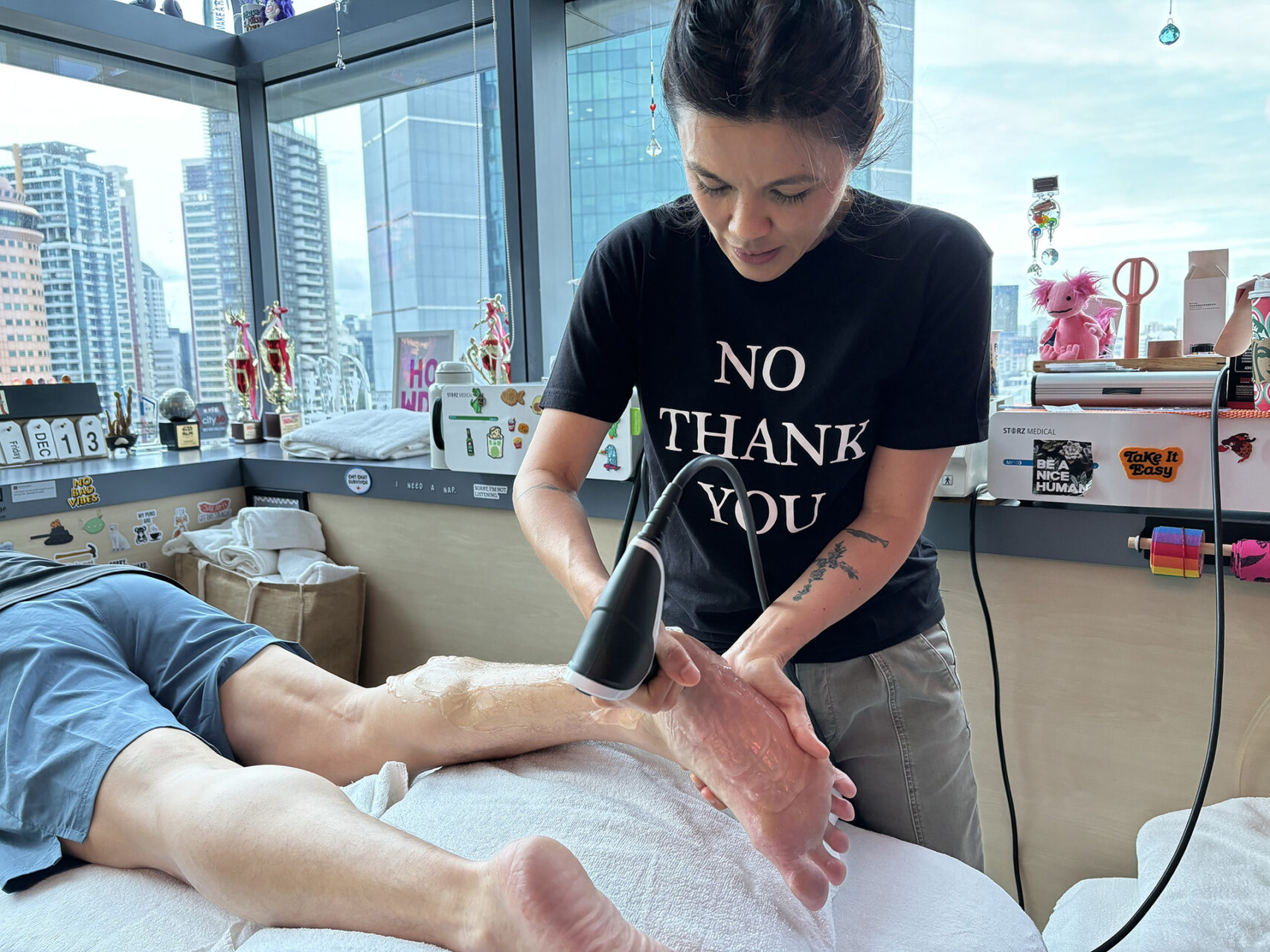
Relieve Plantar Fasciitis Pain Today
At HelloPhysio, treating plantar fasciitis begins with a personalized plan that targets the specific risk factors contributing to your pain. Our physiotherapists start with a thorough assessment of the lower limbs and biomechanics, including gait patterns, foot mechanics, muscle strength, and flexibility.
We also consider the unique demands of your daily activities, sports or training. With these insights, our expert physiotherapists develop tailored plantar fasciitis treatments in Singapore that alleviate pain while addressing the underlying causes, restoring function and promoting long-term foot health. Book your appointment today.


